#and if anyone is interested in more long analysis stuff like this
Text
okay so I watched ouef (s1 ep4) last night and I only vaguely remembered it as the episode with the lost boys and the creepy family dinner, but now that I’ve rewatched it I’m losing my mind over how much it actually sets up/foreshadows mizumono, especially thematically. considering this, it’s surprising how little this episode is talked about so I’ve decided I’m gonna unpack it myself because I honestly see it as mizumono’s necessary counterpart. it’s first half, if you will
so let’s talk about oeuf
I think part of the reason why a lot of early s1 isn’t discussed as widely as the rest of the show (especially late s2 and s3 in general) is because of the prescriptive use of genre conventions that underpin the “monster of the week” format that, upon first glance, makes s1a seem a little less interesting. it strongly follows the rules and expectations of the standard crime procedural that we’ve come to expect from a show like this: first there’s a murder, then our cast of characters go to investigate, slowly unravelling the mystery while learning some lesson along the way, until finally they catch the bad guys and the episode ends with justice prevailing, resolving the initial injustice of the crime. overall we’re left feeling satisfied, but it’s nothing to write home about
nonetheless, it is very important that nbc hannibal follows this formula in s1 because it allows it to meet audience expectations while also setting up the building blocks for its later acts, which, as we know, (mostly) abandons this scaffolding entirely. you can’t break the rules unless you know the rules, and s1 proves this by luring us in through its promise of convention. you could argue that, in its own way, s1 is the show’s own person suit
that’s not to say the “monster of the week” formula completely hides the show’s gothic side. beyond the show’s visual aesthetics (dark colours, artistic murders, etc) and the almost supernatural quality of will’s empathy, each episode/murder so far has had an underlying “fairytale-like” quality to it that’s achieved through the use of specific allusions/familiar images. first it’s will describing abigail as willy wonka’s golden ticket, then it’s the mushroom garden, then sleeping beauty wakes from her coma, and now we have peter pan and the lost boys. considering how the rest of the show plays out, especially s3 where hannibal literally describes the italy trip and his perception of life as a fairytale, this seems intentional to me. I mean, he and will literally adhere to the beauty and the beast archetype, with both fitting either role depending on what aspect of their relationship you’re looking at
that’s all to say, it’s notable that mizumono acts as the literal gateway between the familiar world of s1 and 2 and the phantasmagoric beauty of s3, stripping both its main characters and the show itself of their person suits, which isn’t as jarring as it should be due to the particular way s1 is structured
which takes us back to what I really want to talk about: ouef
the episode opens in baltimore, where will tells hannibal this:

as will speaks, we see his house, lit up and observed at a distance in the middle of nowhere, caught in the vast, misty darkness he describes. linking the house with the boat is important, since this dual image develops throughout the rest of the episode. thematically, ouef is about family, as is represented through the monster of the week: the woman kidnapping the lost boys and manipulating them into killing their families. but as we said before, this scaffolding is designed to set up character specific concepts and themes that’ll be relevant later. for now, will’s home is only a safe space for him at an observable distance — only “safe” because it looks like a boat at sea, which is a positive association for him
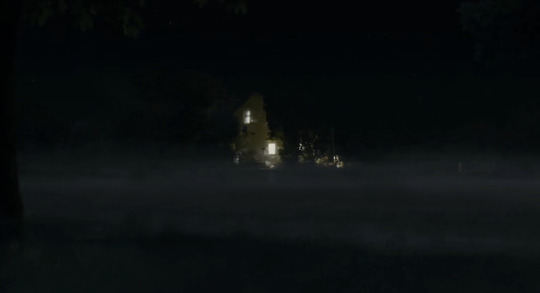
houses traditionally represent the self. it’s an image commonly linked to identity, both on a literary level and oftentimes when interpreting dreams. and of course, when talking about the house we naturally think of family. will can only appreciate the intimacy of both himself and his personal connections from an observable distance. he does not feel safe doing otherwise. it’s why his house is located so far away from the rest of society: he’s in hiding
from here, hannibal is quick to change the subject, stating that will “stood in the breathing silence of garret jacob hobbs’ home”, or, metaphorically speaking, hobbs’ identity. in episode one, will saw the truth of hobbs more so than he’s ever seen (or embraced) the truth of himself. he was not at a distance. he was not safe
then hannibal asks, “did they speak to you?”
and will responds, “with noise and clarity”
he then follows this by saying he “tried so hard to know garret jacob hobbs. to see him” beyond the police tape and dead girls and photographs, all of which he considers superficial details. this particular phrasing is significant, since it directly parallels what hannibal later tells will in mizumono after he learns of his betrayal: “I let you know me. see me.” this scene lays out the dominoes for this chain reaction, all of which results in s2’s climactic moment, by showing hannibal’s desire to be seen, even if he doesn’t fully realise it yet, and will’s desire to connect with others like himself, if they even exist. as I’ve said before, will does not think monstrosity and humanity are separate concepts
so, by wanting to see beyond hobbs’ person suit, which in of itself is a metaphor for conformity, expectations, and the false self, will set aside his own denial and discovered something very ugly about himself. he murdered hobbs in his own home and, for the briefest moment, caught a glimpse of the truth of himself. “see?” haunts will for this reason. it’s something he carries for the rest of his arc
it’s important that this all happened in the kitchen, but I’ll get to that later
but returning to the scene. hannibal asks will how he felt seeing marissa, the girl hannibal killed last episode. there’s an unspoken question here: did you try hard to get to know me too? did you know me? see me? would I ever allow you to do so? under the copycat guise, and the person suit, is knowing me even possible? as we learn in mizumono, the answer is yes
will says he feels guilty and I don’t think he’s lying here the same way he lied when he told abigail murder is the ugliest thing in the world last episode. there’s a difference between feeling guilt and feeling remorse. he thinks he caused marissa’s death, and he feels guilty because he knows he isn’t feeling (or reacting) the way he should be. killing hobbs felt good, remember? he saw hobbs, and in turn himself, with “noise and clarity” and had a moment of chilling self awareness he can’t shake. this is what he feels guilty about. it’s not about “not saving her” it’s about the threat of his self-destructive nature burning everything around him, which is what he fears. he feels monstrous inside, due to his own sense of vindication and inclination towards righteous violence
for the rest of this scene, I’m going to pick apart the dialogue in a kind of skeleton structure so we can take what information we need from what they say. their conversation goes as follows:
“sometimes I felt like we were doing the same things at different times of day. like I was eating or showering or sleeping at the same time he was.”
→ will feels like he’s doing the same things hobbs was (showering/sleeping/eating) even after he was dead because he’s now sensing hannibal, the copycat. or rather, his own copycat/foil. they’re already connected and they already feel the same (he feels like he killed marissa even though hannibal killed marissa)
“even after he was dead?” / “even after he was dead.”
→ so it’s hannibal he’s connecting to now, even subconsciously
“like you were becoming him?”
→ the introduction of the “becoming” motif which, as we all know, is a central theme and another reference to their foil dynamic (hannibal has already said he and will are the same). note hannibal’s tone when he says this: he’s speaking quicker, unable to stop questioning. there’s another conversation happening just below the surface of this one. he’s curious about will and his ability to connect, which was established earlier in episode 2
“I know who I am. I’m not garret jacob hobbs”
→ links back to the first episode where will, out of his own free will, chooses to shoot hobbs. remember that in the opening scene of that same episode he himself tells his students that, according to his own worldview, by understanding the murder, we understand the man. this isn’t a matter of confusing his identity with that of a killer: will knows exactly who he is, and that’s what scares him. he’d rather stay in denial
it’s also noteworthy that will’s refusal to be seen as hobbs, or a copycat of him, mirrors hannibal’s refusal to be associated with him too, as we saw in episode three when he tells abigail “I am nothing like your dad.” it implies that reading either of these characters as a mirror of someone else (other than each other, of course) would be a misstep. for both will and hannibal, hobbs is just another layer of the person suit. something that’s brutally stripped in mizumono, as I said before
we learn all this in one scene alone. like I said, this episode is complex and packed. the rest of the episode simply expands on the concepts introduced in this one conversation. I won’t go into every scene because this post would turn into an academic paper, but I do want to spend time dissecting a few key scenes which I feel directly link back to mizumono specifically and highlight why this episode is so important: the family dinner scene, hannibal breaking into will’s house, will’s therapy sessions with hannibal, and hannibal and abigail making breakfast together
how will analyses the family dinner, as well as what we learn from this scene, adds to our understanding of how these characters interpret family as a whole. after all, this episode is about “the lost boys” which, to me at least, will and hannibal both are. it’s their lack of real connection that causes them to treat abigail in the idealised way they do, similar to how the woman tries to make her own found family with the kidnapped boys (although this parallel better fits hannibal than will)
within his reconstruction of the crime scene, will sits at the head of the table, saying he’s “brought his family to this home invasion.” of course he’s impersonating the killer here, but this use of the home again (and family) is enough to pay attention to
power and control is also brought up in this scene. will says he controls the turners with “threats of violence. threats that turn to action” which is how hannibal operates (although more psychologically considering his demeanour, he doesn’t seem threatening at first and rarely loses his cool) but he can’t control people that way, least of all will. in the end threats of violence don’t even work, because the more worked up you get the less in control you actually are
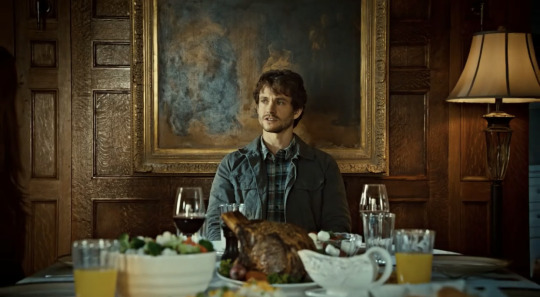
will then shoots mrs turner, who, as we later learn, forgives the act since she loves her son. forgiveness (and acceptance) being synonymous with love literally underpins the conflict of s3, which is triggered by hannibal asking will if he’ll forgive him for murdering abigail in mizumono, but it’s first shown here, of all episodes, in the story’s set up. because of this, hannibal killing abigail and stabbing will recalls this episode, perhaps more as an echo than a direct link, but is strengthened nonetheless by this subtle build. added to this, it’s notable that the threat of violence here is also due to a type of betrayal (“family dinner, I wasn’t invited”) but the lost boy sits at the head of the table anyway, where he belongs, much like hannibal does, both at the end of this episode and as the “paternal” father figure throughout most of the show
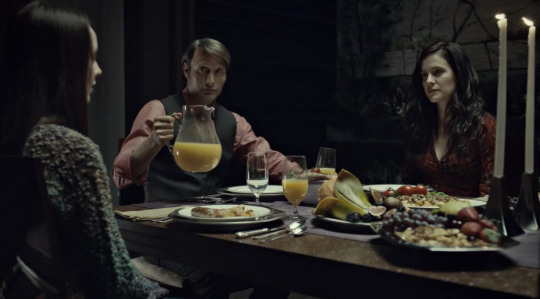
as will says, this whole sequence portrays family values. twisted ones, but values nonetheless. it’s why I’m more inclined to connect this episode to the s2 finale than I am the s1 finale (although it’s still relevant) because this episode is so strictly about family. mizumono is the same but in reversal: the ideal family hannibal dreams and tries to take control of, since he had no control of his own as a boy, is shattered before his eyes
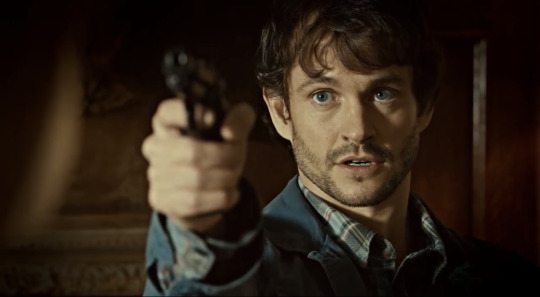
the other largely significant moment in this episode is when hannibal breaks into will’s house and pierces his thumb on the hook, tying the fishing/boat imagery back to the house again and foreshadowing will as the “lure” (his s2 persona)
what’s important about this scene is that hannibal enters will’s world (his isolated identity) to plant the evidence that’ll later frame him for all the s1 murders, leaving traces of himself on will so that, for a moment, will too becomes the copycat. again, not the exact truth of him or his nature, but a fragmented replica. inauthentic. fake. another layer of the person suit, except this time it’s hannibal’s forced on will
but what’s interesting is that hannibal also gets caught in will’s web. there’s a lot of focus on the hook specifically, and the camera lingers on the feathers, which hannibal takes the time to touch and look at, until finally, he pricks his thumb and draws blood
the irony is that in this moment, before the game even really begins, hannibal loses. he’s already hooked himself. we saw hints of this in the first scene of this episode, how his fascination with will is unlike any other attachment, or lack of attachment, he has, and it encapsulates the whole reason for his downfall: his attachment and obsession. it’s beyond his control (“you cannot control with respect to whom you fall in love”) and humanises him in darkly twisted way. he cannot control his feelings, and he doesn’t know what to do with this
his fate is sealed in this episode, but he doesn’t realise it until mizumono

again, the boat imagery is another interesting thing to note. fishing/boats/anchors are all introduced in this episode as mild, safe things (seeing the house as a boat makes will feels safe, wanting to teach abigail how to fish, hannibal saying will needs an anchor, will and his dad at the boatyard, etc) but fishing has an insidious side, too. one hannibal isn’t aware of. it has a meek mask, and in its own way, acts as another type of security. does will feel safe within his own sense of control, too? that’s the whole point of the person suit, isn’t it? it’s an important question, because the fallout is explored in mizumono. like I’ve said all throughout this analysis: everything here is being set up for a single climactic moment
will also sails to florence later in a boat he builds. he returns to hannibal’s home in s3, sitting in the kitchen with abigail’s ghost, but it isn’t home if hannibal isn’t there, so he sails to find him. I hate to say it, but will’s insane little sailing trip to italy is actually symbolic too if you interpret hannibal as will’s home, and by going to find him will, in turn, is also going home
the scene ends with hannibal sucking the blood from his thumb, before we transition to the blood streaked family portrait, opening the next scene. having the frame of hannibal bleeding being immediately followed by the bloody family portrait seems deliberate to me, since, as we know, he kills abigail later and destroys their “family” because will “makes him bleed”. again, tying the events of mizumono back to the family values introduced in this episode
also, in the script the sound hannibal makes when he sucks the blood from his thumb is described as “not unlike a quick kiss” which is an odd way to phrase it within the literal context of this scene, but makes a lot of sense when you consider what it means symbolically. it’s a small detail, but it recontextualises will “luring” him in as a romantic act, as well as a romantic betrayal


continuing on, what family means to hannibal and his desire to both connect with will and manipulate abigail are both interweaved as the episode progresses. hannibal says that “children transport us to our childhoods”, reframes the idea that will’s family, who will jokingly refers to as a pack of strays, also includes abigail (and without saying it, himself) and that the woman who’s kidnapping the lost boys is engaging in a “perversion” of motherhood. all these things evidently reflect hannibal himself, and the specific trauma he experienced losing his parents and, more to the point, his younger sister. we don’t learn the specifics of this backstory until much later on in the story, but his behaviours (and the trajectory of his character arc) are influenced by it regardless
in contrast, will doesn’t seem all that interested in the concept. he sees family as an “ill fitting suit” (yet another reference to the person suit) and it’s an entirely foreign concept to him (it’s foreign to hannibal too, since they’re the same, but I digress). still, he tries to connect to abigail anyway, but this isn’t motivated by a want for authentic family or someone who understands him, but rather an ideal. will doesn’t want to see the truth of himself, it scares him. he doesn’t want to see the truth of abigail, either. he doesn’t want to see her as her father’s lure (again, fishing imagery) but as something innocent and divorced from what he knows of himself. he ironically buys her fishing gear in this episode (although he never gives it to her) in an attempt to associate her with the same meek mask we discussed earlier. but as we know, this “safety” too has layers
buying abigail a gift also mirrors what hannibal says to will in mizumono: “I gave you a rare gift, but you didn’t want it.” the rare gift is family, which is given value when will says “I can’t give them back what they just gave away” in relation to the lost boys and their dead mothers. it’s again another part of the family values introduced in this episode: family is a rare gift, but it’s not something you can force, which both hannibal and will try to do with abigail (like the mother tries to do with the lost boys)

the “I can’t give them back what they gave away” is particularly important, since it implies permanency and an inability to reverse the action. the gift of family and connection is only rare because once it’s taken from you you can’t have it back; you can’t reverse time; you can’t take back control
this is the crux of hannibal’s entire arc. the belief that he is in control of his life, since, in his mind, he’s godlike and exists beyond human folly and attachment, underpins every single one of his actions leading up to mizumono. for this reason, it’s significant that the teacups are introduced in this episode as a means (and symbolic prop) to control abigail. they are later related back to time but this is meant to be a symbol of hannibal’s power. he directly says that he wants to give abigail her ‘power back’ earlier in the episode, but he’s really just empowering himself. he projects his attachment to mischa onto her, something he pretends doesn’t affect him and he is above of (his approach to dealing with trauma is clear through his interactions with abigail — he thinks she shouldn’t be immersed in the tragedy of the past and should just ‘move on’)

in truth, hannibal wants to recreate the moment of tragedy (both his tragedy and abigail’s tragedy) in order to reverse time and have the perfect family, despite being incapable of this. he’s trying to escape how his trauma makes him feel powerless by attempting to take power back, no matter how futile it is
he attempts to do this here, in his home, by making them breakfast, since in his mind by feeding abigail the same (and last) meal she had with her family, he is in turn engineering a kind of ‘rebirth’ for her. he reassures that although this was the last meal she had with her family, it’ll be the first with him, and tries to take away her bad memories by replacing them with positive associations. the reversal of time is even clear in how he makes breakfast for dinner, flipping literal time on its head for his amusement
for the audience, in this scene we learn he’s a more skilled manipulator than the woman who took the lost boys, since he’s forcing this “blur” between abigail’s father and himself through the use of psychedelics and fostering dependency. he wants to replace hobbs without necessarily becoming him. again, he’s his copycat, not his replica
the fact that this all takes place in the kitchen is also important. it’s the same place hannibal will later kill her, proving he can’t reverse time and he isn’t in control, and that she was never reborn, and he was never her father. and returning to the beginning of this analysis (I said I’d come back to this) will also killed hobbs in his own kitchen, where he finally sees the truth of himself. in mizumono, a reversal occurs: hannibal is now confronted with the truth of himself and, like will, accidentally finds something very ugly by exposing himself
the episode ends with will separated from the ‘family’ and resting with his dogs, similar to how mizumono ends with will lying in his own blood, alone. in summary, oeuf quietly introduces and foreshadows key plot, character, and thematic elements through the conventions of the crime genre, and it’s fascinating to me how many links can be made between this episode and the bloodbath in mizumono
even down to the episode title: the newly formed egg and all the consequences that are to follow its hatching
#I’m feeling so insane guys#can anyone hear me#each meta is longer than the last LMAO#I wrote a whole damn essay but it was worth it#this episode is such a gem like *screams into the abyss*#this was basically the serious analysis side of the notes I took#alongside the meme ones I’ve been sharing recently <3#the duality of man#anyway I’ll keep unpacking episodes as I go along if I get brainrot this intense again 👍#and if anyone is interested in more long analysis stuff like this#hannibal#nbc hannibal#will graham#abigail hobbs#hannigram#hannibal meta#long post#ghost speaks
193 notes
·
View notes
Text
SBG GANG MENTAL ANALYSIS
yup, him for part two. funny thing despite Aiden being my favourite character I'm most excited for the other three posts I'll make, especially the last one. there's a lot to unpack here so
also im writing this with a migraine pls read it-
Part 2: Aiden Clark
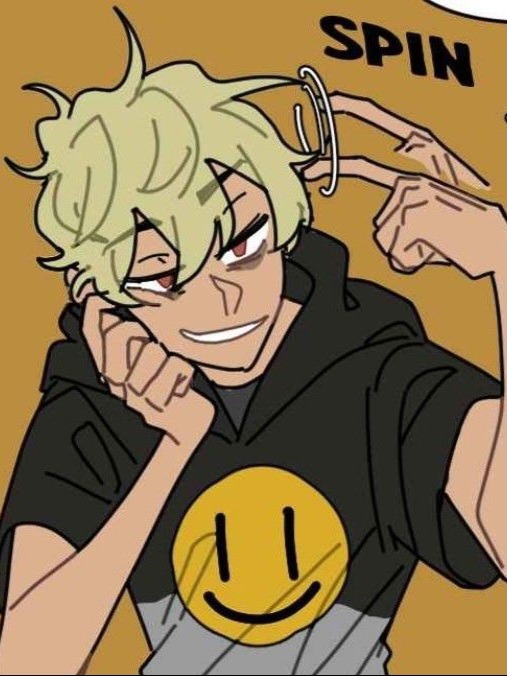
ah, yes. the obviously-mentally-ill from the start fan favourite Aiden Clark. let's go.
first, I want to start with something I find really important about his character, what makes him heavily mischaracterized in the fandom. the 'psychopath' cliche.
the terms 'psychopath', 'insane' and 'unstable' are often confused with each other due to media stereotypes, such as Aiden here. one, he is not a psychopath. psychopath literally means a self-centered person who lacks sympathy, affection and care; making them far from most other characters in their franchise. their lack of sympathy/empathy often makes them criminalized, here
disturbing content warning, for an example of a psychopath.
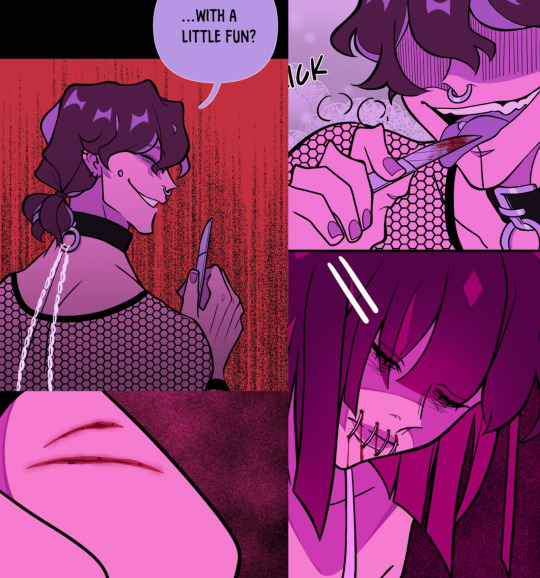
let's take Gressil from Homesick for example since a lot of SBG readers also read Homesick. so, here, Gressil is a perfect example of an actual psychopath. his lack of empathy makes him torment others, he's very self-centered. and when asked why he's doing this? he says he was bored. let's look at Aiden here. what does Aiden do when bored? probably dumb ideas or annoy Tyler. not torturing people for fun. Aiden is just a boy who likes thrills, but he has a sense of empathy, care and justice.
you wanna see a psychopathic Aiden?? the canvas is it

(our local Logan hater is publishing the canvas eps go checc beachy out)
but that's him, not our Aiden. canvas does not equal originals y'all
alright, now since we got that cleared out!! firstly, ADHD.
I think everyone in the fandom is already aware that Aiden is ADHD but I'm still going to talk about it just like Ashlyn's autism. Red has also said that she wrote Aiden with ADHD in mind but hadn't canonically confirmed anyone as neurodivergent. let's start with the main symptoms of ADHD, also known as Attention Decifit and Hyperactivity Disorder.
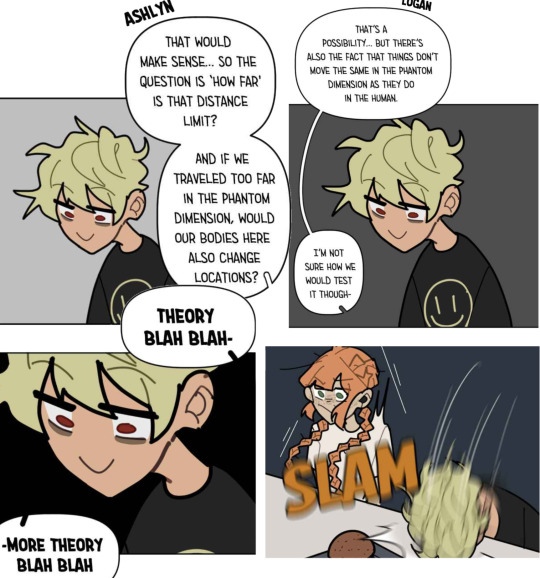
I know about 5 different ADHD people myself and did some research, it probably won't be extremely accurate since I'm not ADHD myself, but I'll try to do whatever I can. first with the AD part, Attention Decifit.
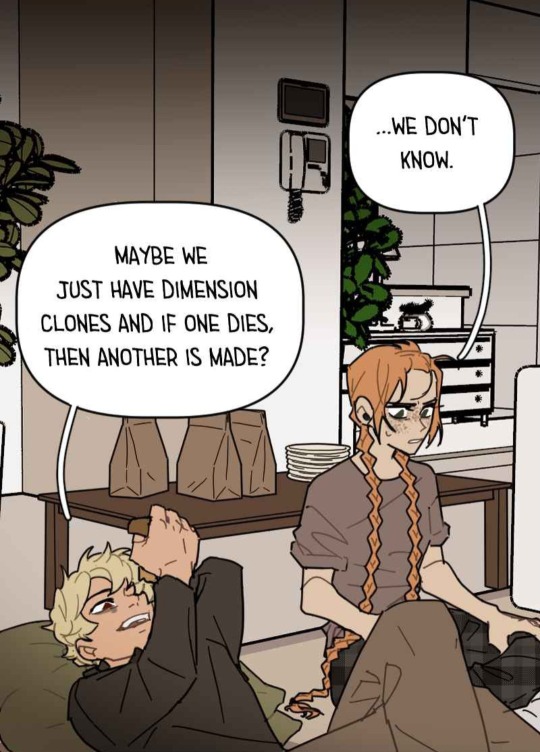
now as seen, he doesn't exactly have any problems with theorizing itself. but the problem is that his attention just goes away easily.
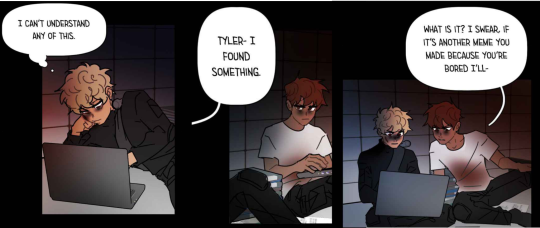
i mean cmon bro was making memes on the job
he tries to do work, but can't. he has a low attention span which makes him not able to concentrate. he can't keep it up for long, he'll get distracted or bored too easily about things that doesn't interest in specially.
it's just distracting. what his attention is on constantly changes, there's more to that after the ADHD part but we're here for now.
the hyperactivity... it's a lot more apparent. but I should explain the insane-unstable thing before that.
insane means that someone's mental health is not in an okay situation, where it prevents the person from thinking normally, acting rationally, very often found together with delusions. the person is seriously mentally ill where it might count as a disability.
unstable, however, where someone is prone to psychiatric problems, has moodswings etc. they're not exactly the most sane person, but they aren't insane either. Aiden here, obviously falls on the unstable side. maybe just a little bit insane if you squint. this will be brought up later too, but it mixed well with his hyperactivity too.
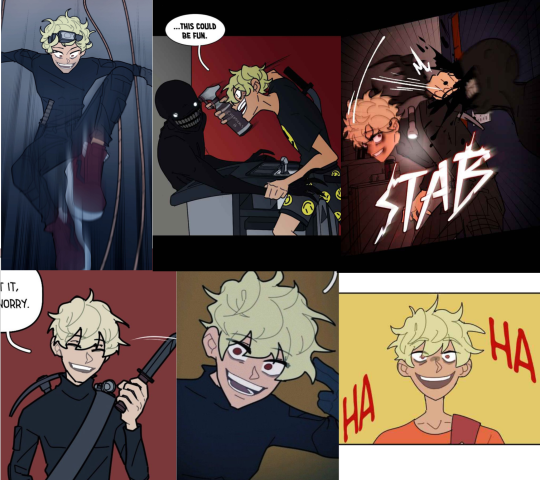
and as we all know, our boy isn't exactly the most stable person. (sorry for the collages, but since there is a tumblr picture limit i have to keep on collaging. yes i learnt from the last time) his hyperactivity mixes with his unstable mindset which makes him incresingly vulnerable to danger- which he likes. from when the first shift happened, he's been really careless about stuff but it's been all about his love for thrill.

and it irritates Tyler, too.
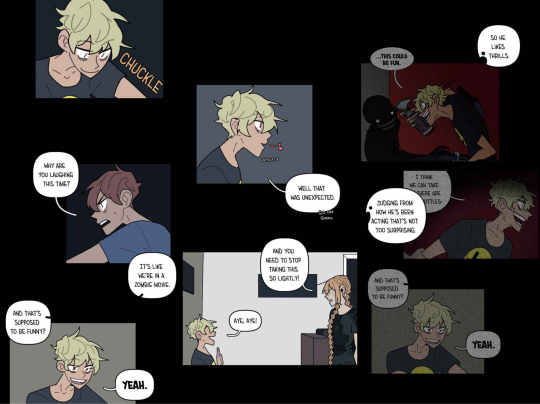
the main subplot about his character is that he's a person of excitement. guess what? ADHD people like the excitement, they like new things, they like the adrenaline and thrill. now, Aiden's main characteristic of being unstable mixed with ADHD makes him an even more reckless person. another thing mixing with the hyperactivity, is boundaries.
this part will mostly be about Ashlyn since the boundary issue only happens with her.
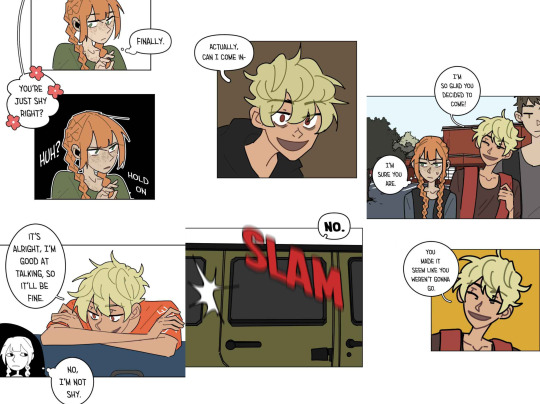
I talked about this on Ashlyn's side on my Ashlyn analysis, now it's time for Aiden's side.
he's really annoying to her at first. Ashlyn is someone with lots of boundaries, like high walls. and who tries to climb them with his dumbass? Aiden of course.

she kept rejecting his efforts to befriend her for some time, until the night they stole the jeep. then she managed to actually bring the walls down, and accept them all into her life. but damn was she blunt.
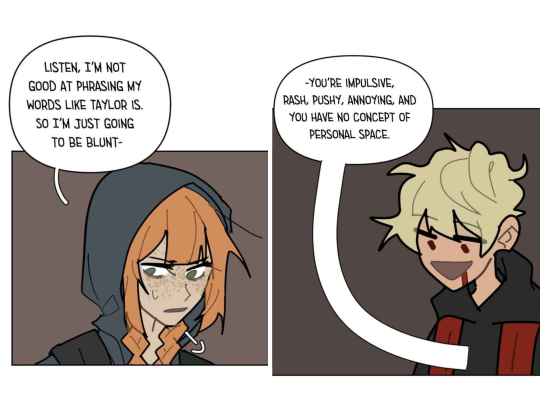
felt that honestly
and Aiden understands her that night, too.
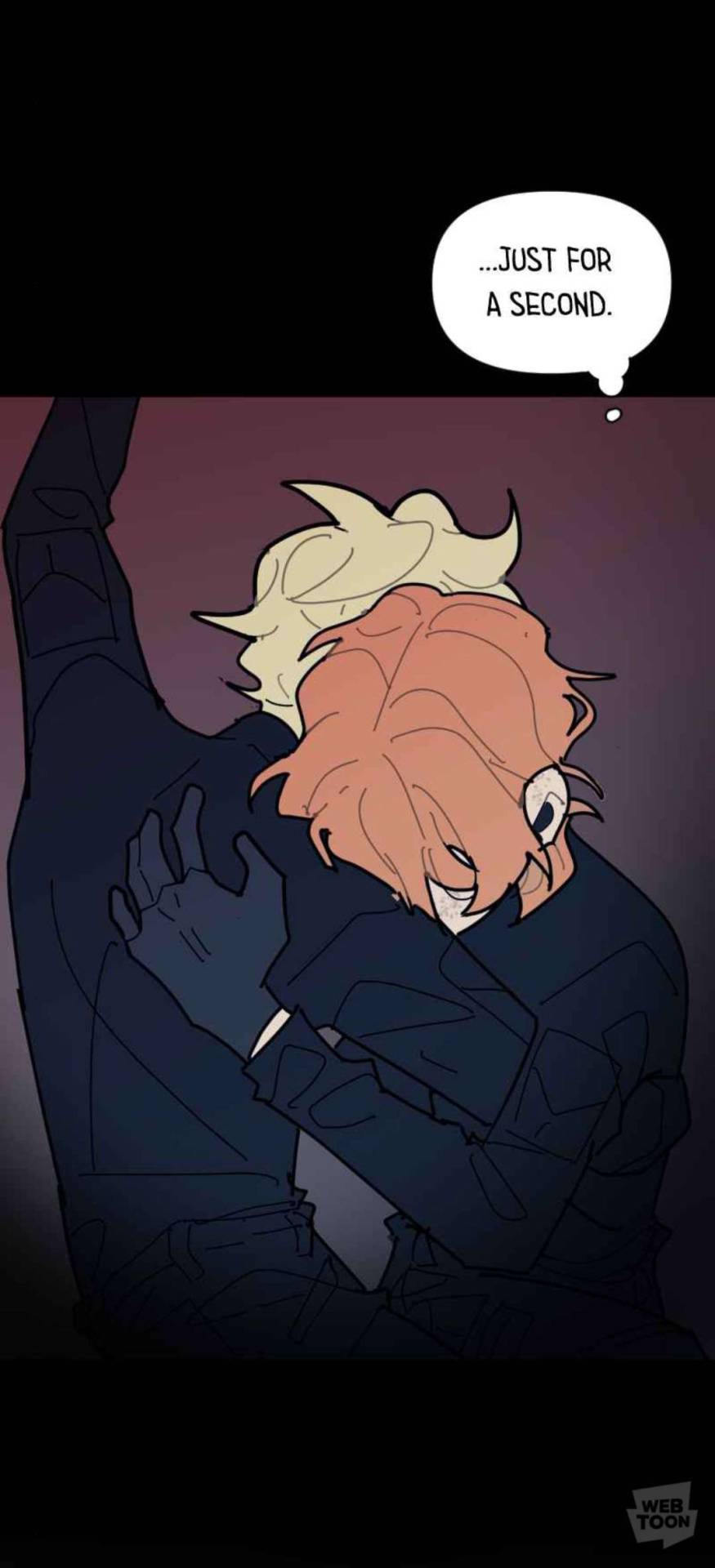
Ashlyn was hesistant to hug him, yes, he was aware. but she still did which made him realize she was also trying. i have to tell you, people with ADHD and people with autism either have trouble getting along, or go perfectly well. my ADHD sibling for example, I have to push them away for a lot and tell them to lower their voice. but once they remember my boundaries it actually becomes a normal, even pleasant hangout. which, Aiden realizes and tries to get along with. he tries.
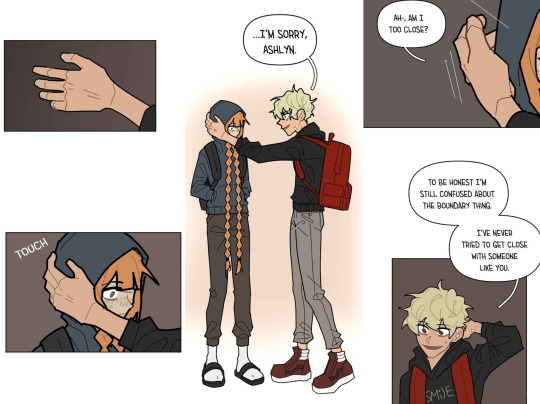
seeing his efforts on her boundaries makes something click in her mind. and she starts to be a lot nicer when they hang out in the arcade.
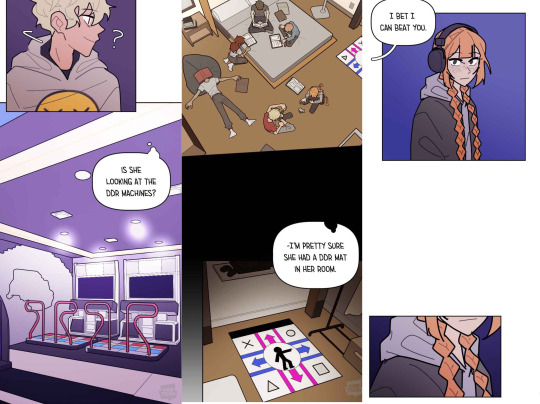
Aiden eventually learns and remembers what she's like and what she loves to do. he already tried to watch her ballet sessions once -got slammed-, he's been to her room where he remembered the mat from and her fighting makes it obvious. I'm sure he knew he'd get cooked by betting that. but he still did,
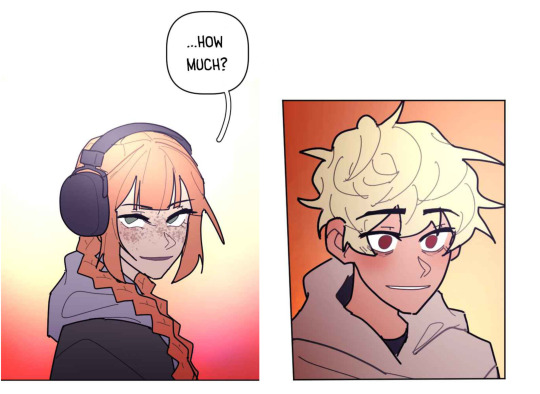
because he knew it'd interest her. which he succeeded, he saw her smile again. the arcade day went great until Barron and his gang pulled up, but if we ignore that part it all went well. Aiden started to understand and respect her boundaries.
anyways then Tyler fucking dies
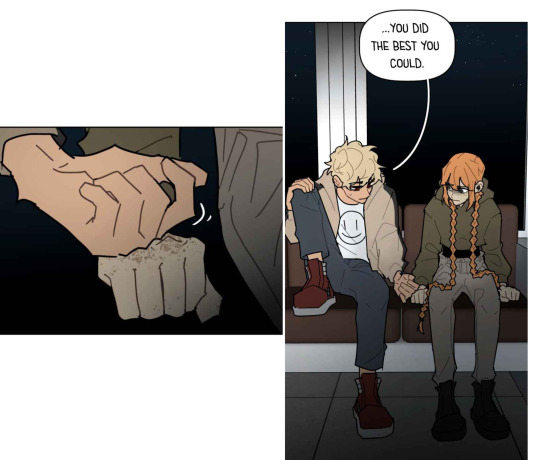
he knows that Ashlyn feels guilty. Aiden wants to comfort her through it, but also do it correctly. without going over any boundaries. which makes him really,

really,

really surprised when she responds.
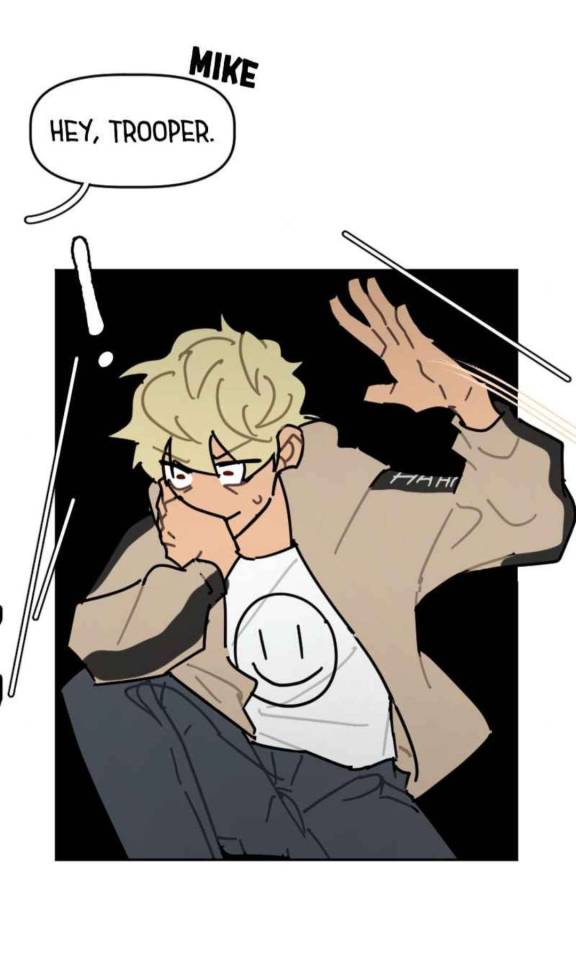
also including this pannel cause its hilarious
here we see that he's still trying. hell, I'm sure he spent minutes thinking if he should come close physically to help her. that's probably why he just nudged her softly before anything else. he's not used to it, he has to conciously make an effort to not cross said boundaries. keeping his voice lower, try to not be so reckless, not doing anything physically close unless she reciprocates. wow how i wish another someone i knew irl tried that hard instead of blaming it on me cOUGH COUGH COUGH
also other small things to include
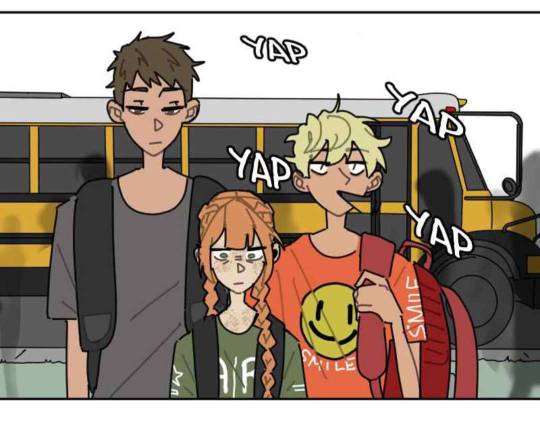
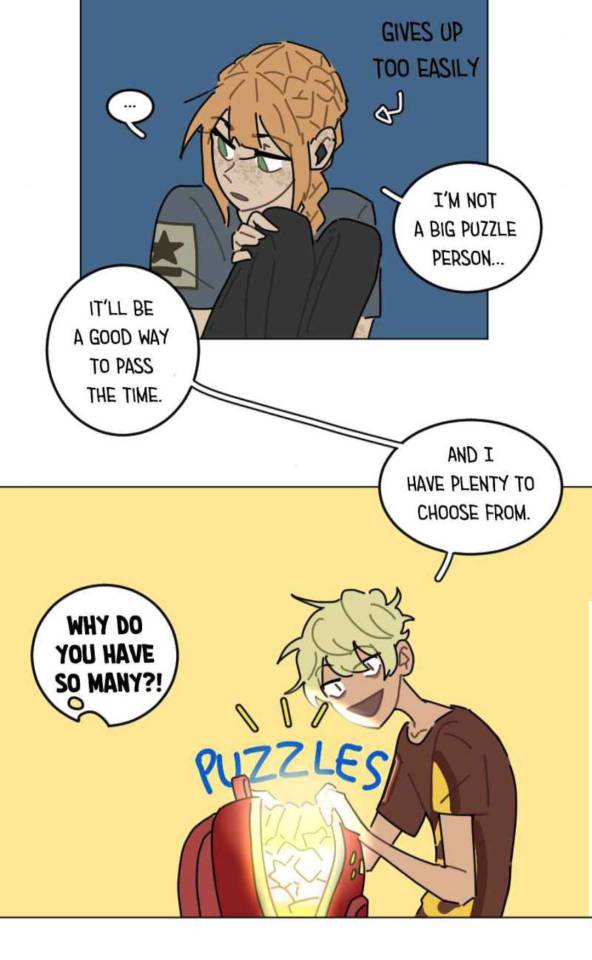
he's yapping a lot
he has a comically large amount of puzzles in his backpack for one single trip
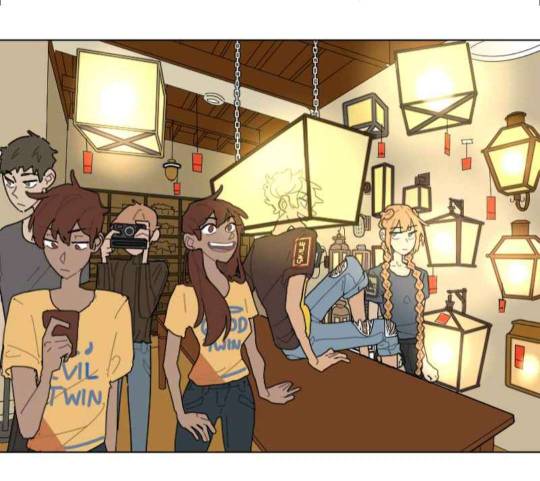
and sticks his head into lamps for some reason
but that's just Aiden and his little neurodivergent brain for ya.
now the part I wanted to get to the most.
Borderline Personality Disorder.
first, what is Borderline Personality Disorder?
shortened as BPD, borderline is when someone's mood is inconsistent and swinging. think of it's name; the person's mental state is in the border, in the border line, switching up fastly. the most easily understood and common type is when the person goes from a depression to a happy state. but no matter which state they are in and/or go to, one thing stays the same: it is unstable.
one thing about borderline is that it is frequently mixed with bipolar. however bipolar is a neurodivengercy which means it is what someone is born with and cannot be changed. but borderline is obtained later in life. it usually happens with depression. bipolar is much more random and the episodes last longer in comparison. it may last up to hours, and the person's memory might have trouble remembering their episodes. borderline, on the other hand, is a short-lived mood swing.
now here. here's the catch; people with BPD during mood swings can have reckless behaviour, suicidal thoughts -in his case as far as we know, lowered sense of protecting himself- or a loss of understanding danger. sounds familiar?

borderline's recklessness and dangerousness, sometimes self-destructive acts combines with ADHD's love for thrill and excitement, combined with Aiden's own personality all make up for a great condition of instability.

Aiden's behaviour constantly goes crazy, I think his most frequent mood swing might be his normal self (at least, as normal as he could be) to this more maniac way of acting. I noticed it from his eyes, when he's in a more calm-ish normal state his pupils are a bit more dilated. in the pictures above, you can clearly see that he's still in the episode; filled with the adrenaline, the unstable way of thinking.
but, what causes that? surely a mental illness such as borderline doesn't happen on it's own.
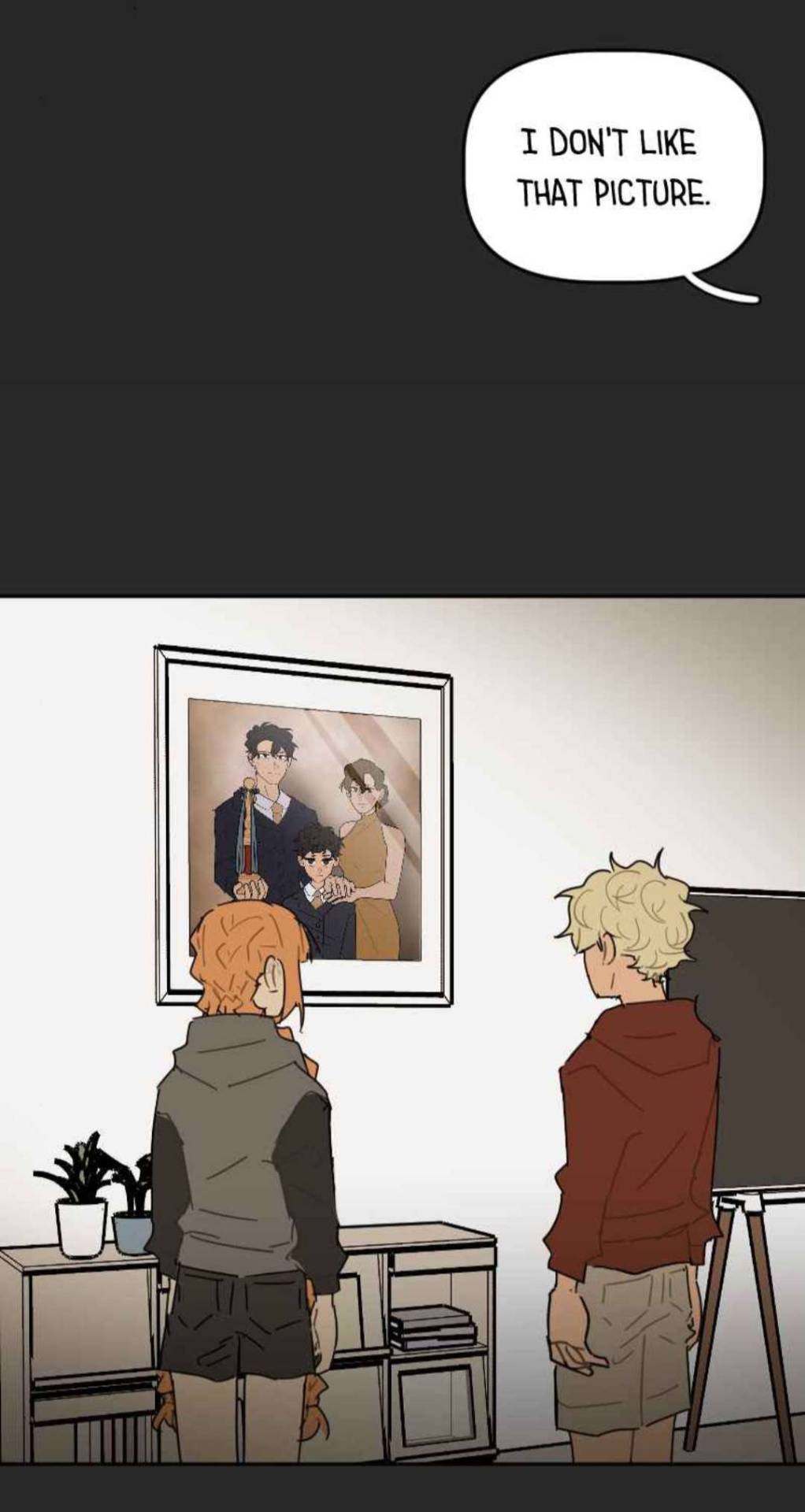
right?
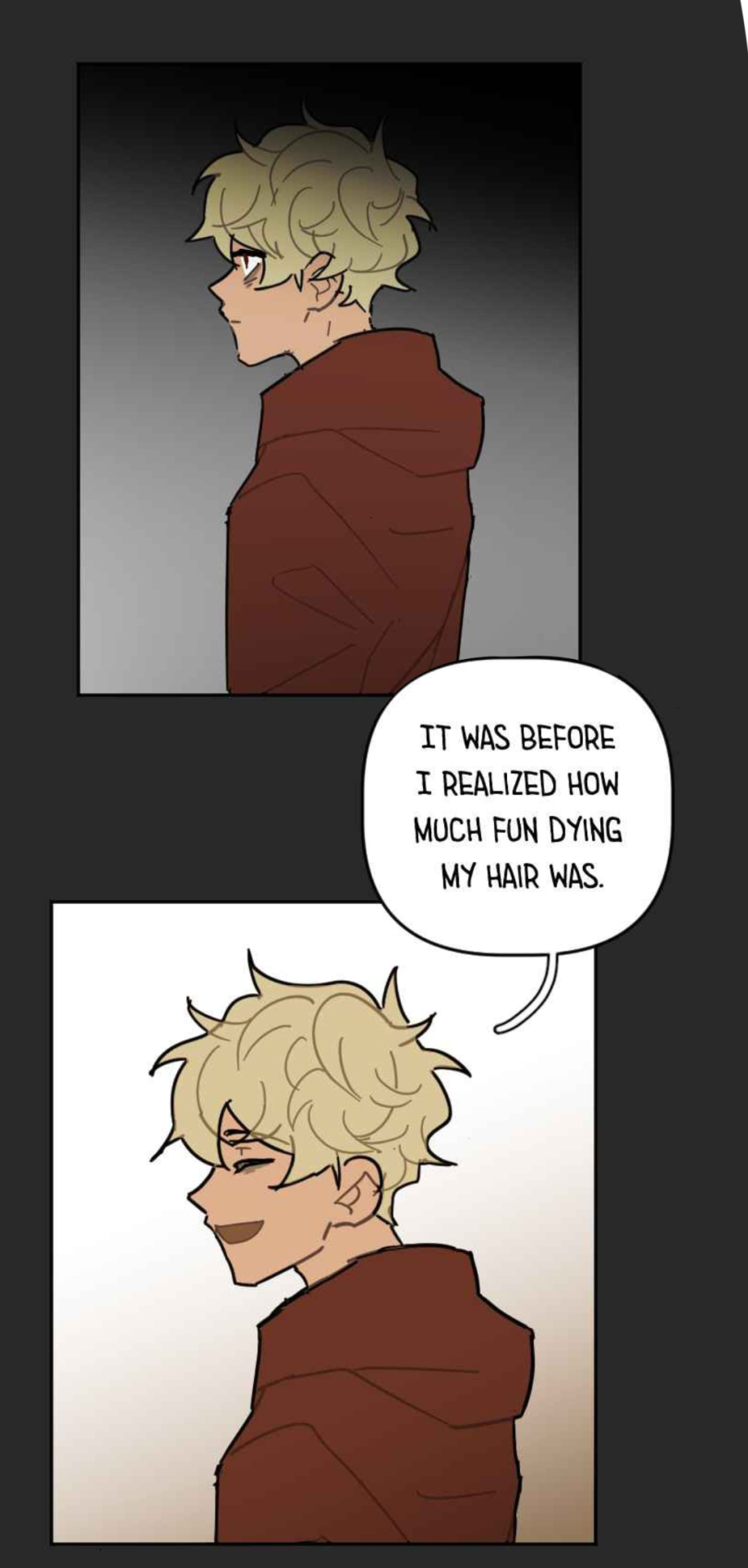
cause it didn't.
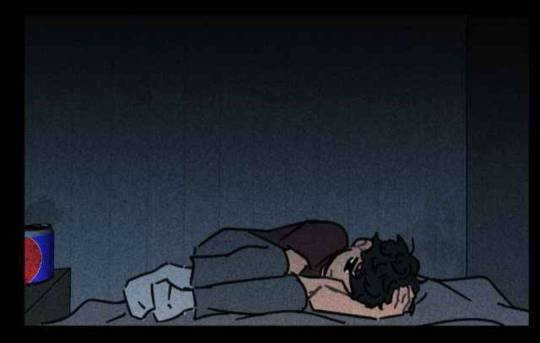
it never works that way.
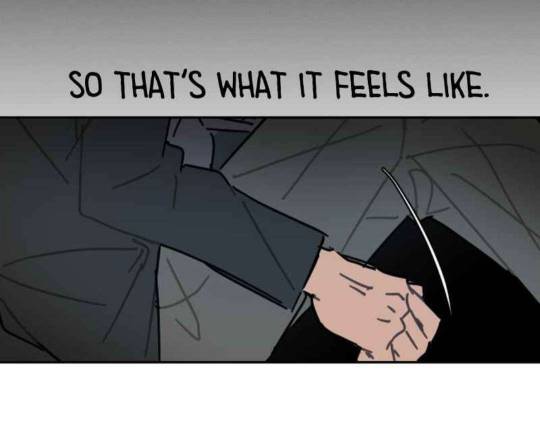
but it can get better.
eventually.
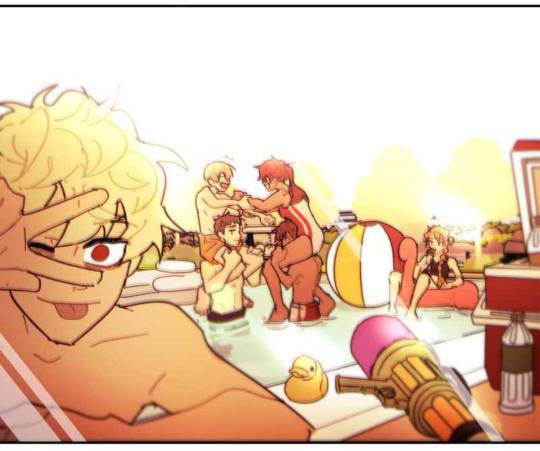
but what happened to him?
personally, as much as a large amounnt of people seems to believe it's something like family abuse I don't think so. maybe neglect, maybe withdrawal, maybe maybe. but we've seen his parents. I don't think they would hurt him like that. I can't put any more pictures, but this is the last part anyway. his parents seem to be kind and gentle, despite that picture in his house. I'm thinking the picture was only for the dramatic effect. his parents said that he used to be really calm and quiet during Lily's birthday, and both Aiden and Ben seem comfortable around them. they were happy taking Ben in too, any kind of abusive parent wouldn't do that at least that's what I believe. also there is that Aiden got serious and concerned when he learnt that their parents were also in the facility, most likely worried for his own as you would have thought.
there was a post that I've been trying to find for like half an hour, I commented on it but I can't find the post now. the person talked about their own theory. if I remember correctly it was that when Aiden was depressive as a child, his parents took him to a thrilling activity like the ones he's been talking about (bungee-jumping, skydiving etc.) and the thrill made him actually get excited. which is why his parents allowed him to go even more reckless, because they are aware of how prone their son could be to the depression.
what happened? let's ignore the parents factor. someone can have a loving family and still be traumatized, someone can be taken care of and still feel abandoned, someone can never have confronted a situation they are terrified of.
one of my theories is that, the loneliness. it must get to a child heavily considering children need to not be left alone, but Aiden was. he didn't have any actual friends since they always moved from one place to another from his parents' business, and they might have not had enough time to make for him (which I believe is bullshitting, every child deserves to be taken some time out for. some people quit their jobs entirely for their child.) and be unaware, and that doesn't change that he was still depressed and alone. his depressive state was seemingly before Ben was taken in. now here one thing with borderline, at least from my experience, is faking actions. smiles, laughs, friendships, conversations... almost as if there's two different lives; one fake, and one real. you keep on switching, you keep on swinging between the sides where you're yourself and where you're just mimicking 'normal human behaviour'.
it starts from faking a happy state during their depression, and by time you're faking it it becomes an automatic adition to your personality. to your mind. once it furthers, it becomes the disorder. Aiden we see is always smiling. it becomes a habit that only breaks sometimes. now, I'm not saying his smile is fake- I think his face is literally just stuck like that. it breaks ever so slightly sometimes. fake it till ya make it yanno? that kind of thing. and when he swings from his calm mood to his borderline-d mood, his pupils get small and his smile gets worse. noticably worse. I'll be rereading the series (AGAIN) and this time look at all the small details since Red loves putting them and I love theorizing so
which, wraps up the Aiden thing! im actually really proud of how i could put my thoughts into text which i never could. i'd love any additions because i love other opinions as well.
and you know what? im glad Ash and Ai are out of the place because the rest are what I'm actually looking forward to >:)
...and i should sleep. really.
(wow sorry yall i finished this hours ago and said 'alright reread to make sure its good before sleep' and fell asleep through it lol sorry for 4 hour delay ig)
(leaving for school rn see yall 8 hours later 🫡)
#sbg#sbgblr#sbg (webtoon)#school bus graveyard#school bus graveyard webtoon#schoolbus graveyard#aiden clark#ashlyn banner#sbg aiden#sbg ashlyn
126 notes
·
View notes
Text
Further Interview Analysis: the "Ford Plan," and Bill's Blind Spot
I didn’t sleep again the night after the “musical Weirdmageddon” post, and wrote a lot of loopy stuff the next day, and posted none of it. But then I slept, so yay, time for an attempt at some actual analysis! Original interview is, as before, here, with credit and thanks to @fordtato and @hkthatgffan.
"I think that Bill was trying to find Ford, but I think- I always think of Bill as like, this guy who has, like - you know, he’s stirring the pot of soup that is the Ford plan, and he’s got like 900 pots of soup across the universe of different things he’s working on, and at any given moment, he’s so cocksure that it’s all gonna work his way eventually."
Bill’s a trillion years old, so it’s like, Ford disappearing for thirty years is like- [snaps fingers] is like somebody saying they’re ghosting you and then texting you the next weekend, you know what I mean? He’s like- he’s like [handwave] “Ford’s gonna- Ford’s gonna be back. Ohh, [air quotes] we had such a big fight, Ford’s sooo mad at me,” oh, you know, “our will-they-won’t-they-take-over-the-universe relationship, like, he’s gonna- he’s gonna march off in a huff, and he’ll be back, ‘cause we’re- is Ford gonna find anyone else in the multiverse that strokes his ego as well as me?” Is there anybody else in the universe that’s gonna make Ford feel as important as Bill? No, of course not, Ford needs validation, and so Bill knows Ford’s gonna be back eventually.
...so, Bill still had a "Ford plan," did he? Like, some active plan that involved using Ford in some way to escape the Nightmare Dimension? Interesting.
I always interpreted his cliche-villain-gloating routine when Ford confronts him about being a liar as the point where Bill was ready to discard Ford altogether. If he had wanted to - if he could have been bothered - after all, he probably would have had a very high chance of somehow manipulating Ford out of the realization that he'd been played: Ford had been literally worshiping Bill a few days earlier. He was basically a cultist, and he was not only someone who'd spent way too long talking to Bill, he was also someone who could only confront Bill on Bill's turf, so to speak. But Bill didn't even try to turn it all around, because (ran my reasoning) he'd gotten what he really needed: the Portal existed, and you can't close Pandora's box. The technology was there. It would not, from Bill's trillions-of-years perspective, have taken very long to find some way to manipulate someone else into rebuilding the Portal once it existed even given Ford's attempts to hide the plans. Bill was scribbling on the Journal in invisible ink after Ford's last entry, before he buried it but after he wrote all about his plans in some detail, even drawing a map to J2. The Journal separation plan would have been laughably easy for Bill to work around. So at that point, I assumed that the only reason Bill didn't arrange for Ford to - if I may be blunt - kill himself the first time he blacked out was because Bill was basically getting off on the psychological torture and wanted to see how long he could keep it going/enjoy himself until Ford literally died of exhaustion. Ford certainly seems to think he'd have been killed if he had lost the game of 'hide and seek' in the asteroid field. I thought the idea that "Bill used Ford until he used him up, and now he was done with him" was basically canon, and that Bill paid no more attention to him from that point onward than you would pay to a broken Solo cup in the trash until Ford did something unexpected - ie, survived the Multiverse, came back with a death ray, apparently took out a few Henchmaniacs, almost shot Bill himself, and then survived the experience.
But here we have what I suppose amounts of authorial commentary which seems to directly contradict the idea that Bill didn't even regard Ford was worth finding and/or killing. Bill was looking for Ford, all those years - not all that intently, apparently, or really very long from Bill's point of view, of course, but still - and Bill still had a plan for Ford. Bill also, if I'm reading that right, seems to have really just expected Ford to come back, of his own free will, to join him eventually, not to kill him.
Of course, it's possible I'm reading that wrong, and Bill just knew that killing him would also give Ford a massive ego boost and that Ford would have to eventually reenter his orbit in order to attempt to do so. It's also true that Bill just not being able to accept rejection in no way, by itself, implies he wasn't planning to go "hahahaha, no" and kill Ford fifteen seconds after he finished begging Bill for forgiveness. But the 'Ford plan' bit seems to undermine that. Let's assume the hesitations and half-sentences are Hirsch improvising, not Bill actually cutting off a thought he might not like the end of. So was Bill genuinely never planning to kill Ford after he bumbled into the Nightmare Realm back in '82? And if not - what in the world was he planning to do to him once one of the Henchmaniacs caught him, then? And why do I have the feeling that whatever it was would have made murder seem both a) kind and b) not at all disturbing by comparison?
Also gives us, in a way, some insight into Bill. Kinda. We've always known that there's this...level, this very deep, seldom-relevant but very important level, on which Bill doesn't quite understand how people work. We see it primarily in the mistakes that Bill makes with Stan and Mabel. Maybe there was nothing he could have said or done in the situation with Stan to save himself, Stan had reached the point of literally suicidal determination and there's really not much you can do to budge someone at that point and especially not once their consciousness has already caught fire, but with Mabel - in Sock Opera, all Bill needed to do to win was keep his mouth shut for three more seconds. He was clever enough to see how Dipper and Mabel's relationship could be exploited to get Dipper to do what he wanted, but he did the exact opposite of what he should have done to get Mabel to do what he wanted, because for one thing he underestimates Mabel and for another...it comes back to that elusive Thing that Bill can't or won't understand about the deeper levels of humans. Or maybe it's Things, plural, and a distinct one for each person, but there's something there at the bottom of the personality that Bill apparently can't jive with.
With Ford, for instance, he clearly underestimates the power of genuine self-hatred and remorse. Bill may feel bad in some way about what he did to his homeworld, but look at the actual words of the Axolotl's prophecy: he feels that way not because he has realized at some point that what he did was fundamentally wrong, but because he wants to go home and can't. Essentially, his regret is for his own inconvenience. And in a lot of ways, I can see how that could have translated into him feeling he did, in fact, know all he needed to know to push Ford's buttons, because while it's never spelled out for us, it seems, based on his habit of carrying around family photographs on his person apparently since college despite not getting on well at all with his family, that there was maybe some tiny part of Ford that also wanted to "go home," and not just to flip off the town. Ford was also someone who deeply feared the consequences of his actions, if you read between the lines in the Journal - his worries about a 'Close Encounter' with the government, his scrawling that he must not lose his nerve on some early Portal notes, his talking more and more about Fiddleford losing his nerve in a way that starts seeming kind of projection-y - and Bill could certainly understand that fear perfectly well: we see Bill panic outright in the finale when he realizes he's out of options he's going to remotely like. In the unlikely event Stan would or even could save him, Stan obviously wouldn’t have done so so on Bill's own terms: Bill would have been stuck making an honest deal for once, or else left with the options of "die" and "take a one-in-a-million shot and do his invocation of the 'Ancient Power,' possibly putting himself squarely into the hands of an enemy whose full aims he probably does not know." But then, that's Bill's flaw - the things that drove him to become what he did were revenge and the fear of Death, of the ultimate loss of control. His arrogance makes him think he can take most any situation, no matter how disadvantageous it might seem, and twist it around sooner or later, but Death - well, that's it, ain't it? Or, as Horace might say in a really old translation:
When life is o'er, and Minos has rehearsed
The grand last doom,
Not birth, nor eloquence, nor worth, shall burst
Torquatus' tomb.
(Horace, Ode 4.7. The Odes and Carmen Saeculare of Horace. John Conington. trans. London. George Bell and Sons. 1882.)
Bit different from most translations I've read, but close enough and in the public domain I believe, so we'll go with that. It's possible that Bill's...unique...state of existence may actually make dying an even more terrifying prospect for him than it for the rest of us. He became what he was to escape limitations, including mortality - but after all that killing and burning and transformation, he found out that he might not ever die, but that he could still be destroyed. And even when he found his own 'territory', it started decaying around him, which proved that dimensions, too, can die even if nobody is apparently actively trying to destroy them. What happens to him then? That's what he's afraid of, and he cannot quite grasp that others might be able to overcome that fear in service of either another principle or another fear. That's where he keeps running into trouble in the series timeline, too. It never occurred to him that Gideon might have enough humanity to want Mabel to actually care about him, instead of just about possessing her - much less that Gideon could want that enough to risk death for it. It was inconceivable to him that Dipper and Mabel could voluntarily turn their backs on even a blatantly false paradise to willingly walk into a living hell, just because it was the right thing to do. And as for Ford and Stan....
Well, on one level, he's right about Ford. When he met Ford, they did have certain things in common: frustration, ambition, deep and secret regrets, loneliness, and fear of facing the consequences. Ford's desire for respectability and honor from those who had rejected him his whole life may have extended this even further for him than it went for Bill in some ways: he couldn't even admit to himself that what he was doing was totally self-interested, whereas Bill, like Stan, has long since come to terms with his own selfishness. And like Bill, Ford probably didn't even have the ability to see that no matter what he did, it would never be enough, and would never really satisfy him. But death? Ford doesn't fear death. Never really has, as far as I can tell, but he certainly doesn't now. The way he lives his life, the man might as well be courting death - sending it roses every week and buying all its drinks at the bar, so to speak. He and Bill both fear the consequences of their actions, but 'consequences' are a category, and it's just as possible to be afraid to live as it is to be afraid to die. And Stan...Stan is harder to be sure of. Certainly Stan's priority is always for self-preservation. He's probably depressed to some degree, and he will risk life and limb without hesitation when he perceives a threat to that which he loves, but that's something that usually happens in a crisis. He doesn't hesitate because he doesn't think about what he's doing, which is what makes the Final Deal such an incredible gesture for me - he not only had plenty of time to think about what was going to happen, but he had to actively take steps himself to enable it to happen. To me, at least, that seems the hardest thing...but then, the whole situation in the Fearamid is one that brings to mind some of my worst fears, to the point that I find the scene difficult to watch and I almost scrapped an entire 22,000-word story once just because it required me to write about a small part of it. I'm sure Bill risked death, in some fashion, to become what he is, and I'm sure he was afraid of failure every time - but he was less afraid of a bad outcome that might come from leaping at the chance for some semblance of life, any semblance of life, no matter what that might look like or how long the odds might be, than he was of doing what he knew would lead to...wherever even destructible gods go, when they go. This is why the Stans were the thing he couldn't account for, really. He couldn't conceive of having a priority higher than self-preservation, of overcoming his worst fear - and that was what destroyed him. Maybe, anyway.
It's sort of funny, actually - I started writing a completely different post yesterday about how to develop a new character based on some of Hirsch's remarks, and in the course of it, I made the remark that I found it hard to fathom how you could write any of Gravity Falls, at all, without knowing ahead of time that it is the story of (if I can make so bold as to quote my own story's dialogue) "the Faustus of New Jersey and His Knucklehead Brother and the Hazard Sign From Hell," and without at least a fairly good understanding of who those three people are and how they got there. If one looks at the story that way, I suppose you could say the events after their starting situation are also the story of these three being thrown up against the places where their real deepest fears lie, and seeing who has something he really, really will not compromise on...or at least, it did at the start of this paragraph. But did any of them, really? Bill blatantly fails that test, of course - Bill runs, just like he's been, in a way, running for his entire miserable existence. Ford comes close to what might have been a couple of breaking experiences for him - either surrendering to Bill or, had the memory wipe worked the way he thought it would, with living with whatever the fallout of essentially killing his brother would have been - but the universe was kind and stacked the deck just enough to let him cheat his way out of that one, at least for the most part. But what about Stan? He didn't want to die, but we already knew that he'd risk it for the kids, because we've seen him do that before. The way he went about it this time arguably took more courage than the others, when he just went in swinging at an immediate and obvious threat, but it was still an escalation on an established thing. Stan's real worst fear isn’t death - it’s of being alone again, of losing his family. That's the principle that overrides self-preservation for him. What would have happened if he'd been in Ford's shoes - required to take up the role not of the sacrifice, but of the one who performed it, giving up one member of the family to save the others? Could he have done that?
...though that is wandering from the topic I was originally talking about, isn't it. Which was that yeah, Bill is, in his way, as fallible as anyone else despite his immense resources - which is gonna be a fun topic to get into when I get around to the post in this series about writing higher intelligences, but that's also not the point, which was that Ford was never going to go back to Bill the way Bill thought he was, because Bill's inability to understand other people's ability to do things that he can't is a serious blind spot for him. It's the thoughts he can't have that doom him (probably...hopefully, anyway...), fortunately for the rest of us.
#gravity falls#gravity falls characters#ford pines#stan pines#bill cipher#gravity falls analysis#inspired by the Hirsch interview#rambling happened#my ramblings
98 notes
·
View notes
Text

An absurdly detailed analysis of That One Soldat Photo
Hang around wintersberg fandom long enough, and you'll likely run into a popular crack-theory that, since Heisenberg obviously thinks that building a set of huge, yellow-painted signposts is a good way to point Ethan to the Stronghold, maybe it's Heisenberg who's been leaving all those handy, yellow-painted supply crates all over the place for Ethan to find! It's exactly the kind of fun nonsense I'd enjoy if it didn't feel folks are starting to take it a little too literally (by which I mean I have now read multiple fics in which it's played completely straight ‒ and, like, people do get that it's just a crack theory, right? Like, why would Heisenberg have left so many yellow crates around his own damn factory? Look, you don't have to explain every last game mechanic, not everything is lore!)
But as anyone reading my own fic would know, I'm guilty of echoing the idea that Heisenberg-was-leaving-stuff-for-Ethan myself ‒ just not because of any yellow-striped crates. No, I'm way more interested in this one weird soldat-photo you can find in the village ‒ long hours before you'll ever see your first Soldat in the flesh...

Very creepy. And if you turn it over, you'll find a clue to a puzzle you'll have to solve in order to progress.
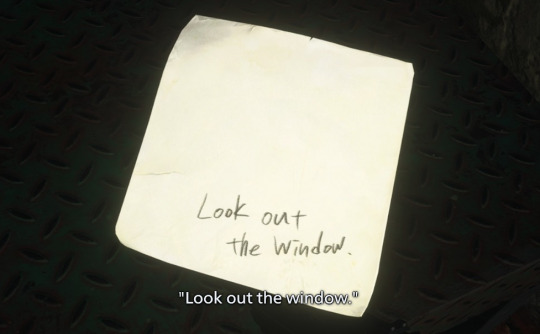
(And of course, when you do look out the window, odds are you'll get jump-scared by a lycan just when you're focused on the numbers, because RE8 loves that sort of misdirection ‒ but I digress.)
Anyway, the code you can see out the window will open a safe containing a jack handle you'll need to move a vehicle in the village, as well as the M1911 pistol (which will very likely be your go-to handgun for the rest of the game). The game is full of conveniently-helpful clues like that (heck, most games are), often with no obvious Watsonian justification. And there are other photos around the village ‒ Luiza has a whole photo album ‒ but photos of experiments created by Miranda and her lords don't generally turn up outside their own territory.
For a player exploring the village for the first time, that photo is a lovely little bit of foreshadowing, hinting at monsters and factory stages to come. But on replaying with full knowledge of Heisenberg's later attempts to get Ethan on his side, that Soldat photo is just enough to make you go, huh... did Heisenberg leave that for Ethan? Like, on purpose?
You can find another copy of that photo later, in Heisenberg's factory, along with his notes on his early series Soldat experiments. Which doesn't really prove anything beyond the fact that assets exist to be reused... but it does at least make it pretty canon that Heisenberg has photos of his Soldats sitting around.
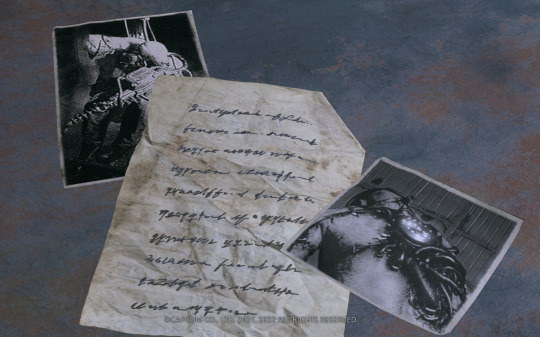
Possibly also significant: both the clue photo and the factory documents are tagged 'geekmemo' in the game files. Most everything related to Heisenberg in the files is labeled 'geek'-something ‒ it seems to be an early nickname for his character that lasted well into production. Everything in the factory is geek-something, even the model for the passageway from the altar to the bridge is labeled 'pathtogeek'. Considering that so many soldat-related assets are already labeled 'geek', maybe that 'geekmemo' tag doesn't really tell us anything we don't already know ‒ but it certainly doesn't work against the idea that Heisenberg wrote that 'memo' himself.
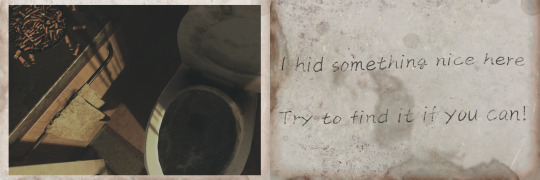
Besides, it's not like there isn't precedent for this kind of thing. RE7 had a whole mechanic where you'd have to find 'treasure photos' pointing out the location of a few rare and useful items, all with "I hid something here" written on the back. We're never explicitly told who left those photos lying around, but it's obviously Lucas: he loves playing games, he loves taunting prisoners with the possibility of escape, and who else would it be? The complete population of the Baker mansion is like 6 people and a bunch of semi-sentient mould.
Over in RE8, there are a lot more village resident who might have left that clue lying around. Like it or not though, Heisenberg is very much RE8's equivalent of Lucas: the family's wildcard show-boater who loves making Ethan jump through hoops for his amusement. So how does the game let us know it was Heisenberg who left this particular clue? Well, who else would leave a message on the back of a Soldat photo?
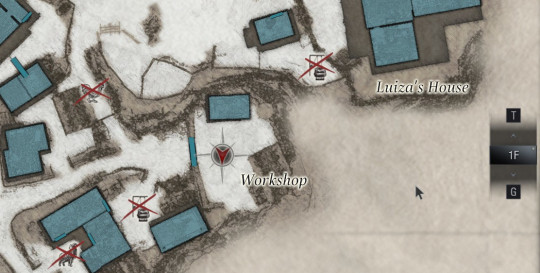
There's may be additional supporting evidence Heisenberg could be involved ‒ most notably the location, being a locked-off cul-de-sac labeled 'Workshop' on signs and maps. The area is full of metal junk very much like you'll later see lying around the factory.

The workshop location does have other relevance ‒ it makes sense that you'd find the jack handle in the village workshop, whether Heisenberg was involved or not. But it also stands to reason that if there's anywhere in the village proper where Heisenberg might hang around and leave clues for Ethan, the workshop is it. And you have to admit that leaving Ethan useful stuff in a safe along with an easy clue that will likely get him jumped by a lycan is 100% more in-character for the guy than just leaving useful stuff out in the open, even if it doesn't really prove anything either.
There's one more weird-little does-this-mean-anything detail: there are three dead crows near the safe too.
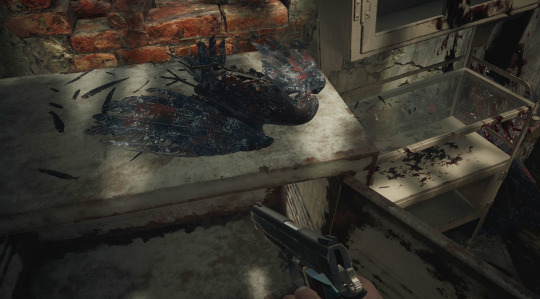
It's not the first time in the game you've seen dead crows (there were a bunch outside the village, and I've talked about what that might mean in the context of Miranda's cult before). But I don't remember finding any others around the village itself, other than in this one spot. And instead of being hung from trees like a ritual sacrifice, these ones are just dead ‒ messily, and with blood everywhere.
Now, maybe it doesn't mean anything, but is there anyone in the village more likely to vent his frustrations by violently killing a few of Mother Miranda's avian avatars than Heisenberg? I'd think not.
In conclusion: I still don't think all those yellow crates have anything to do with Heisenberg. And I still don't know for sure whether the RE8 development team wanted me to assume that Heisenberg left Ethan that photo, jack handle and gun. I don't know if we're supposed to read that Heisenberg keeps a workshop in the village and sometimes kills crows out of spite. But the evidence sure does point that way ‒ and it's as valid an interpretation as anything else you might take from this game.
388 notes
·
View notes
Text
More thoughts
I get both sides, but I feel a little confused they couldn't find four people in their +25 employees
Data analyst (Are you seriously telling me you couldn't personally email or even just HIRE matpat's team who do data analytics as part of Theorist Media to help??? The man would be overjoyed to help???)
Editor (Put the first $6 towards a can of coffee grounds, dude)
PR Team (Even, like, a single person, please, for the love of god)
Business Major (Or literally anyone that has taken a home ec/budgeting/personal finance class)
First, the Dish Granted series was started when gold leaf burgers were novel, now it's seen as tone deaf (for obvious reasons) it should have shifted to something like interviews with people who make that kind of food or local businesses (like parmesan cheese shops in Parma, Italy) or the history of food (like talking about the history of modern Native American slavery on Californian wine vinyards). Not to mention the untapped potential of Food Fraud topics. Either shift it, or scrap it. Any data analyst or chronically online person could tell you that.
Second, why did you keep "anyone can afford $6 a month" in? Are the editors asleep at the wheel? Are they overworked? What is going on? You know damn well to not make generalizations about what people can afford. That's NEVER a good idea, especially when you KNOW (because YT gives you analytics) that most of your viewers are young (16/18-30/35 range, I'd guess) who probably, either 1, are still in school and either arent paid well/dont have jobs OR 2, arent paid well and tired of people's shit, like people who own businesses talking about "tough financial decisions." To them, Watcher isn't going to look different from the other people talking like that, because this was so sudden, with no input from fans, and in the video you hear shit like "anyone can afford [X]." To be frank, it wouldn't really matter what the amount is, because that generalization goes against the message they have stood by for years. THAT is a slap in the face.
Third, what are yall doing with the budgeting? Every artist has a right to make art that they are proud of. Every artist deserves to have their work seen if they so choose. Every artist deserves to make a living. HOWEVER, there are MANY options online when it comes to making money, especially on YT. You could get into marketing, data analysis, expanding your demographic, looking at what people are interested in right now VS what will stand the test of time (not gold leaf burgers), etc.
You have to either have these skills, develop these skills, or hire someone to do it for you. It's understandable that you would want a team behind the production, but I find +25 employees to be WAY too many people, especially in LA. Bailey Sarian has a Dark History section on her YT (and Spotify podcast) where she has hired historians to help make sure her episodes are as accurate as possible. You've caught heat before from Puppet History's missing & incorrect info, you should do the same. She has about three (3) "intermissions" per episode for ad breaks. I never see anyone complain. People WOULD listen to yall talk for that long (+1 hour videos), tbh, though that's not necessary.
Why are yall out here with Teslas, expensive food, new gear, scripts (where there weren't scripts before, PH is different, that makes sense), and "better than TV" level sets??? I need to put your accountant in this week's church prayer list what the actual hell??? Ya'll, this video is literally the meme:
Guys help me budget:
LA Rent: 2K per month
Videos: 100K per vid
+25 Employees: God only knows
New stuff for videos: Don't get me started
Like, are you serious?
You have a right to do whatever you want with your art. You have a right to charge whatever you'd like for that art. You have a right to make a living from your art and you have a right to ask your fans for money.
Your fans have a right to be angry when they've been supporting yall for, what, almost 10 years? They have a right to choose when and where to spend their money even when you've made an impact. They have a right to feel betrayed, especially when there are better options (like Nebula or consulting with Theorist Media).
Fans DO NOT have a right to be racist to any members of Watcher, now that they have made a decision they do not agree with.
I personally, think this is a really silly decision and could have been solved (haha solved) with a simple YT poll, but apparently we had to get... this. I respect their decision, I just don't think it was a smart one. I wish them the best, and I hope they find a better solution. Any further comment from me will depend on what steps they take next.
53 notes
·
View notes
Text
Insights come, through original content
It's definitely worth the time, to watch as much original content as possible. BIG note to self.
I've watched all four seasons of Bon Voyage, and just finished the four years of Summer Package. Lots of stuff that I have seen bits and pieces of before, in a lot of compilation videos and "analysis" videos. VERY interesting to see all of it within it's original context, in each show.
Yeah, there's a bit of Jikookery as people call it, in some of it. Most of it I had seen out of context, during my first couple of years in the fandom (when I didn't have any idea about anything). There are a few moments here and there that I haven't seen before which are primarily touches, and super subtle stuff.
The interesting thing is how people have taken so many of those moments out of context to support a story that they are presenting, in their compilations or "analysis". Yes, it can be said that other parts of the fandom have done the same thing, for the same purpose.
One of the moments from BV in Malta that everyone has seen comes to mind, here as I type. It is when they are all at a restaurant, and Jimin and Jungkook are seated across from each other. They reach out at the same time, to offer a bite of food to each other. That is a favorite clip that j-kookers love to use, to prove their theory. I mean, I do think it is cute and sweet, and I do believe that Jimin and Jungkook are together (in a closeted relationship), I just think that it's really a disservice when people leave out the other part of that scene. You know, when Jimin is then offering bites of his food to the other members, too. It wasn't just a Jimin and Jungkook thing, like is portrayed in many of the YT videos I have seen...
The other things I noted are how the editing was just so chopped up and discombobulated at times. Like When you see Jimin literally sitting down right next to Jungkook and then suddenly it is edited and next thing you see is Jimin on the opposite side of the group, not sitting where he had just sat down a second before. lol... Yeah, there's a TON of that crappy editing in all of the series and shows. I'm guessing that as they got into 2017, 2018, 2019 that they had to do a lot more editing as Jimin and Jungkook kinda started being more open with their antics. lol...
I kind of understand why people like to create those videos over on YT. There's thousands of them probably, and literally millions of viewers who like that type of thing. I was one who watched a bunch of it, as I mentioned before. It was before I understood what a lot of it was, and before I understood how much manipulation there was.
What's next on tap for me? I'm not sure. There's a ton of content still for me to make my way through. It has been enlightening to say the least. I do see the shift in the way that Jimin and Jungkook were from the early years into 2019, from what I have watched so far. There's so much there that clearly shows that they had particular types of experiences with each other, behind closed doors. I mean, anyone who has ever had a lover would see it in their energy(if you sense or see energy) and in the way that they would touch each other. It is as clear as the sun in the sky.
I can only imagine the complexities that the members had to navigate in their relationships with each other, their communication of how they felt to each other, and in working out HOW to have two members in a close intimate relationship within the group. Talk about a complicated situation. That puts it mildly. No wonder Namjoon had so many moments when they were in front of cameras, audiences, interviewing and such. No freakin' wonder.
Sorry for this long ramble..... I've just been thinking a lot about them and about what I have seen in these shows. Like I have mentioned, I hadn't seen much of the original stuff that was on Weverse, sold on DVD, or behind pay walls. I didn't actually understand what the heck "Summer Package" meant! lol... There's a TON of content that I have still to watch. This will be an ongoing thing for me, during these months while we wait for June 2025. There's probably going to be more rambles like this one, to come.... 😁💜
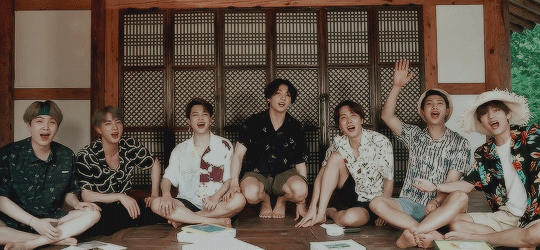
74 notes
·
View notes
Note
so three things,one I love your hc/analysis on forget me not its *chefs kiss*and nice to see more content on him!! two I do have a request ! I am curious about your hcs for how forget me not would like actually navigate a relationship?
sorry if this is lengthy or if my request is a lot im a lil new to all this !!

;RE1999 FORGET ME NOT - Relationship Headcanons

Compilation of headcanons about Forget Me Not in a romantic relationship.

not lengthy at all, ty for the ask anon! <3 super glad you liked my FMN post too!!
you asked about how I think he'd ACTUALLY navigate a relationship, so I went a little deranged thinking about it cause the guy is FASCINATING to analyze. sorry if you were expecting something else! like, something more romantic? if you just want romance stuff, deffo feel free to leave another ask being more specific!

Right off the bat, Forget Me Not strikes me as a type of person who has a lot of trouble keeping any sort of solid relationships due to his poor interpersonal skills.
Similar to Pavia, he exists outside of conventional society - but unlike Pavia, Forget Me Not has taught himself how to imitate others and mask as a sound, hinged and regular individual. He can charm his way in and out of any conversation, change the tide to his favour and play any role necessary for his goals - but it's all play pretend in the end, because he wholeheartedly believes that none of it is meant to last. Every relationship and connection he makes is done with one purpose in mind: to further his goals.
When someone approaches Forget Me Not intending to seduce or romance him, he plays the role of a perfect gentleman. Or whatever is convenient at the moment, really. His keen eye allows him to quickly discern little details, until he fully figures out your type just so he can adapt accordingly. This is a fantasy that wears off overtime - once you overstay your welcome and outlive your usefulness.
And because Forget Me Not is too much of a coward to risk his reputation and hard work by being the one to break your heart, he manipulates the situation to come out of this relationship scot-free. If you can't find any reason to leave him on your own, don't worry, he'll make sure there's something.
But when it comes to him being interested in someone and navigating a romantic relationship...
When Forget Me Not falls for someone, he falls hard and fast.
I want to insist on the lack of interpersonal skills - Forget Me Not has gone years denying himself of something as simple as a friend, someone to confide in. His whole existence revolves around revenge. To him, there's no space for romance in his life, he has no time for something so "juvenile". He can't fathom the idea of being attracted to anyone. The muscle in his rib cage isn't capable of love, it's just there to keep him alive until the world is rid of humans.
And yet, as blind and oblivious as he may be to his own feelings, Forget Me Not falls hard and fast entirely because of how desperate for connection he is. Attraction is something that paralyzes him and affection is a parasite that worms its way into his heart.
When Forget Me Not falls for someone, he becomes impulsive and reckless, not a lot but just enough to be noticeable by those who see him regularly - there is this slightly intense and unhinged feeling to his words, as opposed to the suave and smooth talk he casually dishes out, like he's itching to unravel and show his true nature right there and then. It's something that you still pick up on, long after that conversation has ended, something that you must've heard incorrectly because it's a little out of character, coming from him.
This is because he has no fucking idea on how to deal with it, because he doesn't even know something is happening to him.
No matter what he does during this state, he finds a way to justify all of his actions because denial is his first and foremost coping mechanism. If he finds himself staring at you from across the room, it's because he's making sure you're behaving. To ensure you're not a spy or cause any trouble to other patrons! If he remembers your favorite drink, it's because he needs to get enough points to be on your good side. After all, you probably have a lot of information he could use. If his hand lingers on yours, it's because he was distracted. Etc, etc.
If it goes on for long enough without any sort of confrontation, it'll start to eat him from the inside. Forget Me Not will think that you're using some arcane skill on him to make him act this way before he acknowledges he has a crush on you. Suddenly, there's a whole new thing occupying his brain - whenever he's not dissociating at home, he's thinking about you and that's dangerous.
Surprises are the way to his heart.
It's very hard to catch his eye, since he doesn't care for appearance nor status - he just doesn't care, period. Again, love isn't an option for someone like him. But the one thing that will absolutely rock his world is being caught off-guard.
Forget Me Not is a great actor, he plays his roles in conversations perfectly, he studies the way people talk to each other, the way one must gesture and move, the appropriate amount of eye contact one should make. He micromanages every single aspect of conversations because diplomacy is his forte, it's something he needs to excel at. Long story short, he knows how each and every conversation should go for him to get his way.
Which is why hearing someone laugh when they shouldn't, a genuine snicker or a chuckle, is enough to give him pause. He's intrigued and lost, because people aren't supposed to behave like that. Not the type of people he's used to, anyway. Condescending laughter is to be expected, everyone is pretending to have fun, but a real laugh? Without any hidden meanings or implications? The audacity to go off-script, regardless of how that might affect you? That's what will inevitably put you right in his sights.
These surprises must start out small, however. Forget Me Not is a very jaded and vindictive person with a very fragile ego and stubborn mind - someone who openly goes against everything he stands for, regardless of whether they're right or not, will end up on his black list. As seen with his reaction to Druvis III choosing to move on from her grief, Forget Me Not doesn't do well with his beliefs being torn to shreds so suddenly.
This mentality about everyone being inherently rotten and bound by so many unspoken rules of conduct and whatnot needs to be challenged little by little. Because at the end of the day, Forget Me Not projects his own baggage onto the world, and he must ease himself into the idea that people (and himself) can have actual depth and be more than just a means to an end.
And sure, he has an obsessive personality - some of his behaviour stems from the need to figure out "the catch", like he's constantly waiting for the other shoe to drop when it comes to you, just so he can go "I knew it!" at the end. Forget Me Not, under all that aloof and detached confidence, is nothing but a wounded animal. Gaining his trust or approval is harder than it is losing it.
On the subject of falling for anyone who isn't a pure blooded arcanist.
There is the possibility that Forget Me Not may fall for a human or mixed - two groups that he, alongside Manus Vindictae, holds with extreme contempt and hatred. Right away, it goes against everything he stands for and, as stated before, he doesn't do well with his beliefs being challenged so abruptly.
Whereas Manus Vindictae is an organization that has no problem being so openly hypocritical in their practices (loathing humans, yet offering them salvation just so that they can be used as pawns), Forget Me Not is an individual who lives mostly within his own head, in a constant state of denial and delusion. The idea of falling in love is already ridiculous to him, I literally just spent so many paragraphs talking about how he needs to ease into the idea of forming any sort of meaningful connection, even if it's something he does yearn for and something that he does so horribly. So imagine the absolute fucking whiplash of falling in love with the representation of everything he despises.
Forget Me Not navigating relationships is already difficult enough, but him trying to navigate a relationship with a human or mixed - especially one that is vocal about his affiliation with Manus and his own opinions - is even harder.
But not necessarily impossible.
However, it would lean towards a godawful and unhealthy dynamic, in which he'll begin to blur the lines between affection and aggression. Think of an ourobos, a permanent loop of Forget Me Not being unable to let go while also pushing you away.
He scrambles to find any "rational" excuse to justify his attraction for you. If you're docile and compliant, he'll insist that you're "different" and "not like other humans" just to remain righteous and true to his beliefs by separating you from your roots. And if you're not afraid to call him out and argue with him, he'll feel validated in his beliefs and latch onto you like a parasite because "you need to be reminded of your place". It's unrealistic to think that Forget Me Not can change his mind and become a better person right away, he would need years to heal from his own baggage and biases, then even more time to undo all the things he's absorbed from Manus Vindictae.
But I know these types of dark relationships aren't everyone's cup of tea, so I won't go into detail about it! Other interpretations in which he manages to get rid of all the toxic sludge that is his emotional baggage and questionable morals are just as valid!
The way Forget Me Not acts when he's in an actual relationship.
Every relationship Forget Me Not has had so far has been for the sake of The Walden and/or Manus Vindictae, and he's always made sure to keep them at arms length anyway - so this would be the very first "proper" and official relationship.
And it's a mess. He reeks of insecurity.
Taking into account everything I've said just far, Forget Me Not could easily put all of that knowledge and masking into treating his partner like the gentleman he pretends to be daily. He could just do that! But it stops coming naturally to him the second he's in your presence. Because the thing that attracted him to you in the first place is all those details that set you apart from his "norm", Forget Me Not is stuck in this area of not knowing whether you'd prefer the person he pretends to be or something else, something he might not be able to provide. Note how it's "something else" and not just himself.
The idea of Forget Me Not as a person falls apart when inspected closely, and so he's left insecure and vulnerable. He latches onto you easily, in private and in public, shifting his focus to revolve around you instead - the brand, new and shiny light in his life - but lacks confidence when it comes to keeping you by his side without any sort of manipulation.
He tries, God, he tries so hard. But I can absolutely see him pull all sorts of moves on impulse. From really childish and petty things (insisting on being the only one to serve you drinks, subtly influencing the seats, so that you always sit somewhere he can see or without any of the other patrons bothering you) to genuinely insidious things (lying both to your face and behind your back to drive the people he considers "undeserving of your attention" away, keep you in the dark about certain topics).
It's a lot of back and forth, establishing boundaries and showing him the lines that shouldn't be crossed so that all these actions don't become the norm. To be in a relationship with him, you'll need a lot of patience to guide him or the backbone to set your foot down when needed. I'd say at this point, he'd definitely respond better to being challenged - you're his partner, after all, he holds you way above everyone else in the room, way above himself as well.
But once he's fully eased into the relationship? When he now knows you like the back of his hand? And you've shown that you're willing to stay, even with all of his faults? He becomes so very clingy, but also much more tired in your eyes.
Forget Me Not's antics - his possessiveness, slightly obsessive behaviour, etc - are replaced instead by this lingering feeling of sadness. Instead of kissing your hand in public to make a statement for the world, he holds your hand in private as if his life depended on it, because he now fully believes the relationship to be too good to last. It's like he's preparing to say goodbye before fully enjoying the present with you. Like you leaving him is not a possibility but the end of the road. Coincidentally, it's this "doomer" mentality what pushes Forget Me Not to be more confident when it comes to being vulnerable around you.
I like to think that Forget Me Not is extremely eloquent when needed, but he's physically incapable of talking about his trauma or any other unpleasant experiences in his life - it's directly a result of all this constant repression. So he wouldn't tell you about it, but he would still hope that you can understand him without the need for words. I just see him as a physical person once comfortable!
#reverse 1999#reverse: 1999#re1999#reverse 1999 x reader#reverse 1999 headcanons#re1999 headcanons#reverse 1999 forget me not#forget me not#everyone give it up for the SADDEST man of manus vindictae#also also. i deleted the poll! i'll work on the manus vindictae analysis & dikke analysis next#i just wanted to get my first re1999 ask done teehee#ty anon!
106 notes
·
View notes
Note
okay but i actually kinda wanna know ur take on stridercest being canon compliant O_O <- autism stare
oh hey i am also hitting you with the autism stare. ill try to get my thoughts down in a way that makes sense to more than just me hahaha
bear in mind that im an epilogue lover and i think Meat/Candy are really valuable pieces that further all of the characters and are also hard canon in the sense that we're looking at just 2 post-game universe outcomes out of an uncountable number (the book in the picnic basket representing post-canon fanfic). i think the characters actions in the epilogues make sense and are satisfying to me. yes even jane (i love alpha jane and i will not do her the disservice of 'cleaning her up' w/o showing her work for it. thats not how you depict a character who grew up with fascist programming). i could totally go on a whole tangent about this specifically but thats another post lol we'd be here forever and its also not stridercest
but okay. canon stridercest. under the cut cause it got kinda long
basically it has to do with the cherubs and how their relationships and mating rituals are pretty obviously incestuous leaning even though cherubs dont have the human concept of Siblings or blood family. the cherub who predominates will search across paradox space to mate with another cherub who closely resembles the cherub they predominated which is like textbook Freudian sexuality. theres a lot of Freud and Jungian stuff in HS imo even if im kinda [wobbly hand gesture] at the validity of these theories applied to real life and real people. but theyre super fun tools and lenses to use in fiction and i mean. gestures at all of dave
so the incest aliens cherubs. the whole reason why im talkin about them is bc Caliborn is so incredibly interested and invested in the Striders in particular. caliborn as both Lord English and Lil Cal shapes earth NOT OVERTLY but more so embeds himself in earth society, but again, the Striders lives in particular. dave is full of incest jokes. hes even apparently got a list of his friends arranged in order of how likely theyd incest-elope with each other (thank you epilogues for this amazing factoid). he seems to think about it often enough to, yknow, Do That. have a good solid think about that and construct an organized list about it. bearing in mind dave makes jokes about stuff thats a) bothering him, or b) generally camping out in his brain. hes not even really aware of it most of the time (as we see in one of the openbounds where hes all 'why am i thinking about puppets???' after seeing dirk for the first time in that dream bubble. he is thinking nonstop about dirk at that point and going off his only frame of reference for ANY dirk, which is his bro. his bro who was most likely deeply warped by Lil Cal)
sorry for the long blocky paragraph lol. but now onto the next thing
Caliborn as Lil Cal is the centerpiece in the beta strider apartment. dave cant escape him and beta dirk grew up with him. what the fuck do you do when youre childhood comfort item is also the most evil creature across all of paradox space? if youre a dirk you try to fight it. but how long can you keep fighting something like that. its safe to say that bro was affected by Caliborns particular brand of perversion and sfw kink. i dont think i have to say how insidious abusive and toxic he is about those things. and looking at the truth of beta bro (16yo alpha dirk) you can start to see just how warped beta bro became. beta bro is a false dirk (still a very Real dirk but not the Truth of dirk. beta bro has been toxified and made infinitely worse by an absolute evil influence over decades of life. in 80s fuckin texas. presumably in the system. anyone would be fucked up after that)
so for this analysis/theory im stating beta bro as a false persona. using jungian terms he is apha dirk's shadow
both dave and dirk live with a fake, carefully manicured version of their bros. they live with personas (or shadows of their guardians on the walls. hello platos allegory of the cave). they dont actually know e/o and they dont until the striunion
alpha dirk especially grows up embedded in the Public Persona Of Dave Strider 400 years post mortem and completely alone with unlimited internet access. hes a self admitted expert on his bro and we dont get to see a lot if any of his early childhood but i can hazard a guess at how much he clung to that persona of his bro. he fuckin idolizes dave. he LOVES dave. right off the bat he is in some kind of love with dave and i think if you try to argue against that then thats you slippin. i think youre a fool and have to reread homestuck because i wholeheartedly believe the striders loving eachother is part of the win state
once again this is speculation cause we get barely anything about alpha dave, but from what we already know about him im guessing this bro-persona is
achingly effortlessly cool
oozing masculinity (toxic or not, not really interested in categorizing that although toxic coolboy masculinity IS something the striders contend with & is an important facet in their lives)
a skilled fighter
a dedicated moviegoer (hes a director need i say more. this one is probably the only genuine thing about his on-screen persona)
and now lets look at jake. someone whos grown up on pretty much nothing but movies, whos doubtlessly been influenced by hollywood and its idea of gritty 'main character' masculinity through that, and who also clings to more old-school ideas of manliness (think victorian/edwardian era gentlemanly-but-loves-a-good-scrum kinda manly. moustache twirly with a monocle kinda manly. basically everything that grandpa harley is)
but okay lets look at what jake wants to be. lets take a look at his teenager persona
achingly effortlessly cool (his own 'hollywood star' kind of cool also def influenced by his favourite characters like lara croft who is indeed achingly cool. you see him succeed in inhabiting this hollywood star persona on earth c)
oozing masculinity (the old school manly mans-man kind)
a skilled fighter (two pistoles always. harder to aim cause you cant use a free hand to make up for kickback. that takes skill)
a dedicated moviegoer (again one of the only genuine parts about his persona. his questionable-to-wretched tastes aside. but bearing in mind that the SBaHJ movies are intentionally bad which is what makes them loop around to good. such is the nature of intentionally 'bad' art. jake fuckin lives in this perpetual bad-good art loop. okay enough with the art tangent keep focused man cmon)
because dirk has obviously way more contact with jake i dont doubt he sees through jakes own (admittedly way more flimsy) coolboy persona but the point still stands i think. different flavours but the same kinda guy. dirk has a type and i dont think its a stretch to say that hes looking for aspects of the bro-persona he grew up looking at in other boys, much like the winning cherub looking for the one they lost in the cherub theyll mate with
also wtf is with dirks obvious boner for dave chasing him across paradox space to decapitate him huh?? the last few sentences in Meat are about that very thing. he wants to fuc fight dave sooo bad. haha remember how the cherubic mating ritual is one of the most violent and long running spectacles in paradox space? i sure do
#stridercest#davedirk#dirkdave#alphacest#my t#thank you if you read all this HAHAHA#i am dedicated to my craft (autistic) (indulgent)
93 notes
·
View notes
Note
hello !! can I request headcons for Bakugo, Izuku and Todoroki (separately), where they are secret admirers of gn reader? I just need them in their facet of secret lovers (。ノω\。)
thx, have a good day !! ♡
secret admirer?

bakugo, midoriya, todoroki (seperate) x gn! reader
warnings: none
genre: fluff headcanons
masterlist | make a request | part two | part three


bakugo !
now this guy isn't very subtle
but he is smart
while being your secret admirer, he'd definitely carefully plan out when to place gifts so you didn't find out, and to change his handwriting just a little
HOWEVER
he can't control his raging jealousy when you're around anyone who he thinks is even remotely romantically interested in you
blows up at them (literally and metaphorically)
wouldn't be openly nice to you since that's not really his style
but he definitely won't try and kill you
what a bonus
he'd say shit like
"good morning dickface." with a straight face
its his version of being nice.
he would write drafts of what his notes will be in some of his notebooks or when he's bored
the sort of gifts he would give wouldn't be chocolates
wayyyy too basic for him
he'd bake you shit if you like sweet things, or if you don't he'd cook you something he'll know you'll like
and he'll make it with perfection
baking or cooking this man is a god at it
so, if he's your secret admirer
expect neatly written notes with really good food to go along with it.
basically, he'd put a crap-ton of effort into his gifts for you. only the best for the best, right?
has definitely planned out what to do if you find out
he'd either just straight up confess or probably gaslight you into thinking its not him if he's embarrassed
🤷♂️
unfortunate but true

izuku !
mann he'd be such a cute secret admirer
he would be very blush-y and awkward around you
i don't think he'd be very good at hiding it (he isn't very pro at keeping secrets)
would either be close friends with you or is trying to actively become friends with you during this
very enthusiastic to get your attention
"hi [Y/N]!" "good morning, [Y/N]!" "are you having a good day?"
he's gotta stay close to you, yk?
definitely stares
a fond kind of "in-love" stare
and he does it a lot
he doesn't get jealous very easily, so in that sense he isn't very obvious
for gifts, he'll definitely get you some special stuff
limited edition hero merch, comics, chocolates and other snacks, pages of hero analysis
limited edition hero merch would be wrapped in nice paper (albeit badly) with a cute little note stuck on the top
comics he would also wrap
chocolates and snacks he would put into a little container or bag to put on your desk
he'd probably dedicate an entire hero analysis notebook to you -- which he would give as a gift once he was finished (although that is a pretty big hint to who he is)
he would definitely write the longest notes out of anyone
i mean like an entire page long per day
full of absolute sweetness
tooth rotting fluff put into a note
very very adorable

todoroki !
the most subtle of them all.
could literally be a spy from how secret he is.
only indication is the fact that he stares a lot
and even then its barely noticeable
although he is very secret, he would be friends with you
he probably wouldn't romantically like someone he wasn't friends with
he would be more friendly with you than others
would doodle pictures of you in his notebooks
for gifts
i'm gonna be honest
his dad is he is loaded
he's gonna spoil the shit out of you
i'm talking designer brands, shiny mahogany pens with your initials on them, chopsticks with customised engravings on them, tickets to concerts you talk about, gift cards, etc etc.
his notes are short, but very sweet.
for example
he gifts you a watch? "a watch -- so you can stop coming in late and i can see your face earlier"
he'd draw a little heart next to it too
short but sweet
that's his motto for this
gifts would be perfectly wrapped
either in a box or wrapped in paper
as well as these gifts, he'd give you some of the doodles he does
they might not be the best but its the thought that counts
a very caring secret admirer
#bnha x reader#bnha x male reader#mha x reader#mha x male reader#bnha headcanons#bnha fluff#todoroki x male reader#bnha fanfic#todoroki x reader#izuku x reader#izuku x male reader#midoriya x reader#midoriya x male reader#bakugo x reader#bakugo x male reader#bakugou x reader#bakugou x male reader
2K notes
·
View notes
Text
A brief-ish Analysis on the most important scene in For the Future lore: The Collector's Story
I needed a place to ramble, so here we go

To start off with, the cover of the actual book is much simpler and more childish than the symbol we've seen in the past:
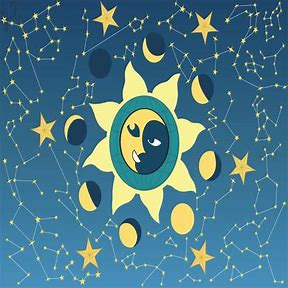
So this book was probably made for this Collector specifically, or any young Collector to learn about their species. I'd also like to comment on the fact that while the book may look impossibly long, the stone pages coupled with the large font greatly shorten it. This doesn't mean it's not long, just not as long as it first appears.
This isn't important, just thought I'd point it out.
Moving on:
The contents of the book
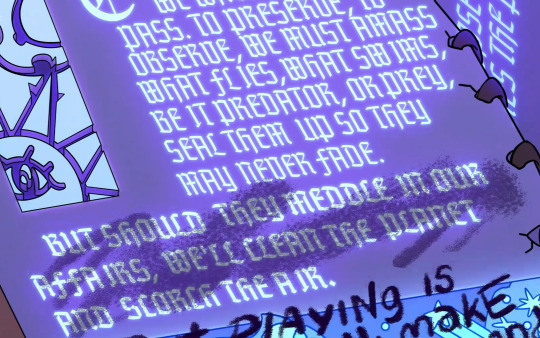
This scene confirms something very important, there were other Collectors
and from the looks of it, they weren't very nice. More on that in a moment

The people depicted here are probably the ancestors of the Titan Trappers, seeming to worship the Collectors. But considering the Collector's tendency to wipe out anyone in their path, this isn't surprising. They seem to gain followers through fear, the type of fear they twist into awe and worship.
I find this especially interesting because Belos gained followers in a similar manner, fear turned to worship. First of all, I'd like to acknowledge they are still very different. Belos's rise to power came about through manipulation and making everyone believe he could lead them to a better future, while the Collectors probably scared everyone into submission with the idea they could take down any who go against them in an instant.
But while their origins are different, they grow into something very similar. By season 1 and 2, Belos was forcefully gripping at control and using his powerful position to either capture any who rebel, and to invoke worship in the rest. Maybe I'm reading too far into it, I don't know.
Additionally, each group were trying to destroy an opposing species. Belos with witches and The Collectors with Titans
Long story short, The Collectors inspired fear and turned it into worship. Belos did something kind of similar. Also, Boscha and Kikimora also established a tyranny in this episode. Just some food for thought
Back to the book, the section that the Collector crossed out hold some heavy implications.
("But should they meddle in our affairs, we'll clean the planet and scorch the air")
Not just the ones who opposed them, the planet itself.
The Boiling Isles would be an empty mass of boiling sea if it weren't for the titan's carcasses. Without them, there would be nothing there. What if this is because the Collectors reset the planet, burning away anything that once rose above the sea and raising the ocean's temperature to boiling levels in the fire.
Or at least that's my interpretation
So, based on the information we have, the Collectors may or may not have had the power to wipe out an entire planet. Yet, they seem to have been completely wiped out alongside the titans, except for just one of their young.
We know a titan was the one that sealed away our Collector, so we can assume that it was an evenly matched battle, the two species wiping each other out. (King and our Collector probably can't reproduce, so their as good as extinct)
Okay, at this point, we've figured out a rough theory on the Collector's history, but how does our Collector play into this?
It's made very clear that our Collector isn't fond of his predecessors. He's a kid with a lot of power and was probably bored by the other's ideas of doom and gloom and the tendency to destroy anything interesting.
So our Collector decided to start doing things his own way. It's clear he didn't decide to step away from the old ways out of sympathy, rather, it was because he's a bored, lonely kid who wants to do interesting stuff like play and make friends.
Does he have any role in the destruction of his species? We don't know. Personally, I think he was placed in the mirror when he was really young, leaving him with nothing but vague memories and a book to get to know his predecessors by.
I believe this because it would parallel him more with King, both of them not being able to remember their species.
I think if the Collector learned to listen to king, they could form a really nice, genuine friendship
#wow this got longer than I excpected#Not super long#but still long#feather says some stuff#I know I called this the most important scene#but I think we all know the TRUE most important scene#that's right#STRING BEAN#JSHDHSJKDJFDKDL#In all seriousness#I freaking loved this episode#I am definitely adressing all the other stuff later#the owl house#toh#the collector#toh the collector#Ramble/anlysis#for the future#The owl house#Feather says some stuff
409 notes
·
View notes
Note
I read your meta on the manipulation the Metatron used on Aziraphale, and it was such a great essay laying out every detail. When I watched the end of the episode it was early morning for me and I was super tired and I missed a lot of those details. What did manage to come through in my sleepy mind, was that I was very confused about Why This Happened? As in, I understand now that Az was manipulated, I definitely agree with that analysis, but I don't understand yet if this decision was foreshadowed anywhere in the first 5 and a half episodes. I haven't rewatched the season yet (too busy reading meta lol) but I was wondering if you had any thoughts on that?
I just feel like, other than Aziraphale saying in the first episode that it's nice sometimes to tell someone about something good you've done, now that he's not reporting to heaven, Az doesn't actually seem to care all that much in the present day about his old allegiance. I wonder if maybe that's part of the point? He didn't want Heaven anymore and so he wasn't thinking about it? After all, the show begins with Aziraphale enjoying his new life. As the interviews said, he's living his best life. Good music, good food, and the love of his life.
Because if that's genuinely the case, then perhaps the point of the season is that the soft gentle romance of the first five episodes is Who They Are, and it's just that Aziraphale was rushed and manipulated into something he genuinely did not want even a little bit.
Or maybe he always thought he could fix it, because of the Before The Beginning where Crowley said, "If I was in charge, I'd want people to ask questions." Maybe that planted a seed in Azi's mind. Maybe Azi does want to run Heaven, only in a way that Crowley could be proud of it again. Fix it FOR Crowley. Even though Crowley doesn't want that (and Azi maybe doesn't understand that yet).
I came into your askbox intending to ask a simple question about your thoughts, but I have instead written an essay and asked for one in return. Consider it a quick temptation lol
Temptation accomplished hehe - though a little later than I'd have liked. No though genuinely I love this sort of thing a lot and really appreciate all of it. Anyone please feel free to do this at any time!
But uh so. Since that first meta I've done a lot of stuff breaking down that last scene here and also breaking down Aziraphale and the minisodes from this season here. Both of these operate ascribing to the idea that Aziraphale has been threatened into pseudo compliance on top of the active manipulation the Metatron was doing to him. I'll admit this is the theory I currently favor. But, while that's something I find more thematically interesting and also in more narrative alignment, I do still think there's narrative weight to this on its own.
And I think in the case you've got it dead on with the idea of fixing Heaven FOR Crowley.
Most significantly I think this is viable in the way Aziraphale views Crowley. Like. We know he thinks Crowley is Good and that he has thought this for a very very long time. Arguably his instincts have been telling him this since even before he could consciously put it into words given that even as early as Eden he was being honest with Crowley - a thing he even then did not feel he could do with God Herself. Despite being Fallen, Crowley is safe. Crowley is right. Crowley is Good.
Despite is important here. Because it is notably not and. The lesson being taught here is not that Hell can be Good. In fact Crowley himself actively encourages this idea. I'm not taking you to Hell because you wouldn't like it. My lot don't send rude notes. I need a weapon that could destroy me to keep me safe from Hell. I'm a demon: I lie. A demon could get in a lot of trouble for doing the right thing. I'm a demon, demons aren't nice- You're an angel you can't be tempted. You're an angel - you can't do the wrong thing. All of these things in culmination with the way Crowley talks about his Fall to Aziraphale - I didn't really Fall just sauntered vaguely downward - sets Crowley up as unique in the way he transcends what he is.
Meanwhile Aziraphale has been learning the hard, slow way that the people running Heaven do not necessarily have good intentions and more critically that they are not in alignment with what God actually wants. The problem is the management. The angel who would become Crowley said as much himself.
He has every reason to believe they fix it together too. He now knows that together they can perform archangel tier miracles while they're both actively trying to hold back. He knows that even when they're making mistakes and fumbling through the apocalypse they can help defy the world ending. He knows that they are perhaps the only two beings alive that even remotely understand God's will.
So here's Aziraphale given the opportunity to put himself in charge along with theoretically the single most Good being he's ever met. Of course that's appealing. You could give the person you love the power to create again - something we are explicitly shown at the beginning of this season to bring the angel that would become Crowley more joy and delight than we have literally ever seen Crowley have on screen - and the power to create a world together that actually deserves to have that person? You could undo something that you've slowly been coming to terms with believing should have never been done to him in the first place? You could be Adam, rewriting the end of the world and making it so the Bookshop never burned. All you need to do is change the color of the paint job.
Because he'd never change Crowley. He loves Crowley. Crowley is Good already it's not about making him better. The bit with the Bentley is the scene this season that encapsulates this sort of worldview most. Aziraphale changes the color of the car (which is being presented to us as literally physically linked to Crowley) but not the model. He changes how it looks just like Crowley changes into angel wear without a second thought. Neither change the core of what they are, just the aesthetics. And Crowley is always trying on new aesthetics without letting them change who he is. From Az's perspective why would this be any different?
He doesn't realize that sometimes even if you make it so a Bookshop never burnt that doesn't mean the memory of it doing so ever leaves. You still line the shop with fire extinguishers. You still swap to battery operated candles. The memory lingers as they always seem to do.
Crowley can't ever go back. Won't ever go back. Because the trauma of the Fall draws a clearer line for him both in his own identity and in his worldview than it ever could for Aziraphale who came to his own much more slowly. And because of that it's easy to see a reading of Aziraphale that can't see the specific way what he's saying eats at all Crowley's insecurities because all he can see is what they're capable of together and how that aligns with the greater good. It's all part of God's plan, just like they've always been.
#good omens#gos2 spoilers#good omens season 2#good omens spoilers#i still prefer the lying theory but i can definitely wrap my head around where this version of Az would be coming from#answers#good omens meta#sure lets throw that tag on#aziraphale#crowley
145 notes
·
View notes
Text
ERICSON'S WALLFLOWER
or bpd as a twdg fandom essay, & violet's analysis
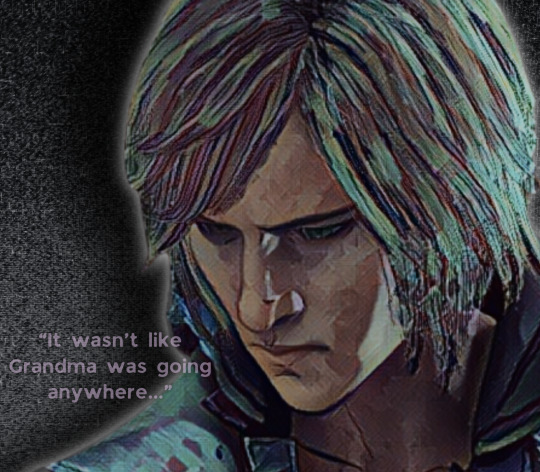
[Mar.26-29.2024 | 27,991]
Throughout my time spent within the TWDG fandom—since late 2019, early 2020—, Violet as not merely a love interest but a character exists as the fandom’s staunch polarization. And the funny thing?
I get it. A lot.
Much of what I’ve read into this character has been extrapolated from my own experiences, and those experiences speak to an inherent, polarizing chaos. It’s something that’s quite honestly a purgatory to try and articulate—I have tried—, and another bane to hope that people will get it. At least, enough to not just sweep my words under the rug. This essay is ultimately a trial to see if I’ve done enough work with myself, both emotionally and in writing, to be able to explain this to those none the wiser, or to the some who feel the same things, but have yet to hear it spoken with absolute clarity.
Through a fandom essay, no less. Specifically about a video game character who grows on people—Louis promises so.
Borderline Personality Disorder.
Nobody really likes to talk about it. Too many times in my life, I’ve had people sweep it under the rug because it is not a pretty thing, in times where I was pleading for help; often, in presence of the wrong crowd, it feels like a target nailed to my back.
It’s intrenched within stigma. And what’s difficult about that is…, yeah. I get why. There’s no mystery to it.
…yet there is so much people do not understand because not talking about it is so much easier, and the joke is, talk therapy is quite literally BPD’s primary treatment.
And so let’s talk about it. Allow me to pull away the confusion this disorder brings, and lay it out—as best I can—in a more digestible manner, through a deconstruction of Violet. I’ll have a little fun with it. However, if this essay reads in a more…straightforward tone compared to the couple others I’ve written now, it should. I’ve attempted to write this in a more lighthearted language before, but it didn’t really get the message across well, I would slip to this anyway, so. Yeah. I will still be conversational, just less so.
With that, however, this is another long essay. I hope you enjoy. :)
[Given the subject matter & the inclusion of my own experiences, take heed. This discussion is sensitive. W/ my experiences, I assure you I'm fine. I speak from a place where I’ve worked through my experiences.]
[Also, to stop-breaking-my-heart-telltale: I reference Louis and one of your essays about him, hence the @. But this thing's real long and about Violet, and stuff. Lol.]
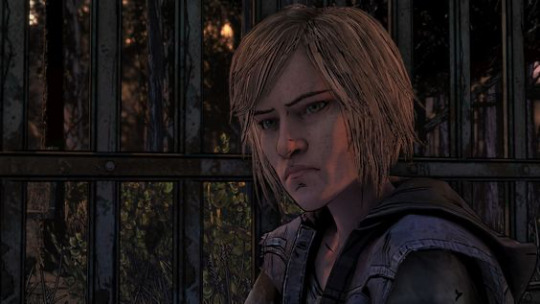
[Briefly, but Exhaustively, to Clarify]
Before any discussion of BPD, then Violet’s deconstruction, a few things.
One. No, I’m not outright diagnosing Violet with BPD. She isn’t diagnosed in the game. I’ve not heard anything by Telltale or anyone associated remark BPD either. None of the schoolkids, for the matter, are diagnosed because it’s not that kind of story. The most we’re given is a narrative that explores their patterns in behavior, and then one…“diagnosis” with Willy. That being the, uh, chronic masturbation. (No, I did not think masturbation would be included in this discussion, but here we are. Thanks, you bug-eyed child.) Even then, however, that was likely a symptom of a larger issue with Willy.
Instead, I like this character. I see a lot of myself in this character, recognize the patterns she exhibits, and I’m hardly the first to associate Violet with BPD—since though she’s not diagnosed…, she is a little bit textbook. I’ve also seen a lot of the fandom misinterpret, preemptively judge, Violet for the things she does.
And I don’t mean the confusion and betrayal players feel should they save Louis over Violet. That reaction is normal. Yes, feel confused and betrayed. Because that’s the intention. What I take issue with, and part of why I’ve wanted to write this for a long while, is the…undertones beneath what is generally said. The opinions, too, that go along with it. All of which, ultimately, feed into the stigma that BPD is so intrenched within. The ignorance, and the refusal to understand both why and how.
So I do this through Violet because I adore TWDG, I’m in a TWDG mood, and, she is actually a phenomenal example to use for discussions around BPD. No, she’s not canonically diagnosed, but, it is better to explain a character by using a researched concept, just as much as it’s easier to explain said concept through a fictional example.
…and myself.
This essay will have a lot of commentary based around my experiences. A lot of this disorder’s stigmatization makes it difficult to find good information to understand what it does—specifically from the perspective of the borderline personality, not observers—, because…it’s just not the same as ADHD or depression, which have been big talking points within the recent years. I also have ADHD—runs in the family. That said, conversations in mental health has its fair share of stigma regardless, it’s just that BPD…does not help itself, largely due to the concepts I’ll be going over.
Also, I am very similar to Violet, down to how we dress, but also in personality. We’re not the same, but there’s enough where I feel like I can explain a lot of this character in relation to BPD. Because it’s a personality disorder. In similar personalities, the disorder will—more often than not—present itself the same way.
This does lead me to a third: as much as I’d like to say that this discussion will be the absolute, universal truth, the reality is no, this discussion will likely have blind-spots. It won’t be universal. For a myriad of reasons.
BPD is, again, a personality disorder. Its expression is entirely dependent on the personality, and the experiences established. So anyone who is not an indifferent/apathetic person, who is more extroverted and not the marginal recluse that I am, there will be aspects of this that won’t align. The rudimentary concepts may apply, but the expressions and emotional processings behind these concepts may not.
This also bleeds into the fact that BPD overlaps with many conditions, and traits of the disorder can be found elsewhere. Which, quite frankly, is fairly standard for most disorders, because it’s about the expression and amalgamation of the traits, not the traits themselves. So, as I discuss BPD, you’ll likely find yourself relating to certain points.
Do not take this to mean that you yourself have borderline.
Well, okay. You might. There’s nothing wrong with doing research, and to evaluate all of your resources. Keep in mind, however, there is a difference between one condition relating to another, and one BPD relating to a likewise diagnosis.
BPD overlaps with many conditions (like ADHD); it shares many traits in others.
The reasons for it includes how BPD is developed, where the development will be alongside other conditions—like, say, PTSD—, or other conditions may predispose the condition—ADHD—, or, or, both.
And then, some of this relatability is due to language. There are limitations in the words I choose, especially when this essay is intended for a wider audience. When I say, I go from 0 to 100, you may know precisely what I’m putting down, or, your 0 to 100 is my 0 to 10. And there will be that barrier in understanding because…we’re different people, with different experiences, living alongside different conditions.
Some of you reading will just never understand what it means to get whiplashed by your emotions at the drop of a dime, where you’re perfectly fine one minute, and then you feel like you’re about to have a heart attack the next because someone said something, and you don’t understand why it hurt you the way it did, but it did, and you’ve already lost your shit, but you don’t want to do anything, but you can’t trust that you won’t… All…with the guilt that it is happening again, and you should have known better, and it’s all your fault…
Yeah. It’s okay if you don’t understand what that’s like. And to be quite blunt, if you don’t, be grateful. BPD isn’t fun for anyone. There are slight blessings, but those are gravely overshadowed.
Given that I do expect a lot of people reading this won’t understand, this essay will be exhaustive. I don’t really want to cut corners, even though certain aspects of my experiences will be kept to myself, and not everything about this disorder can be related to a video game character.
I do want to give it its due. The drafts before fell into the trap of not articulating precisely what I wanted, with the transparency I needed.
…hence why it’s long, but with that, let’s start with understanding BPD at its core.
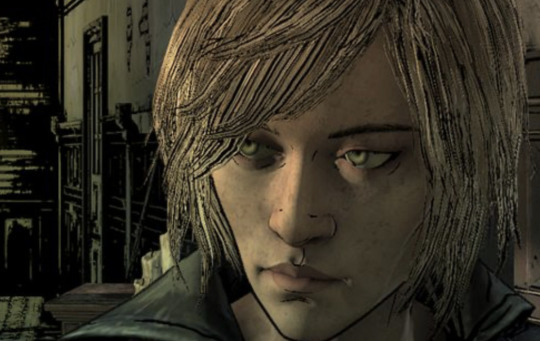
[BPD, in Experience, as an Introduction]
So. Borderline Personality Disorder.
Boiled down, it is purely the complete lack of, or, the severe impairment of emotional regulation.
That’s it.
That is literally all it is. And in understanding that, it explains (in part) how and why many of you may relate to certain aspects throughout this essay—emotions, and the (dys)regulation thereof, are integral to each and every one of us.
However, BPD is distinct, and I will comb through the how and why in this section. It is quite simplistic when boiled down, but this synopsis implicates everything about a person.
It is also. Not. Bipolar Disorder.
(Yeah, let me just kick this out of the way.)
Bipolar Disorder is about the brain chemistry, and is defined by manic and depressive swings.
Borderline Personality Disorder is a disorder of the personality. It’s systemic to the person. Could someone with BPD also have bipolar? Well, yes, which doesn’t help in the confusion, but to be the least bit informative, those instances often imply a specific BPD type (comorbid).
[Further resources will be linked at the end, for the BPD types, relationship with bipolar, and additional elements to come. For the sake of the essay, I won’t delve into this in-depth.]
This nuance—comorbid-BPD and bipolar—illustrates how complicated of a conversation BPD is. Again, it’s why this essay will be exhaustive, but also selective in what it covers.
Including, but not limited to, this kind of nuance.
To embark what a severe impairment/lack of emotional regulation means, it’s important first to establish the working definition of what emotions are—the definition, at least, which this essay utilizes.
Emotions are the reactionary senses of the body. Where sight, smell, touch, taste and hearing are the immediate feedback from the environment to the body, the emotions are the immediate responses to the stimuli, to prompt our actions thereafter.
Our relationship to our emotions is a very complicated one, because…we physically feel our emotions, which can be conflated with the feedback from our environment. Comprehension is also required to understand what, exactly, these emotions are signaling to us, because an environment isn’t just physical. Social, cultural, and psychological environments are included.
If you ever wonder what, exactly, a dog with the intelligence of a 3-year-old actually means, it’s their comprehension level of their emotions. These dogs are feeling the same emotions as a 3-year-old, and a 30-year-old. But there’s a catch: dogs don’t do the whole language acquisition thing like we do. Language acquisition being the learning process we undergo in our youth, because we are wired to speak and derive meaning through vocal, then visual, patterns.
I say this because a lot of emotions are, physically, perceived the same way, but we use language to distinguish one from another because contexts do matter. And they matter a lot.
Like, what’s the difference between lust and common excitement? They both feel similar, don’t they? But, lust is specific to a defined context.
And in this way, language absolutely contributes to the complexity of emotions.
But ultimately, emotions are just there to tell you what comforts you, and what doesn’t. It establishes what kind of environment you feel safe within, or at risk; the gradient within that establishes what you prefer, what you can tolerate. So the places you go to. The people you surround yourself with. Your interests. Activities. How you want to present yourself. Your morals, and ambitions. Identity and sense of self.
All of it is prompted by emotion, and your comprehension of that—ultimately through language—establishes how you respond.
How we actually navigate this is through regulation. Or rather, the process of self-comprehension, where an individual has to evaluate a situation, their internal reaction to such stimuli (both in thought and feelings), and the appropriate behavioral response. Dysregulation, then, is where that process is faulty.
So as we mature into adulthood, and our learned behaviors are set in stone (more or less; old dog, new trick or something), we’ve ideally learned how to comprehend these emotions, how to use language to articulate them and relay them to others, and find what is comfortable and what isn’t.
People get in the way of themselves, however.
For some fucking reason, we think we’re so fucking smart because we can talk, and we got thumbs, and we, like, stand on two feet. Or if we don’t got two fucking feet, we can build a wheely chair to sit our asses down.
And? We like to convince ourselves that we know better than our emotions, to the point where they’re disregarded. Of course, social contexts, understanding how your actions may impact others—those are all nuances which, yes, our emotions may not respect, but we do.
In regards to when people refuse to acknowledge emotions for what they are…
Piece of advice, from someone with BPD, emotions run like rivers. You do not decide what that river’s water is, how much there will be, and when it will flood. What you can decide is what canals to dig to retroactively contain that river, when to do that, and to establish how to treat the different flooding waters. You will drown if you think you can just ignore them.
Because the funny thing about water? If you fall high enough, land the wrong way, you might as well have hit stone.
In this way, emotions are devastating, and the mind and body has many mechanisms to deploy should an individual be constantly bombarded, and there is a need to prioritize our primary senses—touch, smell, sight… To prioritize a survival.
Take DID, for instance, where often it’s the mind “divorcing” itself into several identities in order to protect and shield the host from further trauma. There are many, many disorders like this where the brain deploys its failsafe, but that failsafe comes at a price.
BPD is, effectively, what happens when one of these mechanisms deploy, but the cost cripples an integral function to the human experience. It cripples the capability to dig those canals, redirect those rivers, and it can even imply a blindness to what kind of water is flooding.
…in many respects, this implies that BPD is, inherently, a disorder rooted in other conditions, just set to the absolute extreme. But when I say “absolute extreme” to someone who has never experienced emotional turmoil, the wrong impression may be impressed. Again, much of what I say may relate to your own experiences, and it’s why I have to take great care in articulating precisely what I mean because…it can be easily misinterpreted. Everybody has had moments where they are not in control of what they feel, and they do things. However, while the instances may look the same, the mechanisms, patterns and history behind them…are not.
Hence why BPD and bipolar are so often confused, because at the height of those disorders, it can very well look the same. I have had manic episodes that look identical to someone in a bipolar episode within one moment. But the differences are the mechanisms, patterns, and history. For these two disorders, it’s what’s actually going on in the brain, what stimuli we’re actually reacting to, and then timeframe. Mania in bipolar can last months; in me, I plummet into mania for minutes, or hours, or days—a week at most. And I can rocket right back out of it, back to an indifference, or into some other extreme.
And those mechanisms, and patterns, and histories are what make BPD, well, BPD.
We now get to how BPD happens. And though there is some debate, BPD is a developmental disorder. It’s created.
Through a number of factors. Genetics (like a family history), accompanying conditions (such as ADHD, autism, due to the predisposition to emotional dysregulation), past experiences of trauma, and, the environment.
And that’s the footnote version. Because this disorder, while there are strong patterns observed across diagnosed individuals, again has its nuances. Going into what causes BPD will lead you down a steep rabbit hole—in part because it’s dependent on the person, history, and environment, and in part because…, well, there is stigma, and there’s a lot of unknowns. Borderline, as a name, is not telling of what the disorder is. There’s a long misogynistic history to the disorder’s criteria, despite the fact that there’s a lot of men out there that have stunted their emotions, will fly off the handle when their egos are slightly bruised, call themselves alphas, are vehemently loyal to that alpha identity…
Hm.
That’s a discussion for another day. Point being, I cannot indulge this essay into every kind of way a person can land themselves with the disorder. It’s never ending. I have other priorities to indulge. Such as:
What kind of abuse is commonly attributed to BPD?
The answer? For such a volatile personality?
Neglect.
Funny, isn’t it? How neglect—the absence of—is what often causes BPD, of all things. Most would likely scoff, because our world has groomed the idea that the other kinds are worse, and are what creates monsters. Because it doesn’t make good tv, does it? Like the times where I was sat in time-out for…some reason or another, on a bench beside a chalkboard. Upwards to 10 hours of the day—which is a long time at three years old. That doesn’t make for interesting scenes, does it?
No. And because it doesn’t, and stories like their spectacle, media relies on the other kinds. To the point now where it’s necessary for our idled attention spans.
To be clear, this isn’t to demote abuse types outside of neglect, nor is it to insinuate that they cannot coexist within one circumstance. The fact of the matter is, different traumas with different people in different environments will lead to different conditions. There is no worth in proving to each other which trauma is worse or better, because it’s entirely dependent on the people and environment(s) involved.
What I will demote is the common, ignorant insinuation that neglect doesn’t destroy a person.
It’s why it is ironic, how BPD—an explosive thing—is often born from neglect.
How it does such a thing is…complicated. Lucky for this essay, I’ve lived it.
Within the first handful of years in my life, there were many things like sitting on that stupid bench in my room, for hours upon hours. My parents, at the time, were young themselves and fresh from college. My dad was in the military, so he had been deployed, leaving my mom alone with me, and…her BPD. I suspect postpartum made things worse.
Before you assume, it isn’t that she didn’t love me. Quite the opposite, but it was only through the divorce a few years later was she diagnosed. So, she didn’t have the resources for such a disorder at the time. Which made things worse, because part of treating BPD is being aware you have it.
The thing about these kinds of abuse is that…they come from the people you least want to admit, and for me, it had been my own mother.
And, the thing about neglect, especially mine, is that it’s hard to explain how no…, she was home. It wasn’t like she’d leave me like that. But, even so, I couldn’t tell you what the fuck she was doing when she wasn’t in the same room.
I was left to my own devices. I told myself stories with my stuffed animals to pass the time. I was often hungry too, and there are two accounts from family where, upon visiting, they saw this little toddler know how to work the baby-gate to the kitchen, and start to prepare food—sandwiches for me, and I’d pour food for the dog.
I seldom spoke, was borderline mute. Didn’t really converse until four. But I knew what people were saying before that. I did also pick-up behaviors from my dog as well; I would pant whenever I was happy, and whimper instead of cry.
By the tail-end, as I was getting into kindergarten, my brother was born, the divorce was in motion, and my dad would thankfully win full custody, and my mom, visitation.
You see, through those initial years, those mechanisms deployed.
I had to swallow down the instinct that the parent would be the one to nurture, and I had to find ways to feed myself, then my best friend and true guardian—the dog. Had to learn how to work things like a baby-gate. I also had to be vigilant of her, and know what mood she was in.
It’s these two things, working together, which utterly fractured me emotionally. The feeling of being hungry, truly hungry, is not something I wish for anyone. The realization that it’s not because you’re out of food—not until the separation began, and the weekends with my mom were marked by this hunger—, but because you don’t know how to get that food, and the bigger person is not getting the food, so you try to learn but you are still a small child… It’s even worse. It does something to you. Then, having to sacrifice your own emotional nourishment in order to keep an eye on an adult’s volatility is that final nail.
That was the first stage of my neglect. And it was bad. It was a really, really bad situation. My brother only lived with my mom for a couple years before Dad’s full custody. In that time, from when our mother was the only one to take care of us with my dad helpless in a different country, then to switching every week, he developed OCD tendencies, which are still present.
Twenty years later now, it’s been remarked that I was…kinda the best candidate to survive this out of not just my brother and I, but our cousins as well. And I agree. I’m naturally reserved, and even as a kid, I would push back against my mom. It would ignite her, but the fact that I was confrontation said enough. Meanwhile…, I do not know how the fuck my brother would be mentally if he’d been the one stuck alone with her for those three, four years. I don’t know what my dad would’ve come back to whenever he was allowed to be with his family.
And I would not trade places if given the chance. Because even if I’m a black sheep, my mechanisms allowed me to get away as well-adjusted as I could be.
But… Still. Beneath those remarks…, there is a misunderstanding. When my family says I was the best candidate, it’s because they look at me and see a person who isn’t sick. When I say I was, I mean…my brother would have been worse off.
Granted, now that I’m out of school, it’s slowly dawned on them that…yeah no. There is something wrong.
…as I aged through childhood, I didn’t quite understand what the costs of the mechanisms deployed were, but I knew there was something very, very wrong even back then. And I would tell my family. Every now and again, throughout years, I’d raise alarm because I realized I reminded myself of my mom.
Only to be told that I wasn’t my mother, and that I was overreacting. Told me that, “People like her don’t know there’s something wrong—that’s the disorder.”
Come a mere few years ago, and I am told about times where my mother, as an adult not long before having me, would break down because she didn’t want to be like my grandmother.
There was a family history. My mother knew it. However, she was also diagnosed through the divorce, because she couldn’t take care of my brother and I. Highly doubt admitting her BPD was the reason was because “she didn’t know there was something wrong.”
I was told there was nothing wrong. Meanwhile, I would do things I didn’t understand, and experience the world in a way people around me didn’t, …as it turns out.
For one, which is still true now, I cannot cook for myself, in a kitchen, when it’s dark out. I also cannot cook when someone else is nearby, or already in the kitchen itself. I will wait, because should I cook in those times, there’s a feeling. And I can’t stand it. The feeling of—
Oh. No, the feeling isn’t being watched.
It’s the feeling where someone may be lurking, and I’m about to get caught. This is likely a remnant of times when I was very, very young, and I tried to feed myself, and I…was caught. And she blew up.
There are other behaviors like that, specific to me. Because the body remembers before you yourself.
In the years after my mom, I found myself in the second phase of neglect—the one, I argue, is what actually creates BPD.
And again. For another time. It came from the people I least want to admit.
The neglect, the denial, in every alarm I raised did something to me. Another thing, though given my experiences, it also did feel similar to the first phase. My family loves me, I understand, and I get why they denied. Because they knew about what was happening to me, then my brother, but circumstances had them trapped in watching from afar. A sort of…they didn’t get to me in time.
My mom was also a nightmare for my dad. So…, to see that resemblance is not something anybody wants to admit.
But still. I was in therapy (to socialize me), but that didn’t last forever, and people kinda just shrugged and thought it was good. The therapy did its job. Without noticing what was happening.
The mechanism that deployed was still there, never to be acknowledged. So it festered. It scarred my trauma over, and now, there’s a great blemish on my mental health.
And that blemish has a name, and it’s BPD—the disorder cultivated by the neglect of an aftermath. Where trauma struck, and there was no chance given to process it effectively, and to heal.
All of the nuances I’ve discussed before remain to be true. From what I understand, however, is that the primary reason why Borderline Personality Disorder can look so differently on so, so many people, through a range of traumas is…it’s consequence. BPD has its characteristics, the ones that distinguish, because ignoring the recovery after significant trauma presents itself the same.
Now, I’ll indulge in one of these characteristics.
It wasn’t until recent, as I embarked my adulthood, where I realized the core mechanism I had inadvertently deployed, the one that came with a price:
Alexithymia.
Or, emotional blindness.
This in itself is not considered a disorder, largely because (and for the sake of this essay) it is an associated symptom, a mechanism, of many, many conditions. Depression, PTSD, eating disorders, ADHD and autism (again), schizophrenia, and I can go on, and on, and on.
BPD is included, of course.
There are many ways to be blind. Take visual blindness, where it can be an absolute void, a severe impairment, some colors recognized but not all, or, there’s too much feedback at once, and the light becomes illegible. Being devoid of emotions, or apathetic, is the standard; some people may feel a perpetual onslaught that cannot be deciphered, and others could find themselves in between.
Whatever it may be, alexithymia is characterized as the impaired awareness, explicit identification, and/or articulation of one’s feelings. So, as long as the shoe fits, and the person can’t decipher, convey/express their emotions… That shoe’s not on the wrong foot.
In my case, I fall into the standard.
When I was young, I likely stifled my own emotions in exchange for vigilance. It never left, however. If anything, it got worse the more I neglected recovery. Now, I don’t feel much, day to day. I know I experience emotion, and react to my environment, and have thoughts… Yet, the environment is almost dreamlike. It doesn’t quite register, and the people in my life feel like figments unless I’m right there with them, in the same room. I’m indifferent to most. Memories are a lot like this too—not like I don’t remember anything at all, but in the moment, I kinda just exist. I can think and plan about the future too, but it’s that I’ve realized I have to, not that I feel any kind of urgency.
Because I don’t care. At all.
Or, I do, but there’s nothing in here to tell me that. Because my body, also, is quite null. It doesn’t tell me what I feel. I couldn’t tell you in the moment, so I’ll usually resort to, “I’m fine.” And inside this head of mine? Not much. Kinda like static—the tv is on, there’s a lot of channels going, but it’s just…not there. Beyond static.
So as I write this, and write any of my works, it's less of spilling all the crazy thoughts inside my head, organizing them, and more of me spilling an open wound I don't know how to close, figured I don't really want to close it, because I kinda just like watching it spill across the page and see what I'm thinking, and what I can create.
To be quite honest, being a writer in this way does legitimately feel like I'm a blind sculptor.
If all this sounds like a depressing experience, I'm fine. Genuinely. I am. This is actually quite comfortable for me, and it's also me at my most rational. Plus, it helps that I've developed a fairly strong coping means—this writing thing—that serves to be a therapy in emotional comprehension. Another mechanism, really, that is derivative of what I did as a toddler.
I'm also a hermit. I'm content with being reclusive, and to myself.
And again, I’ve already processed all of this. I wouldn’t be writing this essay otherwise.
So how does alexithymia relate to BPD? In what way is being apathetic mean I can fly off the handle?
What does alexithymia mean for an episode?
BPD episodes vary. Depends on the person, and a trigger, and the environment.
In the traditional a switch is flipped, and the person just loses it, it’s via said trigger. A legitimate trigger, not whatever TikTok is blabbering. Trigger as in to a gun, and it just takes one pull, and you’ve been set off.
When this happens—BPD or not—, it effectively shuts down the reasoning part of the individual’s brain, and sends them straight into fight-or-flight. They are in a very primal state, and will react on emotion alone.
In BPD, our brains are wired to do that in (potentially) a very, very short period of time. Can be literally a blink and you miss it. There’s a look in the eye. If you know, you know. It happens enough times to establish a history of this within the person. Forces people to walk on egg shells to avoid this. Because it’s scary. It can get scary.
Here’s the thing:
It’s scary for us too.
Not too long ago, a lot of changes happened in my life, and on my birthday, I was driving, and I wanted, so badly, to just swerve off the road and down into the woodland—the ditches would’ve been steep enough. Woke up that day wanting to. Didn’t understand why, but I also wasn’t asking because that reasoning part of my brain was switched off. That day, the episode wasn’t explosive, but had I brushed upon a trigger, or someone accidentally said/did something, it would likely have been the case.
I was in an agitated state—straying down the line between stability, and not, where at first glance I’m fine, but…the more you look, there’s something quite wrong.
I was also craving McDonald’s. So I went. I sat myself down on my own, and ate my food.
And suddenly… Literally nothing was wrong. Well, no. I was still mildly stressed from moving from college, but, nothing was wrong that day. I was just hungry, not suicidal. Yet…it felt like I was. Had me believe it for a hot minute.
Had I not had the burger, fries, and McFlurry… I don’t know. Had I had access to something swifter than a car. I really don’t know.
This is what the disorder does. This is why it’s scary for the people around, and terrifying for us.
And in those like me, where everything is null, until it isn’t, it’s terrifying in a specific way. Goes from 0 to 100. Can get to the point where I have pain shooting down my arms, like I’m about to have a heart attack, because everything comes down upon me at once. Or, in episodes like the one I just mentioned, it creeps up on you—that agitated state. To the point where I don’t realize I’m in it, just that I’m suddenly hyperaware of everything, and there is something wrong, but I am not asking why because I can’t. So I just do. Quite blindly. And eat because driving off a road is too much effort.
So it gets scary. In those like me, where emotions just aren’t registering, I can’t tell you what I’m feeling until after the fact, or after considerable thought. Which is also fucking difficult because I don’t rightly know what I’m thinking. But given the situation, that could be too fucking late. And if the situation has me alone, to myself?
With BPD, there are triggers we know to avoid because they are related to traumas. There are things that wouldn’t normally trigger, but somehow did because they were the straw that broke the camel’s back, and we didn’t even know we had a fucking camel. And then. Sometimes. We don’t even know what the fuck the trigger was, and will never know.
The last is very common when we’re unaware of our BPD, but…it also just happens sometimes as well. The world’s big. The shit life yeets is limitless. I dunno.
There’s also a humiliation to an episode. I don't know what's going on. I can't reason like I should, and I don't want you to look at me. I want you gone, especially if I have deemed you the trigger. I want to be left alone. Things will escalate, and escalate, and escalate until that is achieved.
And, there’s a guilt as well. Especially when you know you have BPD, because by then, you should know better, but apparently, you don’t.
This all sounds quite helpless, I realize. However, there’s a reason why talk therapy is the central form of treatment for BPD. Knowing how to communicate does wonders. For those with borderline, learning how to comprehend and articulate emotions, and knowing what triggers to avoid, is a long, arduous process, but it helps. In regulating emotions as best we can, and in explaining to people beforehand what to do—or after the fact, where it’s to explain it wasn’t their fault.
And for those without BPD? Being able to recognize the warning signs on a person is detrimental. Because, believe it or not, there are warning signs. Sometimes they could be the split-second before, however, if there is someone in an agitated state, knowing what that looks like means you know how to avoid an episode, and it gives room to be able to console the person beforehand.
As said. There’s a look in the eyes. I know, because that’s what I spent my first few years of life figuring out.
The arduous process also unveils the…ambiguous sides to BPD. The stuff that people don’t really talk as much, whenever BPD is brought to the table at all.
For this essay, I will spare a glance at identity. No, identity doesn’t have much to do with Violet. However, acknowledging this ambiguous side to BPD establishes just how far this disorder goes, and it tends to crop up when least expected. (It will do so in this essay.)
A disorder of emotional regulation implicates everything, and sense of self is guided by emotion.
So what happens to one’s identity if there’s no guide to that sense of self?
It’s bleak. Or there’s a turbulence. Either way, it’s hard to decipher what exactly you want out of life, and for yourself, because there’s just no good way to tell what makes you comfortable, and what doesn’t. But you still strive to find stability. So you mirror those around you. To blend in and be accepted. By chance, it can extend beyond humans; me mimicking my dog—panting when I’m happy, whimpering when I’m sad—, it was probably so that my dog would console me when my mom wasn’t around. Because my dog (a lovely boxer) was very attuned to me.
The conversation with identity is…just another complicated thing. And this one is harder to articulate, in part because it’s not really discussed by people who don’t have the disorder. As opposed to the mood swings.
All that to say, when it comes to this analysis, the truth is, there’s not a feasible way to explore the nuances such as Violet’s relationship with identity, or alexithymia, because they aren’t spoken aloud to give us enough insight, and by proxy, these aspects of BPD are not what Violet represents. But acknowledging such nuances provides a better understanding in what this disorder means.
Regardless, Violet is a representation BPD in relationships, and the dysfunction of those bonds. How it’s exacerbated within an apocalypse, and then the self-treatment of.
Or, or, Violet has…a tendency to be a wallflower. More or less.
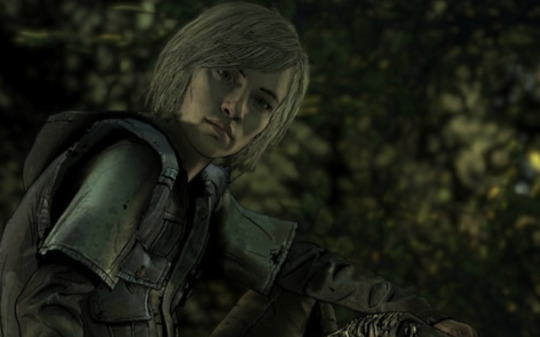
[Ericson's Resident Wallflower]
The Final Season (TFS) is particular when it comes to Violet. It will be evident throughout this essay, the care that the game and the team behind it devoted for her. From the dialogue to her actions, Telltale did well in illustrating this character. I will argue, however, that the quiet intensity in nuance laid throughout is what evoked the need to write this essay.
Because Violet represents something quite thoughtful in regards to mental health—the reality of what a disorder is, and what it can do.
So TFS is particular, and it begins with her introduction, where there’s this need to recontextualize her. Not once, but twice.
Clementine is first introduced to her silently. She follows Marlon out into the courtyard, and Tenn whistles at the wall.
Because on the school’s wall is a girl, and she rises from her lounging at its height. There’s a glance shared between Clementine and Violet, before Clementine speaks more with Marlon. After that, another glance, where Violet turns away—not before the player can spy a bit of intrigue in her face.
Clementine reunites with A.J, meets Louis, before a recontextualization, where Violet (she does talk) snarks about the crashed car, and the walkers that the accident brought to their door.
And it takes Louis to pry a proper greeting from her:
“Ahem. ‘Hello, Clementine. I’m Violet. Nice to meet you.’”
“What he said.”
[. . .]
“Don’t mind Violet. She, uh…, grows on you. I promise.”
[Ep.1 | Done Running | School Gate]
Good job, Violet. Way to be sociable.
Sarcasm aside, yeah, it’s a little rough. Violet is overall dismissive of Clementine, save for the comments. To the point where she has Louis introduce her ass.
Now Louis…is a quiet presence throughout this essay, though he is all the more integral to her character. There will be fewer words compared to other relationships, but those words signify a unique dichotomy between him and Violet, one that the other schoolkids—Minnie and Brody included—do not have with her.
And it starts immediately. That dichotomy. Louis is the one who tells Clementine Violet’s name. He is the one who formally introduces the two. Because he knows how Violet is. Ensures to lingers so that he tell Clementine—promise her—how Violet is worth sticking around for.
It’s just that the girl is troubled. So.
Thereafter, his banter is teasing, and Violet is still sardonic. But, she ultimately does play along. In her own way. When in the woods, and the schoolkids are focused on clearing walkers to have Aasim, Brody and Mitch make a safe return, Louis strikes the conversation, Violet scoffs, but can relent depending on the player’s dialogue choice(s). It is important to note that Violet scoffing doesn’t necessarily equate to her being mean; it’s clear through the card game later that…this is her way of banter, with Louis especially. She takes jabs at him. He retorts. Does the same. It’s on equal footing.
The next true recontextualization presents a taste of what Louis means. After clearing the walkers, and A.J socks Marlon, Clementine is left to acquaint herself with the other schoolkids. Mitch and Willy, Omar and Louis, Aasim, Ruby (where A.J apologizes for biting), and Tenn, right alongside Violet.
And those two are tending to the school’s makeshift cemetery. It brief, but Violet explains they lost the twins, and for the hour, they’re paying their respects.
From the wall, then the gate, then here, at their burial ground, it’s as though TFS wanted to scatter Violet’s introduction across her nuances. First it’s a silent couple glances, with her overlooking the courtyard at a perch, then it’s her being a little prick at the gate, a lightheartedness when mowing down walkers, and then it’s…this, a staunch vulnerability to and for her people. In context to the graves, her people being the twins.
All the moments that night thereafter feed into this. The card game goes back to an apathetic, yet also teasing, demeanor. Her shared conversation with Clementine, as A.J becomes an artist draws, it’s again a vulnerability, this time rattled by the fact that the dorm was once the twins’.
Throughout this first episode, Violet’s standing with the rest is shown to be quite reflective of this almost inconsistent preamble.
Marlon is the most succinct when he remarks, in the rain, after Clementine chooses to ask for Violet’s support:
“Violet being difficult. Why am I not surprised?”
[Ep.1 | Done Running | Courtyard]
It’s such a blunt statement, intended to dig at her.
Though, there is truth to it. Violet’s introduction overall says as much. She admits it herself when in the dorm, and she finds that Clementine is housed where the twins were.
“Honestly, I just miss having someone around to talk to. [. . .] And I’m not, exactly, like…a people person. You know? I know I sometimes have a habit… Have a habit of being a little bit too harsh.”
[Ep.1 | Done Running | Dorm]
Violet is not sociable, so naturally, she struggles to find someone to talk to. But, she is also sardonic—that much we got from the gate, even if it was followed by Louis’ banter which she reciprocates.
But ultimately, it’s Brody who gives the best context to Violet, and really voices what Louis is getting at.
When Clementine goes fishing, Brody begins a conversation, and within that, she can reveal based off the prompts:
[She’s…intense.] “She’s always been a little bit like that. But after the twins died, she really closed up.”
[It wasn’t your fault.] “Still, I was the one that had to break the news to her. And ever since I did, she’s become distant.”
[Ep.1 | Done Running | Fishing Cabin]
There’s two key things here, starting with the unsociability that Violet’s demeanor and Marlon’s slight reference.
Then, the revelation that Violet has closed herself off. She’s become distant within the past year.
…it implies that the Violet first introduced to us is not truly Violet, in a sense. It presents to the player thatmuch of her arc with Clementine will be about uncovering her, and really bringing Violet from this depressive spiral. Romantically or platonically so. And these lines are intended to both explain the character, and to incite enough intrigue for the player to follow Violet down her route.
But it’s rather unfortunate that so much of this character is hidden away from the start, because there's the chance that people glance over her, take this initial Violet as Violet, and decide to spend more time with Louis and follow down his route. Because, for the sake of this essay, it's damn near impossible to really appreciate this character when you don't go with her route.
Same can be said for Louis, of course. But, respectfully...
It ain't about him. So. Moving on.
Playing leader.
When Marlon is shot, Violet immediately jumps into action to protect Clementine and A.J from getting jumped by the rest, and she assumes the leadership role. Regardless of player choice. There is an curious point with her being a leader, though that will be set aside to explore later.
Instead, I’ll side-step, and bring about a piece of conversation upon Clementine and A.J’s return. In this, we gather a very telling side of Violet, one that speaks volumes to her character.
[Clementine] “You’re sitting in Marlon’s chair, aren’t you? You’re their leader now. They’ll listen to you.”
[Violet] “They don’t, though. They only listen when they want to.”
[Ep.2 | Suffer the Children | Office]
Again, we’re side-stepping from the playing leader thing. Violet says that they don’t listen to her—says it like it wasn’t a really a surprise, just a point of frustration. Because, of course, Violet’s difficult. The last leader said so. But also, none of them have stepped up to fill that role. They take issue with her, but none of the schoolkids have really challenged her to take the mantel for themselves.
The silent nuance here is…why is it that she’s the leader? Violet made it seem like she really didn’t want to be at the boarding school—what with the contention between most, then the fact that she’s still in mourning. Tenn appeared like he was the only one keeping her there, but by stepping up in this way, not necessarily.
His presence and her need to protect him is a huge factor. Absolutely. Just not the only one.
We return again to Louis, the one schoolkid with the shared dichotomy. He is the other love interest. Him and Violet are often on opposite sides—especially in regards to everything Marlon.
And yet…, the way they speak about each other when one is taken away says everything about such a dichotomy.
To start, we’ll look at Louis:
“I know I’m always teasing her. Trying to get her to do that one eye roll she does—you know the one. Where it’s like, ‘you’re such a dumbass,’ she has to do a full-body eye roll. I do it because, when I actually do manage to make her laugh, it’s worth it. If I needed her, she’d be there. Meat cleaver in hand, ready to chop someone in half if it meant protecting me.”
[Ep.3 | Broken Toys | Dorm]
He brings context as to why their banter is so dogged to tease. Louis does it because it’s reciprocated once he gets under his skin, and she retorts back with the signature full-body eye roll, but also, because he’s striving to reach another side of her, one where she laughs.
Because Louis is a big entertainer. He craves to draw that out from people, so when he has someone like Violet where it’s not easy to do that, it means that much more when she does, because it tells Louis how despite everything, she is there, listening.
Then there’s Violet, and her words for him:
“You know, when I first got here, I hated him. He was so…much. You know? He walks into a room, and it’s like, ‘Look at me! Watch me perform!’ It’s so stupid. But then I realized, under all that, he… He really cares about people, and he doesn’t just feel it, he says it. He’ll tell you every goddamn day how much you mean to him. Shit, he’ll probably sing about it. [. . .] We’ve got to get him back.”
[Ep.3 | Broken Toys | Dorm]
She nods to Louis being this big entertainer. Says that she hated it, and that it’s stupid. And yet, Violet thinks fondly of how genuine of a guy he is.
And between these two quotes, there’s a mastery in storytelling, because there’s an active dialogue between Louis and Violet. Doesn’t matter if one is on the boat, and they’re not. Their words parallel. Had they been in the room together, this would’ve been a back-and-forth.
Louis says that he teases her. Tries to get underneath her skin. Violet says that hated it, and hated him, for his antics. Yet, she then admits that…there’s a genuine nature there, because Louis does care, and he will say and sing it so. That genuine nature is the fact that he just really wants Violet to laugh, and to find that side of her.
Because Violet’s his friend. He values Violet as his protector, because Louis knows that she will be there whenever he desperately needed her.
And Louis is Violet’s friend. Which is why, without a word from Clementine, she states, firmly, that they need to get Louis back. Because in that hour, he was in peril, and he desperately needed Violet’s cleaver at hand.
It’s a tragedy, really, for both. When the other is taken, the one thing that each praise of the other is what’s stolen. For Louis, his knight is blinded; he has to be the one to protect her. For Violet, a comfort goes mute; she can sing in his place.
After spending a few moments with Clementine in the dorm, there’s Ruby’s hootenanny, and through that hootenanny, Violet can tell Clementine what brought her to Ericson’s:
“I spent a lot of time at my grandma’s house growing up, what with my dad being a drunk and my mom working three jobs. But after my grandpa died, Grandma just kinda…shut down. Spent all day and night rocking in her little chair in the den. I’d sit there at her feet as we both watched tv, mostly cartoons, since she never seemed to care. Sometimes I could hear her crying, but I didn’t look back. I’d just feel really weird and turn up the volume, you know?
“Anyway, one day she left the den and came back with another chair, and a .22 rifle. Set the rifle butt on top of that chair, holding the barrel back to her chest. So, you know…, she had trouble reaching the trigger this way, but she must have known it would happen… Because she took out this really tacky wooden backscratcher—the real long kind with the one end shaped like a hand—and used that to push the trigger in. So…yeah. Bang, right? Her body folded up and just…kept rocking.
“My mom came to get me five hours later. I hadn’t moved. She asked why I didn’t call the police or an ambulance or anything. I just shrugged and told her it wasn’t like Grandma was going anywhere…, and besides, I just wanted to finish my cartoons. She shipped me off to Ericson the next day. I was eleven.”
[Ep.3 | Broken Toys | Piano Room]
Through all of what Violet tells Clementine, there is still that flare to make the story more interesting for, you know, a video game. It’s a violent kind of neglect she shares.
But it is neglect all the same.
Violet was born to an alcoholic and a mom who stretched herself thin to compensate, yet even so, she later can admit that their home was a trailer—so the income of three jobs, all her time spent away from her mom, wasn’t enough. Perhaps there were financial troubles. The money might’ve been all drained away by cans of beer, or bottles. Violet did have an escape through her grandparents, though that didn’t last, and she was trapped to the same neglect. This time, with a better house. Probably.
Until her grandmother went and shot herself.
…with Violet in the room. Right behind the child.
And? There was no consolation; she was sent straight to Ericson’s, where the apocalypse then struck, the adults left, and Violet…was the difficult one, designated as this wallflower, or buzzkill. There were the twins, Minnie especially. Yet, even then… That relationship likely wasn’t reciprocated.
The flare that TFS adds to why Violet found her place in troubled youth—the violence, which could’ve dashed the screen she watched for those five hours—, it hides much of what went wrong with her, but simultaneously, it defines the gravity of her childhood.
It describes a mechanism of hers. One undoubtedly developed from her times alone with a drunk, whenever her grandparents and mother weren’t there. A sense of apathy, and with it, a broken moral compass. To not mind yourself, and not get in the way. To let it happen, and just get it over with, in whatever way that could imply.
And, with the sheer gravity, it begs the question…, how far did that neglect go? All of the abuse, if it wasn’t the only kind. Children aren’t born to sit in one place for hours, with fresh gore rocking in a chair behind.
The question wasn’t answered, of course. She was sent away instead. Then there were the adults. And then, other schoolkids. Violet isn’t…a people person, you know, so it’s only natural for her to be the difficult one as Marlon says.
Still, however, with Clementine as they watch the stars together, Violet denotes for the bird constellation,
“A bird is free. It could go anywhere it wanted to. Up and up and up, and never come back. Go south, east, west, doesn’t matter. You could fly straight into a sunset. And see where it ends.”
[Ep.2 | Suffer the Children | Belltower]
And to that,
[Clementine] “You wish it was you, don’t you?”
[Violet] “Sometimes, when it all feels so heavy down here, I can’t help but wonder what it would be like to be weightless.”
[Ep.2 | Suffer the Children | Belltower]
Violet has struggled to belong, and yet, she remains. Yes, there’s the apocalypse. However, in all the years at the school, she could have left just as well. There’s a version of her, lost in development, where Violet does leave had she not been saved.
So why didn’t she?
The answer to that, quite simply, is one Louis may admit to Clementine, should that version keep his tongue, and the silent nuance behind her playing leader:
Violet is too loyal to her people to leave.
It’s why Louis teases her, to try and find that laugh, and why he knows that if he needs her, she will be there to protect him. Violently, with a meat cleaver.
It’s why she takes charge, because Violet knows none of the others wanted to, but they needed someone to lead. Whether or not they appreciated that it was her.
And, it’s why she acts without thought to stand her ground against Marlon. If she’s asked, the camera doesn’t leave her because it is no surprise that she will stand beside Clementine, as opposed to Louis, where he decides with uncertainty, and the camera has him shuffle to frame; for Violet, the change in her face is immediate. The camera doesn’t have the time to idle in tension. What Louis says is dead-on:
“If I needed her, she’d be there. Meat cleaver in hand, ready to chop someone in half if it meant protecting me.”
[Ep.3 | Broken Toys | Dorm]
Even if she isn’t asked, Violet will then stand her ground once Marlon is shot. She vouches for the outsiders, in the name of reason, and for the twins and Brody.
She doesn’t think when Clementine is in danger—didn’t matter that her and A.J are just exiled. Violet will do as told, trust Clementine—to shoot, or to run.
Takes the helm after Marlon. Backs Clementine every step of the way.
Cannot let Minnie go until she has to, and Violet has seen that the person she clung after is gone.
Violet is too loyal to her people to leave, for her loyalty unbridled.
It’s her strongest quality. It is, also, what marks Violet with borderline.
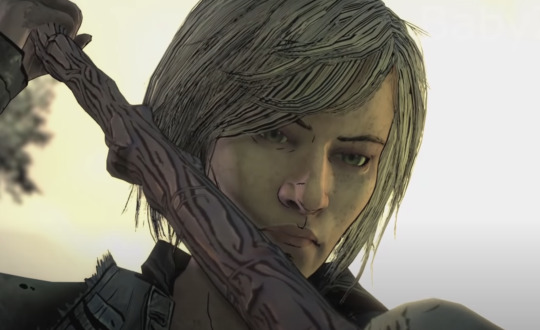
[Emotional Anchorage]
We slip back to describe BPD at large, beyond this essay and character. However, everything of this section has its place with Violet.
And it begins with emotional anchorage.
Emotional anchors are not inherent to BPD. It’s not unique to the disorder because, instead, I’d argue it is a universal experience. These anchors are anything which triggers an emotional response. These can be specific objects—like an old stuffed bear, a photograph, a house—, or stimuli—like a scent, a song. Tangible things like these are indicative of our nature. Humans like things. We like to collect, and tinker, and destroy. It helps if it’s shiny. It really helps when there’s fire or light involved.
Here's another thing about anchors:
They can be people.
They commonly are. It’s how we distinguish strangers from significant relationships—friends, family, partners. Anchorage is present despite the nuances between friends (just a friend vs BFF), and family (siblings vs parents vs offspring). And, partners—emotional anchorage explains how queerplatonic relationships come to be, because the fundamental element of a partner (being an emotional anchor) is present, it’s just the romantic and/or sexual implications are ambiguous.
Emotional anchoring is the process in establishing the anchor, leaving anchorage as this essay’s way to articulate the concept itself.
Borderline Personality Disorder will naturally encourage these attachments.
Within the community, BPD has a term: favorite person (or FP). It is as it reads. There is a designated favorite for us, and this favorite person can be a friend, a family member, or a partner—anybody, really. With FP, we begin to fall down the well in emotional anchoring as it pertains to the disorder.
Because, ultimately, a FP is either the strongest, or the only, emotional anchor an individual with BPD has. (For the sake of this essay, I will replace FP with primary/prime emotional anchor going forth, to be more consistent in word choice.) And the anchoring of this person is generally not intended. It just happens, where there’s a strike of intrigue, and everything follows thereafter.
The moment I anchor a person, it is a stark change from the indifference/apathy I display to I want to spend all my time with you, and I will literally die for you without a second thought. I will remember everything you value better than I remember my own, and I will present those nice things to you, at every opportunity. Tell me your favorite color once, and I will remember it for decades to come. Tell me to break my nose, and I may very well do it on the spot.
Which. Yes. Is intense.
Understanding the disorder behind it, however, allows me to take the precautions to…warn people beforehand. And to tell them upfront, if ever I am encroaching on boundaries, just say knock it the fuck off, Volt. In exchange…, I don’t take it personally. Because, uh, yeah. I can get intense. I understand. I may feel a type of way in the moment where boundaries are made, but that’s the BPD talking in my ear.
But also, I know I value someone being upfront with me more than a passive rejection. Frustration is what sets me off—the not knowing why—, not the rejection in itself. Because if I don’t know why, that’s how I interpret things as abandonment.
I have been rejected many times in life by people I’ve deemed emotional anchors. And it stung. A lot. Far beyond what I could ever articulate, but if I had to try, they are wounds carved to the bone, or with one, where my heart was quite utterly eviscerated.
There’s a deeper conversation there, with an anchor changing before my eyes. And, yes, it’s ultimately this which the essay will discuss in great detail. Through Violet.
Yet, before that, emotional anchorage is one of the few things that borderline has the chance to gift a person, because it’s not all bad. If you’re like me—where everything is null, and blurry, and static—, having a person suddenly there to awaken my body to speak, sharpen the world, and bring chaos inside my head… It’s a lot. It’s demonstrably a devastating thing, but in a very raw and beautiful way.
Demiromanticism, no doubt, is a reflection of how I express BPD. So to realize my demi ass has feelings, whenever it happens, is nice. …it also means I then have to determine whether it’s that, or a crush. And there is a difference between genuine feelings and a crush, and yeah, I prefer one over the other.
But. (And this can be platonic or romantic.) Having someone be that anchor grounds me, and while the relationship will have turbulence—because the boat I sail is on a river I can’t build canals for—, there brings such a confusing clarity to the world. I have a purpose where I didn’t think I did before.
It’s a high. A borderline addiction.
To not a thing, not a habit, but a person.
When it’s healthy, it’s everything, and I can brave all storms. When it’s not, it’s obsession and mania, it’s my boat trapped in a whirlpool with the anchor at the center of it all; I may break away, violently, or I will sink, and it will be the death of me.
…and when there’s no anchor there at all, I and my boat are to the whim of the river—because there are no canals, I have to rely on my boat to guide me and find an anchor. This can be where people turn to destructive behaviors. Substance abuse. Eating disorders. Everything alike.
Why though?
Why is it this way? Why do people like me sink their teeth and set anchorage like this?
This is where identity creeps its way back.
Because though anybody can develop emotional attachments, to the point of anchorage, BPD again does this to an absolute extreme. My personal anecdote may speak to it without debate. Understanding how identity gets itself involved further speaks to that extreme. BPD isn’t necessarily about the traits themselves, right? So rather, it’s how they manifest, and fester, and the mechanisms behind it all.
With identity, it hinges on what you find comfortable, and what you don’t. It’s guided by your feelings on things, and your comprehensive response thereafter. Passions turn into aspirations. Self-perception feeds into expression. And on and on.
So, if someone does not have a stable sense of self, there is a disturbance in identity. There’s no coherence to the person. Few consistencies, if any at all.
The identity is as stable as your regulation of emotions allow, and if it’s dysregulated, so will your identity.
A broken sense of self fractures a person. So we scour for stability. We do so in people. But with that broken sense, it’s easier to just swap out characteristics and emulate the environment, should there be a promise of stability. When this happens, it can be recognized as masking—because, debatably, it is—, but it can also go so far that people confuse this borderline trait with something like DID.
To those none the wiser, yeah, it might as well be DID. Because, like…, they just change so quickly. And if it’s a matter of mirroring different people, it can also imply that the BPD encourages the person to alter their personality depending on who they’re with at the time. Which. Yes. Has the capacity to resemble switching between split personalities from an observer’s perspective.
However. I have outlined (in quite the broad stroke) what DID is: a split in identities, in order to protect and shield the individual from further trauma. It’s dissociative in nature, where the distinct, established personalities will operate the individual at different times—given the nuances which come with DID.
BPD does come with dissociation as well—my personal experience with how I live day to day is indicative of, for simplicity, derealization and depersonalization. However, it’s not a split. What’s happening is this one identity does not have a stable, set personality. With the incapability to regulate emotions, it indicates a level of alexithymia. So how are we supposed to understand what we want, and don’t want, in everything from interests to moral standing? Things that a personality is grown from?
This copycat behavior is in itself a mechanism that BPD deploys. It’s kinda masking, not to purely to hide from and integrate into social norms, but also to find a sense of self through a very, very desperate act of scavenging.
In BPD, the best candidates to copy are the people who make us feel good—get a high from—, and that we want to be around, and whom we fixate upon—to a manic point:
Those emotional anchors.
As we go back to Violet, keep this in mind. Again, no, there’s no feasible way to remark for certain what her relationship with identity is like, so the implications that emotional anchoring has on identity can’t really be applied. But the intensity—the level of fixation—can.
Because Violet struggles in her bonds with other people. There’s an idealization present to those bonds, and a devaluation. Both this good and bad, the highs and lows, are via anchorages.
So we’ll start with Minnie.
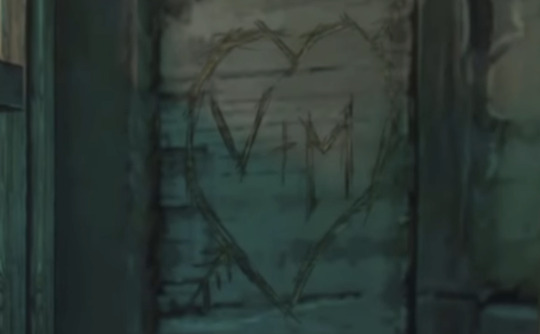
[Emotional Anchorage: An Obsessive Good Memory]
“Sophie was a good friend. And Minnie… Uh… We were close, me and her.”
[Ep.1 | Done Running | Dorm]
When we meet Violet, amongst her introductions, Clementine learns about the twins from the two who still tend to their graves—Violet, and Tennessee. Not long after, there’s a card game, and not long after that, Violet finds Clementine and A.J in their dorm.
The one which was home to the twins.
“Huh. I see you’re, um…, settling in.”
“Yeah. Is that okay?”
“Sure. I guess. I always liked this room. Sophie had, like, paintings and shit on the walls. Lots of color. And Minerva…, she was really musical. [. . .] She had the most amazing voice. Real bluesy. [. . .] That was a long time ago. After they… Afterwards, Brody and Tenn took down all the paintings. And that was the end of it. I shouldn’t have even brought it up. It’s not a good memory. Guess I just lost my train of thought.”
[Ep.1 | Done Running | Dorm]
The way she speaks of Minnie, there’s an adoration, and a nostalgia made bitter by the perceived tragedy.
Of course, those twins (…okay, well—) aren’t dead, they were traded. So even though Violet has yet to see Minnie, she is now a presence to her mind that isn’t nearly as bitter. She focuses on getting the school prepared for a fight, alongside Clementine, but through it all, yeah, Minnie is still there.
And when looking at the stars with Clementine, if Clementine remains quiet for the fish constellation, Violet comments,
“Bright, pretty, good with other people. Always moving, tons of energy. Sounds like anyone we know? The energy one is easy. Good with people, not so much. [. . .] Y’know, it… Well, maybe this is weird to bring up, but it reminds me of Minnie.”
[Ep.2 | Suffer the Children | Belltower]
Minnie is a big part of her, despite their time and distance from each other. They grew up together. They got closer.
Another thing:
Violet never says girlfriend.
The only time where it’s “proclaimed” by the season that Minnie and Violet were girlfriends is through Clementine, where whenever A.J sees the carving in the fishing cabin’s wall, she can say,
“It means they were a couple. [. . .] Violet was Minnie’s girlfriend.”
[Ep.1 | Done Running | Fishing Cabin]
Is it fair to assume that? Yeah. That’s…what carving a heart or potato with initials is supposed to symbolize.
But like.
Let’s be for real. What the ✨fuck✨ does Clementine know? Sure, she’s somehow not concussed after hauling ass in the sky, with a car. But she doesn’t know these people. Point blank.
We don’t know when this heart was carved. Just that it’s V + M (suggesting Violet did it, given the order), it’s out of the way from the school and in the fishing cabin, and it’s just shy from a bed (and alcohol).
Again, Violet herself never says girlfriend.
The heart could’ve been carved with Minnie there with her. Or, Violet was deep in mourning, and decided to brand the cabin—likely because it holds a significant memory.
…and Imma be honest, the cabin has a bed, and it is covered in bottles. Everywhere on the table. Some scattered around. So I will give the benefit of the doubt. Considering the…subtext around the fishing cabin, doing some quick math with my gamer instincts, yeah, if you leave youth (troubled or otherwise) alone, you might get Lord of the Flies, or…exploration. I guess.
It is clear that there was something. There is validity to “[w]e were close, me and her.”
The question then becomes why the ambiguity? Had TFS been made in a different time, and James didn’t have a boyfriend, and Violet and Clementine couldn’t be a couple, yes, it would’ve been Telltale beating around the bush.
Except even in this moment, Clementine outright says girlfriend in reference to a sapphic dynamic.
Because TFS was not made in a different time, James did have a boyfriend, and Violet and Clementine can kiss and hold hands.
The ambiguity indicates something else. That ambiguity is heightened the more Violet talks about Minnie pre-Broken Toys (saved Violet route). Because she speaks so fondly of her, with almost this conviction.
Yet…she still does not say girlfriend.
This is textbook. Given the essay, and what I’ve already exhausted over, it shouldn’t come as a surprise, but it is quite plain:
What Clementine stumbles upon isn’t a mourning over a lover; it’s instead, at its core, a lasting idealization.
With BPD, idealization is as follows:
“[A] way of coping with anxiety in which an object or person of ambivalence is viewed as perfect, or as having exaggerated positive qualities.”
[Verywell Mind | Idealization and Devaluation in BPD]
This tracks.
Violet speaks so fondly of Minerva, with almost this conviction, yet she does not say girlfriend. Ever. Because the conviction is the intimacy, but Violet is a pragmatic individual. Though there’s idealization present, referring to Minnie as her girlfriend (for whatever reason) is too far for even her mental state.
Like she mourned Minnie for a year. She gushed about her to Clementine every chance she got. So…why not say it?
With this all established, TFS then allows us to witness how idealization in borderline often corrodes into devaluation—the inverse of idealization, its absolute antithesis.
“Used when a person characterizes themselves, an object, or another person as completely flawed, worthless, or as having exaggerated negative qualities [. . .] because there is often no middle ground for a person with BPD. Feeling challenged, threatened, or disappointed can quickly cause them to devalue the people they formally idealized. Rather than cope with the stress of ambivalence, devaluing functions to minimize the anxiety caused by ambiguity.”
[Verywell Mind | Idealization and Devaluation in BPD]
This corrosion has a name. It is splitting.
Like with the previous definitions, I will allow my resource to explain this concept, because of everything this essay has to offer, it is this that the everything hinges on.
“Splitting involves an inability to hold two opposing thoughts, beliefs, or feelings. People who have BPD tend to view others in all-or-nothing [. . .] terms.
“This self-protective defense mechanism aims to help people with BPD protect themselves from getting hurt in relationships. By labeling people as ‘good,’ they are able to engage in relationships despite the emotional risks. If they feel threatened, they can then quickly discard the individual or the relationship by labeling them as ‘bad.’
“Like most defense mechanisms, someone with BPD may not be aware that they are engaging devaluation and idealization. Splitting is a subconscious way to protect themselves from perceived stress[, and] reflects the challenges associated with maintain an integrated view of the good and bad in a person under stress. Some researchers suggest that some of the difficulty is rooted in the way the brain, particularly the amygdala and prefrontal lobe, activates in these experiences for people with BPD.”
[Verywell Mind | Idealization and Devaluation in BPD]
…again, this essay has to break away from Violet and TFS to provide an insight, a discussion, of what this means for BPD.
I will start by clarifying that splitting from one end to the other is a bitch to deal with. The catch is not every person with BPD is incapable of reading the world beyond black-and-white. I’m one who can, …when I’m not in the midst of an episode. Day to day, I’m apathetic/indifferent—take your pick—, and because of that, I don’t give enough of a shit to really fixate on what is “good” and what is “bad” to me. I take everything as they go.
Because I really, really do not give a flying fuck.
The moment there is any seed of emotional attachment, or anchorage, it changes things. For me, it’s generally that I really adore this person, but they did something that hurt, and it confused me, so I shut down and close myself off. Namely so that I can have the time and space to breathe and process. Because I feel a lot for these people. I’ve gone over how intense that feeling is. And the last thing I want to do is hurt them.
So the moment I get confused, it boils into frustration, but frustration means ire with me. And that’s terrifying, because I don’t know what I can and will do if I’m backed into a corner. Because I know my brain shuts itself off.
The other thing to this as well is…it’s not always such a violent shift between idealization and devaluation. It really depends on how confused I am, the person, and then the time and distance laid between me and them. If there’s minimal distance between me and them, and minimal time between then and now, then yes, it will be explosive. If, say, a year has passed, and I have not seen this person within that time, then the splitting will look very different—largely because I don’t perceive it as an immediate danger, so my brain never shuts off, and I can process in the moment with reason. There’s still significant emotions there, of course, and given it’s still splitting, I do have that shift between the extremes. Difference is,I am able to regulate myself better.
Take note of this nuance, because it is absolutely present in Violet.
And we resume her relationship with Minnie, where we witness the corrosion from idealization, inching towards its antithesis. The process is best explored if Violet is saved, where it doesn’t taken an age, nor a day. It takes mere morning hours.
When spying upon the boat to get their bearings, and formulate a plan, they find Minnie chopping wood. Or, Clementine does, pulls a knife on her, before Violet intervenes. They embrace. Clementine has opinions off to the side.
Then.
They talk. And Minnie… Um. Well. If Delta was inspired by the New Frontier, Minnie would’ve had a fat branding right on her forehead.
Immediately, it becomes evident that Minerva has no interest in going back to the school. Her loyalty lies with the Delta. And given the prompt, she will have this to say:
[Violet’s in charge.] “Really? The Violet I knew could barely stand to talk to people, let alone play class president. You’re the one who convinced the school to fight back. From where I’m standing, that puts you in charge. Your ‘leadership’ is going to get my little brother killed.”
[Ep.3 | Broken Toys | Forest]
Huh.
Not only does what she say about Violet directly contradict what Clementine sees from her, Minnie is also blatant in steamrolling right through the testament, and tells Clementine that no, you’re the leader, and you’re bad at it because you are a threat to my brother.
It’s a little jarring. Because, one, ouch. That’s mean. Mitch died because he ran into a knife, and it was not Clementine’s.
But two, what?! Violet, whose first line to Clementine is snark about her driving, could barely stand to talk to people? Violet. Who stood up to Marlon, cleaver at hand? The one who Louis says (given the other route) will do just that to any threat?
Our Violet, who Clementine gets to know. The one who immediately took the role after Marlon because nobody else did? Despite the fact that, yes, she realizes there’s no promise that the schoolkids will actually listen?
Violet…is openly sardonic, is she not? Does she not confront people with a weapon?
It’s a little jarring, then it’s…dissonant the more you pick it apart. Because what is Minnie talking about?
I will say, for sure, Violet changed within that year apart. But not to the degree that Minnie implies to us. We have Louis’ words for Violet, and then Violet herself—constantly brings up protecting the twins. And she’s shown she will. Violet will shoot Lilly if told. And Violet, after Marlon’s death, brandishes her cleaver to shield Clementine and A.J from the other schoolkids.
Maybe part of the change was that she vowed to herself that she’d do better after losing the twins. Wouldn’t be surprised.
…but Minnie didn’t like killing walkers, though. Which implies that, yes, Violet probably filled a protector role for her, in regards to the dead.
It’s baffling. I can go on and on and on.
Just as Violet did, between seeing Minnie after so long, and finding Clementine in her dorm.
“The thing is, seeing Minnie… I feel like it should’ve scared me. But it didn’t. The person we ran into in the woods, that wasn’t Minnie. Not really. The way she sounded, and acted… The way she talked about Sophie, and Lilly… I’m…confused, I guess.”
[Ep.3 | Broken Toys | Dorm]
She voices the same sentiment.
But upon various dialogue prompts, the corrosion inches its way to Violet:
[She’s one of them now.] “It sucks, but…I don’t know what else I expected.”
[It’s not Minnie’s fault.] “I never said it was. But it doesn’t change anything.”
[We can save Minnie.] “You saw how she reacted when Lilly showed up. Those are her people now. And we are not.”
[Ep.3 | Broken Toys | Dorm]
I do think it’s interesting that, even if Clementine says to Violet that Minnie could be saved, she says otherwise. Because Violet is pragmatic. Minerva coming back from the Delta is just not realistic.
So through time and distance, and the wake-up call in the woods, Violet expresses an acceptance of this. The fact that Minnie won’t come back. It’s not quite splitting, because…this isn’t a true devaluation here; it’s the idealization ebbing away.
“Minnie…, the real Minnie…, she’s gone. She’s been gone this whole time, and I…have to stop mourning her. I won’t let her take you or A.J. Or anyone else I care about.”
[Ep.3 | Broken Toys | Dorm]
And she admits it to Clementine aloud. Promises her that she, and A.J, along with everyone else, will be protected from the Delta—from Minnie, if need be.
Not only that, if Violet is romanced, she makes a request:
“There’s something I’ve always wanted to try with someone I cared about. And I never have. [. . .] Have you ever danced with anyone before?”
[Ep.3 | Broken Toys | Dorm]
I’ve always taken this line to signal how nervous, and how new Violet is to this kind of relationship. Because it is new to her. This is the first time where her feelings were reciprocated. She always wanted to try dancing with someone, but for whatever reason, never had with Minnie. And she’s nervous because…she wants it to be reciprocated, and Violet here is gaging a reaction, testing the waters.
In writing this essay, another thought occurred:
This is Violet moving on.
She’s nervous because there is a lot of weight to this request. She’s gaging what Clementine says, because Violet is invested now. All-in. 100%.
It’s not about Minerva—doesn’t even outright say that she never had a dance with Minnie.
Because by this point, through this dance, Violet’s realized just how unreciprocated her feelings were, because now, she has the chance to dance with someone who does reciprocate. And not just in the dance. Clementine’s loyalty extends further than that.
Another detail that I noticed is perpetuated throughout every interaction with Minnie is who she always prioritizes, and how it contrasts Clementine. With Clementine, of course A.J is first priority, and Violet understands that. And she goes out of her way to help with him. Conversely, Clementine helps with Tenn, and the school, and the other Ericson kids. All of which are who Violet also prioritizes.
Meanwhile, the same can’t be said for the other side of that contrast. Because it’s always what about Sophie and Minnie? from Violet, and never what about Tenn and Violet? from Minerva. It’s only ever Tennessee for her.
With the initial encounter, yes. She wouldn’t be asking about Violet because… Violet’s right there. She’s talking to her. However, we overhear Minnie talking to Dorian, asking to have Tenn join her. Not Violet. Then, further into the night, where suddenly she’s singing her own boss music and a red bar just takes up the whole screen, Minnie goes out of her way to claim Tenn.
And then, for good measure, axe Clementine.
But not because of Violet. Clementine gets axed regardless of who she saves, because Minnie…is far, far more pissed that Clementine put Tennessee in danger than anyone else. Including Violet.
The Delta changed Minerva. Yes.
Yet, Lilly never was able to remove her loyalty to her people. Her people being Tenn.
It’s telling, how (in)significant Violet was to her because all I read is…, it is nowhere close to the significance Minnie had on Violet. Because Minnie had other priorities.
She just happened to be Violet’s primary emotional anchor. And with that comes everything Violet could feasibly offer a person.
Here’s the thing to understand with this essay, and what I’m getting at with Minnie and Violet’s past relationship:
Violet anchoring Minnie is not Minnie’s fault. It’s not Violet’s either; a kid isn’t going to understand why they’re feeling a certain type of way, but when it feels nice, they will follow. Especially when the adults responsible for troubled youth are just…gone.
But what this does bring to light is a nesting place for borderline’s stigma.
Emotional anchors, splitting between idealization and devaluation—these concepts are the source for much of the fear against people with BPD. When gathering articles to reference at the end, some articles I pull from r/BPD on Reddit because having resources that are from people with experience asking and answering questions is incredibly valuable. Many discussions in r/BPD related to this (exchange primary emotional anchor with FP) are frustrating. For myself to read, because several are people not with BPD venting, but, I imagine it was frustrating to type out because…they’re venting for a reason.
Depending on the discussion, however, what is said is ignorant to all of what I know of my disorder. I know where it comes from. I know that the emotions behind all of what I do with anchorage are genuine. But then there’s people who vent, or there’s others who prompt a question because they are nervous that their friend (with BPD) is not genuine.
Of course, I can’t promise how other people with BPD are like. BPD is dependent on the personality, and if you have a shit personality. Um. Yeah. You’re not a fun person to be around. Sorry?
Not really, but, you know.
Stigma aside, it is true. I understand the insecurities, and the need to vent. Being someone’s anchor because of borderline is a lot of fucking pressure, and truth be told, it’s like that because…what if you just can’t reciprocate the intensity? After that honeymoon phase, people without the underlying disorder tend to get exhausted emotionally, meanwhile…, there is no cease from the other.
So people tend to draw away. They either do so quietly, in attempt to not hurt feelings, or, they’ll be direct and antagonize because of they stress they’re under. Either way, if the condition has gone untreated, the confusion this brings will then ignite the individual’s borderline. This is where you get insecurities born within the relationship, which the person can then go further and self-sabotage because there is no regulating themselves. You get constant bombardment whenever they feel neglected. They’re overbearing. You feel that their claws are dug deep, and it’s far deeper than you could’ve ever imagined.
Because there’s an anchorage.
If this is what happened, and Minnie entertained Violet, but never reciprocated the magnitude of devotion Violet brings with her… I can’t blame the girl. And given that Minnie was a troubled youth just as much as Violet was, she had her fair share of issues.
Because frankly, I don’t care if she was brainwashed or what, Minnie still killed her twin sister. You know, the one that has been in the same situations, the same environments, throughout Minnie’s life, yet when she saw the Delta, Sophie did not fold. Sophie actively fought against the Delta, whereas Minnie…complied.
Even before they were caught on the raft that Sophie planned to steal.
“One of the girls saw that this was a place worth fighting for, and her tears dried. But the other twin, she could never forget her old home. She rejected every gift, every opportunity. Stirred up trouble every chance she got. She convinced her sister to help her steal a raft and leave on the river. Of course, they didn't get far. What happened then, Minerva?”
[Ep.3 | Broken Toys | Brig]
This Parable of Twins is, of course, by Lilly’s word, and yes, she did brainwash Minnie. So naturally, there will be an element here where the details are lost. I buy that Minnie did accept her place in the Delta where Sophie never did, but I don’t really believe that it was just because she saw it was a place worth fighting for.
The reality of Minerva is she’s a very conflicted person, and she’s passive by nature. She’s a good head taller than Violet, yet, when Violet talks about her (and Sophie), it’s always about protecting her. Because Minnie didn’t like killing walkers.
I also wonder if the reason why she’s so passive is because Sophie…might’ve been the one that got her and Tenn into trouble right with her, if she was more combative. As for the confliction, Minerva may have been caught in between—because there’s a combative twin, and then there’s a younger brother to protect, one who’s passive to a fault.
It’s this confliction and passiveness that has Minnie primed for manipulation. She will seek stability through, well, passive means. With the Delta, do as they say.
…and with Violet, it’s let the girl have her infatuation, maybe entertain it, but don’t cross too far into romantic territory because the girl’s a little too intense.
(Of course, Minnie is also the one who was practically dead herself while leading a herd by voice alone, to kill her brother and maybe do a little slashing. So like, she is just as intense, just…in less of a loyal kind of way, and more in fucking unhinged way. Because she also might’ve been the one to instill Tenn’s beliefs.)
Once it’s revealed what happened to Sophie, Violet snaps. She yells at Minerva.
But even still, there’s a slip of that anchorage:
“Who are you?! Fuck survival! Look at what you’re doing! Minnie, please, I just want to talk to you for a second! I’m sorry we never searched for you, for Sophie… I’m sorry we trusted that fucker, Marlon. If I ever thought there was a chance—”
[Ep.3 | Broken Toys | Dorm]
Following this, time ticks away with a bomb in a boiler, so Clementine lunges for an escape—to get A.J back to her side. And Minnie tries to stop her.
With a knife near-identical to Jane’s in S2. And it manages to gouge a near-identical scar in Clementine’s sternum. A stark parallel to S2’s ending. Except, Violet doesn’t hesitate. The moment she is out of the cell, she disappears into the backdrop, then an arrow finds its place in Minerva’s shoulder not long thereafter.
She does stay at her side, for when the schoolkids leave. Perhaps for closure, if the previous dialogue gives any indication.
Because even though Violet shot Minnie, moved on from her with a dance, and realized that she wasn’t going to return, that anchor is still there. Minnie was, after all, still a significant part of her, and that…doesn’t really ever just go away. The idealization may have drained, but the feelings themselves do remain.
We then look to another Violet, who was taken rather than saved.
“At least here I have Minnie… [. . .] Don’t act like you know her. She tried to escape. Her and Sophie. They said if I fight back, they’d kill Minnie. Or one of you. All you’ve done is get us hurt or killed. If you fuck this up worse, I’ll stop you myself. And don’t think I won’t. I’m not losing her again, or anyone else.”
[Ep.3 | Broken Toys | Brig]
And another aspect of BPD, and anchorage, becomes clear:
Borderline primes people for manipulation, much in the same way that a passive and conflicted nature primed Minnie.
There’s a flipside to emotional anchoring in BPD, and it has everything to do with how the disorder forces people to become reliant on their anchors. People who cannot discern nor regulate their own emotions, and people with a bleak, instable sense of identity.
Which is a problem because there are people who’re able to take a person’s emotions, and weaponize them as a puppeteer. They manipulate through any means necessary.
Most, in an effort to avoid being manipulated themselves, try to hide their emotions and keep them out of reach. They suppress them, because suppressing your emotions is how you get the most control, and nobody else.
Right?
Coming from experience, do not do this. Suppressing your emotions is the last thing you want to do.
Especially if you want to avoid getting yourself manipulated.
I felt that I had to suppress not just as a child, but before that, because I was in a fucked situation. And it did this to me.I have no control. Life is a writhing storm at sea, and I just fucking hope I can find an anchor within the storm’s eye—but I know there’ll never be a calm to this storm.
And the wrong people know this. The ones who prey and manipulate to abuse the loyalty I am so desperate to offer, and can pull it from me with ease, should idealization blind me from the warning signs.
When Violet is saved, she sees through Minnie quickly. Because it’s in how Minnie talks. And it’s weird, because Violet also includes how she talked about Sophie, when the most Minnie said was “she died protecting the Delta. A hero” once prompted by Violet’s concern. That shouldn’t have raised alarm, yet…something about it did. To Violet.
So she’s able to let go. Violet still holds the memory of Minnie quite dear to her heart—the one in her head—, but after this, it was more about closure, not bringing her back. And all it took was that one interaction.
But here, back to a Violet taken away, it takes longer. She’s not told what actually happened to Sophie; instead, both Minerva and Lilly feed into a broken trust with Clementine, and condemns Violet back to the girl who sat with Grandma’s body rocking behind her.
Her loyalty blinds her to what Minnie has devolved into, so she goes and tries to stop the bomb, save the boat, and secure a future with her because Minnie is all she knows and trusts.
Yet.
It’s broken when Violet does. Because Violet has her face marred by the bomb. She’s left to defend herself—blindly—as she clambers out of the water with a walker snagged at the leg. She asks for Minnie at first, is led by Louis, and then…it becomes clear what happened when they hear gunshots, clearing away the walkers.
Minnie. Is left. Unscathed.
Well, okay. She does, like, panic and stuff, and then gets bit. So, that explosion had been her death sentence.
But Minnie is not burned. Not like Violet.
Which…implies something. However it happened, Violet was the one closest to the bomb, and Violet was further down the beach, towards the boat, whereas when Clementine, A.J and Louis reach her, Minnie is away, towards the woodland. Getting her ass bit. A bunch.
She either got off the boat at a different (earlier) time, or, she just…abandoned Violet. To defend the last of the boat and her crew. And, probably, to look for Tenn.
Leaving Violet to realize something, and as she struggles to see the world, she begins to try and apologize. To Clementine. Who didn’t lie to her about the fucking bomb on the boat, and given that, it also kinda explains why Clementine didn’t take her sweet time consoling Violet from her episode because. Um. The bomb.
Whatever it was that happened, it’s enough to rattle Violet to reason. And to snap her out of it.
Within one interaction. (…explosion.)
It’s…the little things like this—the ones that go unsaid—, which indicate Minnie’s sense of priorities, and how even when Violet actively worked to help save the boat, those priorities never were Violet. Before this, she manipulated and lied to her, and (via the alternative path) she never…danced with Violet, despite Minnie being the musical twin. Instead, Violet never danced, but she does sing now.
Which again has me wonder, was it Minnie entertaining Violet, and/or, if the subtext found in the fishing cabin does indicate this, was it never romantic like how Violet wanted? Just physical?
I’m kinda losing my mind over here?!
There was always an imbalance. Violet always prioritized Minnie, and her sister, and her brother. She prioritized the latter two because of Minnie, and then prioritized Tenn after the sisters were traded off. Prioritized Minnie’s interests—singing, and took it on herself—, and left her own—like the dancing—to…wane in self-doubt.
And then…, we have Minnie who killed her twin, and then went after Tenn to also kill him. The killing part is, well, the brainwashing and trauma, and stuff, but point being… Violet is still not in the equation. She’s an afterthought to Minnie.
This isn’t to say that Violet and Minnie’s relationship was downright toxic, or abusive, or anything along those lines. All we have is Violet’s word. But given Violet clearly glorified Minnie to herself, her word is unreliable.
What this is all to say is…, it was no mistake on Telltale’s part to have Violet physically blind, or then speak about how she had been blinded figuratively—before reality set in. Down one route, this was done by having the wool pulled from her eyes; down the other, it was the blinding in itself that brought her clarity.
It’s what I mean when I say that Violet’s unbridled loyalty is also her bane. She establishes strong and intense emotional anchors, to the point where should that anchor be lost, she will refuse to let go. And not because she wants to trap herself to that anchor, but because that’s…how BPD is. Attachments like this are really hard to shake off. But also, Violet didn’t know who else to turn to.
There’s Tenn, sure, but she’s his protector, not the other way around. There’s some of the others—Mitch, Willy, Ruby, Aasim—who we don’t get enough time to really see how Violet is with them. Marlon she tolerates, but there’s a clear strain between them.
Louis— God, there’s Louis, and he’s the one that she is vehement about getting back—indicating that he is yet another anchor for her. Thing is, he was also Marlon’s best friend, and they are…opposites. A lot of conflict comes from that.
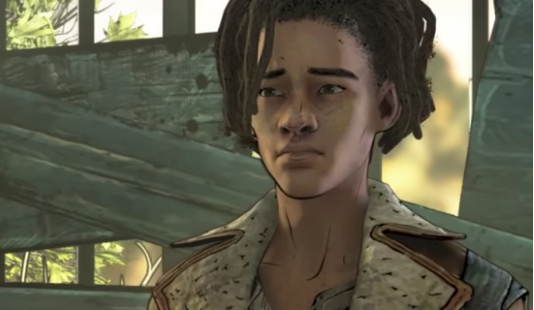
…this essay really doesn’t have much to say with Louis and Violet. In part because, frankly, I didn’t really know where I could put him with the points I strive to make. There is absolutely space for him, yet, another thing:
Their words for each other, when the other is taken, are enough. Louis and Violet say everything themselves.
I did give commentary to the dialogue quotes, but it was sparse for this precise reason. I don’t need to get into how quietly powerful their friendship is. Louis is the one who introduces Violet by name. He’s the one that promises Clementine that it’s just her way, because he knows her. If blinded, he’s also the one that she relies on to guide her. And despite Marlon, and perhaps despite even Clementine given the different routes, there is never a malice between them.
Which I adore TFS for doing, because it would’ve been easy to have them be rivals and fight over each other. Especially for Clementine.
But that’s also juvenile, and while those storylines have their place, it is not here.
Never has. Never will.
So there’s Louis. He’s an anchor. Yet, because he is the one grounded anchor Violet has of the schoolkids, not fazed by idealization nor devaluation… That is their dichotomy. It is unique of all other relationships Violet has before Clementine—after Clementine as well, should he be the one saved.
We have Brody. Who does represent a point of devaluation for Violet. The lowest to a volatile relationship.
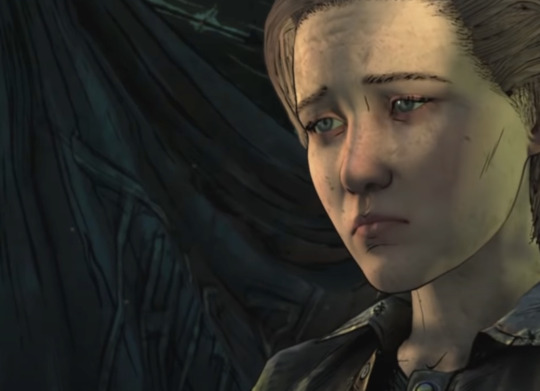
[Emotional Anchorage: Walking Triggers]
Truth be told, in this most recent endeavor to write Violet’s deconstruction, Brody was who reignited the compulsion. Because there is a deep-seated complexity to what happened between her and Violet, and why it happened. …only for me to find yet another post somewhere that was made by a glanced judgement.
Its criticism wasn’t in any way toxic, which was nice because this fandom…has a mean streak. But it did harken back to borderline’s stigma regardless.
Devaluation is a very ugly mark on someone with BPD. Worse than idealization, in the eyes of many. It in itself is toxic,and this coping mechanism is one of the reasons why BPD a disorder with the stigma it portrays. There’s a dysfunction in the order within our behavior.
That dysfunction, and the subsequent behavior, provokes a defensive ignorance.
Violet is wrong to do this. This is an antagonistic trait of hers, and Brody gets the brunt of it. She had to live with this for a year.
However, making blanket assumptions is reductive, especially in a discussion where it’s about understanding the how and why. There’s a reason why Violet devalues Brody. The path to how it happened in the first place is actually quite apparent. If you know how to read the signs, you can see this happen a mile away. So through understanding the how and why, it’s easier to 1) avoid it entirely, and 2) navigate devaluation if/when it does transpire.
Both Brody and Violet together make one mistake, and the fix is straightforward. Not easy, but straightforward.
Before that, though, we first shall establish a few things.
For one, Violet is…a lot. Don’t let her apathetic demeanor fool you. Just look to the previous section—that alone is enough to prove otherwise.
Along with the apathy, Violet is sardonic. She’s aloof to people when she doesn’t have strong attachments, but, she likewise shows to be pragmatic and reasonable. Which like, same. I wear belts and layer my jackets with vests too.
…and I also know what this kind of character implies: Violet is a little bully. She absolutely has the capacity to be cruel.This is also confirmed later, where at Ruby’s hootenanny, there’s mention of an Erin with braces that Violet would make fun of. (Probably because braces are hard to take off; they are a little goofy in an apocalypse, but also…really unfortunate the more it puts stress on the mouth and dental structure.) Violet then comments that she didn’t know why she did.
I wear belts and layer my jackets too; upon reflection, I did the same thing as a kid. So I have some insight to this which may explain the why here. Given how Violet speaks of this schoolkid, I’m willing to bet that Erin wasn’t someone who Violet had strong emotions for, one way or the other. She likely was pretty indifferent to Erin.
So, if that is true, Violet being a bully here comes from a place of 1) being apathetic, and not reading social cues like she should’ve, and/or 2) Erin was an outlet, but not a personal one.
Snide comments, and other slighted behaviors like this, they do not register.
Nothing clicks up here, behind my eyes. The comments are too brief to. So where this lashing out is coming from, it happens so swiftly that, by the time it leaves the mouth, I don’t know where it came from. There’s not much feeling to it. It was an impulse. So I just continue on my way, and never consider why.
In this way, there’s no malicious intent, it’s just cold. But outwardly, cruel.
A lot of times, to me, it was just play.
This is how a play with you. I make fun of you; you make fun of me. If you get hurt by it? Well. That sucks. Anyway—
Which, yes, is toxic, and I’ve realized, and I’m an adult now and I…don’t do that. Kind of. Social cues are a thing now, and I’ve gotten myself more aware of people. But I still do like poking fun, with the full expectation that it’s dished back.
Granted, I don’t know just how much of this applies to Violet. She has her insecurities, and is nervous when bringing herself to the table. And I am definitely not that—it’s not a confidence; I don’t care enough to be confident, I just do my thing.
But. This does establish a pattern with Violet, and with BPD, the disorder reflects the personality. There are common traits to BPD, but the expression of those traits varies depending on the person. For someone like Violet, who is already rather cold, this means any trait of BPD which stems from a cold demeanor will be present, and elevated. To borderline’s extreme.
Or, because Violet already can be cold to people, where devaluation is concerned, her personality makes it ten times worse. It doesn’t end. She makes comments—except, now, because there is significant emotion behind the comments (to Brody), it is to sting. It is cruel.
But…, it’s also complicated.
The bond between Brody and Violet is first made to be antagonistic, and Violet’s the one who perpetuates. Unlike the night before, where she with Clementine had a nice banter going in the dorm (if a tad guarded), Violet on the way to the cabin is hostile. Her words aren’t aggressive, but they’re instead dismissive at best, scathing at worst.
Brody does push back a little, and tries to brush it off, but it’s quite plain on her face that this does get to her.
In the cabin and away from Violet, Brody gives the context. It’s not just the words themselves hurt, it’s the fact that there’s a history there.
“Hey…, about Vi… I’m sorry she’s being a little mean. It’s my fault. [. . .] I was there when those walkers killed Sophie and Minnie. They were really close with Vi, and…I think she blames me for what happened to them. I mean, how do you even apologize for something that fucked up? I don’t know. Maybe I deserve it.”
[Ep.1 | Done Running | Fishing Cabin]
Violet is hurt. Brody’s guilty.
Then, there’s a second, damning piece of history that explains why Brody, of all the schoolkids, gives the most insight to Violet’s mental health, and why this is happening.
“We all used to be friends. Guess I kinda just missed that.”
[Ep.1 | Done Running | Fishing Cabin]
In the same way where it was textbook idealization for Minnie, this is textbook devaluation.
It’s made complicated because they were friends—good ones, considering they’ve been stuck in the same place since the outbreak—, but now there’s a negative connotation. That being the twins.
And remember, devaluation is an avoidant mechanism. Ambivalence is confusing, and that agitates a borderline personality.
Brody can then explain more, depending on the prompted dialogue:
[She’s…intense.] “She’s always been a little bit like that. But after the twins died, she really closed up.”
[It wasn’t your fault.] “Still, I was the one that had to break the news to her. And ever since I did, she’s become distant.”
[You should talk to her.] “Yeah, right. I tried, I have. It just never seems like the right time.”
[Ep.1 | Done Running | Fishing Cabin]
Once again, Violet is distant where she wasn’t before.
But we also get a further confirmation that Brody is the one with the negative connotation, and it’s because she was the one who had to tell her. …which in itself is an interesting choice of words, but we can assume Marlon pressured her once the conspiracy is revealed.
Then another confirmation, to the fact that opening a conversation has not been feasible.
Turn to Violet, and she first says this:
“God. Sometimes she just gets on my last nerve, you know? [. . .] I mean, it’s— It���s not like I hate her… I just… ‘I wish we could all go on a road trip together.’ God, she’s so…ugh. You know? [. . .] I don’t know what the problem is between us. With Brody…, I don’t know why it’s like this. Why is it so weird? I can never relax around her. It just keeps getting worse.”
[Ep.1 | Done Running | Fishing Cabin]
All of this is telling. Violet is very animated here, both in how she says it, her shifting tone, and what she’s saying. First it’s a comment. Second it’s admission. Then there’s that sardonic tongue, an ask to gage whether or not Clementine understands, before it all breaks and she goes back to admission.
The last couple lines say something crucial to know when understanding the dynamic here. And if a player is impatient with dialogue, they will miss these.
I can never relax around her.
It just keeps getting worse.
So Brody is a walking trigger.
Within the bounds of splitting to devaluation, this happens when an emotional anchor develops a level of ambivalence, but because anchors do not just go, the anchorage is instead insecure, rather than the source of stability once relied upon.
Yes. Brody is another of Violet’s anchors—just not the primary one.
And what it means to be a walking trigger is…devastating. Not just for Brody, but for Violet as well. She doesn’t have the support Brody gives her anymore. Can’t trust it. Because every time Brody walks in the same room, Violet cannot relax. She is agitated.
Don’t take this to mean in a figurative way.
It is literal.
Triggers rise from people an emotional response. In BPD, this often means that the brain will shut its reasoning off, and prioritize this “survival” instinct. Fight-or-flight.
So when Violet says, I can never relax around her, this isn’t a oh I’m nervous, I don’t know what to do. This is I cannot function when she’s in the same room as me. Maybe she’s hypervigilant around Brody. To the point where Violet cannot stand Brody anywhere near her…
So she sabotages. She’s cruel to Brody in the comments she makes. She does not allow Brody to get close, because it is too much. Rather than a calm, reasonable state of mind, Violet feels things. A cold pit in her stomach. A dwelling ache in her chest, or a knot in her throat. Can’t focus on what she’s doing—Brody’s there.
And the easiest way to stop it is to push Brody away.
And, and, initially, blame the girl.
[Because you blame her.] “Well, that’s what I used to think. I just keep thinking that things might have ended differently if I was there. Maybe I could’ve protected Soph. And Minnie…”
[Ep.1 | Done Running | Fishing Cabin]
There’s a confliction here. Violet did blame Brody, until she realized it wasn’t that. Instead, she blamed herself.
It’s the following prompt, however, that gives the best clarity to Brody and Violet. The prompt,
[Because she never said sorry.]
where Violet tells Clementine exactly what the trigger is—because by this point, a year later, she’s figured out how to articulate what it is:
[Violet] “She tell you that?”
[Clementine] “More or less. She wants to talk about it, you know.”
[Violet] “I just… I feel guilty about the whole thing.”
[Clementine] “Why?”
[Violet] “I was supposed to be out with the twins that day. I wanted to work in the greenhouse, so I asked Brody to cover for me. But then… I didn’t even get to say goodbye. I… I wanted to talk to Brody, to tell her I didn’t blame her for what happened. But every time I tried, I was reminded of who we lost. It was easier to just not talk about it.”
[Ep.1 | Done Running | Fishing Cabin]
If BPD isn’t a lonely experience, or a humiliating one, it can be a guilty life to live.
Violet expresses why losing the twins hurt as much as it did: there was never closure, and she blamed herself. Hence why, earlier, I suspected that seeking closure was what kept Violet at Minnie’s side after shooting her.
She was finally saying that goodbye, regardless of how the interaction itself went.
But it’s what she says about Brody.
Violet wants to talk. She has wanted to. But Brody’s a walking trigger. Every. Single. Time that Violet tried to talk, the same turbulence arose. In BPD, without that regulation, it is unbelievably difficult to talk when…your body’s actively flipping the fuck out.
A cold pit in her stomach. A dwelling ache in her chest, or a knot in her throat. Can’t focus on what she’s doing.
Of course she found it easier to just not talk about it. That is an instinct ingrained by borderline.
BPD is a lonely experience every time you lose an anchor this way. The disorder is humiliating because you do not want people to see you like this, when you’re in the midst of an episode, and you have no fucking control over your body, so you yourself are flipping the fuck out.
And it’s guilty. Because when you’re in Violet’s position, where you know the reason why, you know what you want to do, but your body works against you at every turn…
It devastates a person.
Because it is your fault. You did this yourself. Reap what you sow. You’ve done it again, it’s humiliating, and you are very, very alone because you just cannot stop burning bridges.
…in the apocalypse, being chained to a boarding school does not help. There is no way to give the time and space someone like Violet needs to think, and to process, and to let those emotions relax. Brody kicks up those emotions whenever she’s around, and the dust just never settles.
Violet trapped herself in a cycle. By the hour, or by the day, for a year, it would’ve been a ceaseless agony.
One that did scar over. Violet probably got used to it, and found a routine to the snide comments. It wasn’t like Brody was leaving anytime soon.
Until she does, and she suffers a disorientating last few moments.
I’d like to think they made amends and had a full conversation. I don’t know, however. But, at least Violet does take the first step when walking from the cabin, and she entertains Brody’s fantasies about a road trip, and that she would’ve had her sights on the Grand Canyon.
Because the one mistake they made was they never talked. It wasn’t going to be an easy thing, but it is that straightforward. So when they did, or began to, the devaluation began to ebb away.
Then, a tragic irony.
Brody’s guilt was never just I’m not Minnie, so she hates me, and it’s my fault. Rather, Brody’s guilt was warranted, and quite honestly, yeah. She should’ve be guilty, because it’s I watched as my leader gave this girl’s world away, and did nothing, lied to her, to her face, for a year.
Violet didn’t know this at the time. So for her, Brody was a point of devaluation because it’s her mental health actively jeopardizing things, not the truth and circumstance. The deception, in the conversation of that mental health, instead plays itself like salt to a wound, and then a tragic irony once Brody was murdered for it.
Because Brody knew they had to tell people. If the path to mending their relationship was encouraged, then it could be read that it gave her the inch to confront Marlon. If otherwise, Brody wanted to tell everyone because she needed to, despite what turmoil the truth would’ve caused Violet.
By the time Violet does know, and there’s a funeral, she says this about Brody:
“Brody, she was… She was real sweet. She had big dreams. And we all knew they wouldn’t come true, but we didn’t care. And we didn’t care because when she was talking, whatever she said seemed possible. [. . .] I don’t know if she found the place she dreamed about, but I’m gonna miss her.”
[Ep.2 | Suffer the Children | Courtyard]
There’s forgiveness. With Brody died that devaluation.
Not a moment thereafter, however,
“Marlon was… I can’t. Not for Marlon. After what he did to the twins and Brody, I—”
[Ep.2 | Suffer the Children | Courtyard]
The cycle continues.
Now with Marlon.
If Violet devalued Brody, she absolutely vilified Marlon. Because not only was it about the twins, there’s also Brody.
So of course she didn’t give him any peace after the fact. Why would she? Marlon had his own complexities, yes, but those complexities hurt. They brought another ambivalence.
As the essay rattles from the schoolkids, we’ll discuss another relationship now. A new, fresh one. Clementine, through who we see all of it—the emotional anchorage, the idealization, and devaluation. The splitting between. How intense Violet can be, and how volatile.
We have Clementine, who is given the chance to witness what Louis means for this wallflower, and that she grows on you (he promises so).
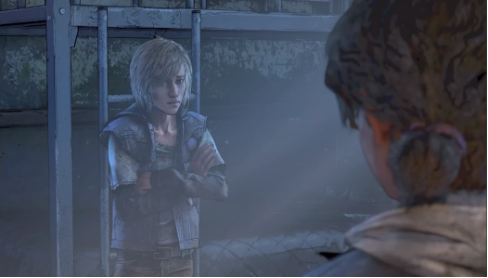
[VIOLENTINE: The Ship, and its Anchorage]
Platonic or romanced—the difference doesn’t matter in this essay. The shift of context between friend and more than that is just that: a shift in context. Distinguishing the two will have its moment, but it is hardly integral to the fact of the matter:
Violet anchored Clementine, and she did it swiftly. (In record time, dare I say.)
In regards to the arguments against romancing Violet, there’s a lot of people who look to Minnie, then back to Violet, and point to Clementine’s “girlfriend” dialogue. “Violet’s not over Minnie,” is a common one, right alongside, “Clementine’s just a rebound.”
Now. I’ve spent 5.5k words tearing those arguments to shreds in one section, and I still have with me another few things to say about Minnie and Violet’s relationship up my sleeve. In light of Clementine and Violet’s relationship.
Because even though I do buy that they were closer than friends arguably would be, they weren’t girlfriends. It’s why Violet was insecure within their relationship, and why that insecurity devolved into a strong case of idealization. Violet genuinely did love Minnie. Her bond with the twin will honestly forever be there, but that bond wasn’t unconditional. The conditions were at the cost of Violet’s mental health.
Then there’s the rebounding, and I will use this as a jumping off point regardless of relational status.
Rebound relationships are defined by a partner still with a previous relationship’s baggage. They’re not done healing. They haven’t quite let go. It gets in the way for committed relationships where the expectation is that both are in it 100%, and that person just…can’t. Because they’re still fixated on the last partner.
…which yes, does sound like Violet. Cuz it kinda, sorta, frankly is.
However. For one thing, this dynamic doesn’t just apply to a Violet route opted for romance. The rebound applies to a platonic dynamic, in part because I don’t frankly believe Minnie was a true girlfriend, and in part because idealization is not specific to partners. Especially in what we see in TFS, Violet needed to let go of Minnie regardless.
Then there’s the fact that being a rebound isn’t always bad. To rebound, which is where the term “rebound relationship” derives from, means for something/someone to bounce back. Or, it can mean a kind of backfire. Both uses of the word can be applied to relationships like this, which, yes, is why they’re fickle, and why people do their best to avoid.
Here’s the thing: Violet needed a new relationship to pull her out of the old one. Because Clementine is a catalyst for Violet, and she was anchored so quickly because whether Violet herself realized, she did want to move on. She couldn’t, but through Clementine, she got the chance.
And I do confidently say that she did want to, because by one interaction in the woods, Violet is disillusioned from Minerva immediately. She’s snapped out of what image she had of her, and is the one that remains realistic where Clementine can offer supporting words—along the lines of we can get her back.
It’s why Brody, through the cabin’s conversation, observes the same.
“We all used to be friends. Guess I kinda just missed that. But when you showed up… I don’t know, I just haven’t seen her warm up to someone in a long time.”
[Ep.1 | Done Running | Fishing Cabin]
I find it interesting that Brody picks up on Violet taking to Clementine so quickly, and is able to read enough into this to try and see if it’s enough of a push for Violet to start healing. She’s right, it is enough, and Violet does take a first step in mending their relationship, and breaking away from the devaluation that was arguably heightened by her idealization of Minnie.
…granted, it’s dependent on player choice. There are Violets running around out there having fished with Clementine, but never did reconcile with Brody.
In any case, I am going to argue against Minnie being Violet’s ex because 1) who the fuck cares, I’m not concerned over purity over here, and 2) it’s likely they weren’t exes at all.
However, I won’t fight against this being a rebound. It is. But, Violet’s arc is about learning how to let the fuck go, she has a problem with letting go, so of course the relationship would be a rebound by proxy. A healthy rebound, at that.
By the time she is forced to let go of Clementine, after two newcomers are voted out, her attachment is made quite plain the moment Clementine is in danger within— What, five minutes, and Clementine is at gunpoint?
Regardless, Violet is there, bow at hand, with Louis behind her. She is ready to shoot, and it is no bluff. Violet will if prompted. Or, she will run should Clementine prioritize getting the two out of it.
Because Clementine’s already anchored. Violet trusts her to make the call, and she will follow without hesitation. Later on, after a weary night with A.J shot, then a morning of crawling back for medicine, Violet calls for Clementine to talk in the office. And in there, the anchorage is confirmed further:
“What happened out in the woods… I saw they had you pinned, and I… Shit, I got so crazy.
“I know you think I didn’t do enough for you and A.J, but when I saw you were in danger, I had to do something.” / “When I heard you call for help, I didn’t even think.”
[Ep.2 | Suffer the Children | Office]
The second line is dependent on whether or not Clementine blamed Violet before, as her and Louis walked the exiled to…exile. And stuff.
But, her account as to why she ran right for Clementine, and pulled an arrow on Lilly says everything I got so crazy, I didn’t even think, I had to do something. Clementine roused a trigger.
This time, in a very good way. Well, as good as the circumstances. In any case, this does count as a trigger because it’s inciting an emotional response, and given Violet’s wording, a fight-or-flight. (I realize triggers are specific for negatives; for the sake of brevity, I don’t care. I still say it counts.) It’s the reason why, before, when I detailed how I personally get with my anchors, I do similar things. No, not literally pull an arrow on someone, but I act on impulse without care, because I just want to satisfy their needs to the absolute fullest. It’s genuine, but it’s also triggering—under a positive connotation.
After this, of course, we push into Violet leading the school as they prep for an attack, with Clementine right alongside her. Whatever happens during this time is unknown, just that the school built-up the walls, laid their defenses, and focused on instruments to help, such as traps and explosives. Shortly after the time-skip, of course, we get the belltower sequence.
Starting with an inquiry:
“I know you came back for medicine, for A.J, but after that, you could’ve just left. Avoided all the bullshit with the raiders. Why didn’t you? Sorry, I know that puts you on the spot. You don’t have to answer. We’ve all got our reasons.”
[Ep.2 | Suffer the Children | Belltower]
Violet asks something that has likely been on her mind for a while, but then… Not backtracks, but she does relinquish the pressure for that answer.
As their time at the belltower continues, it’s clear where the question came from.
“Sorry, I didn’t mean to just…talk so much. It’s just, I’ve watched people leave before. Family, friends. They never come back. But you did. And now I can’t imagine what it would be like if you weren’t here. Um. Shit, that sounds so much dumber when I say it out loud. You know what I mean.”
[Ep.2 | Suffer the Children | Belltower]
Violet’s hesitancy to speak her mind, be vulnerable, is interesting, particularly because it’s about doing so too much. It’s a very specific one, with ambiguous implications. This could be an anxiety she put on herself, or, this was something that she took after a mention that she was talking too much, getting too personal, one way or another. Then there’s also another thing, where it sounds dumber than she intended. As though when speaking her mind, Violet has an idea of what to say, but she doesn’t know quite how to articulate it.
This is a really good line of dialogue, so that latter insecurity is just that: an insecurity.
Nevertheless, this speaks volumes because it’s the first verbal admittance to an issue with abandonment. All the adults left her life, and never returned. Those include her parents, who never tried to get back to the school. Her grandfather died, so not his fault, but her grandmother shot herself right behind Violet. Which is abandonment, and really fucked to do. The teachers of Ericson’s…
Then fellow students. Most probably died, including Brody. And the twins were taken away.
Abandonment is a huge thing.
So we turn to the route where Violet is taken. And it’s not good. Violet reacts as predictably as this essay has outlined.
[Clementine] “Vi? What happened? Are you okay? Violet, talk to me… We’re here to take you home.”
[Violet] “I looked for you. When they grabbed me, I saw…you let them take me. I’m just supposed to forget that because you’re here now?”
[Violet, if platonic] “Some fucking friend you are.”
[Violet, if romanced] “Some fucking feelings you had for me.”
[Ep.3 | Broken Toys | Brig]
Here we have now a fresh faultline within her and Clementine’s relationship. It brings ambivalence. Upon seeing Clementine, she’s plunged into an episode.
And Violet splits. Her image of Clementine is distorted, so she falls back to the same pattern she did with Brody, and she is hostile.
[Clementine] “What’s wrong with you, Vi? Come on, let’s get the hell out of here.”
[Violet] “No, Clem. I’m done. This whole situation is so fucked! At least here I have Minnie…”
[Clementine] “You mean the Minnie that betrayed us?”
[Violet] “Don’t act like you know her. She tried to escape. Her and Sophie. They said if I fight back, they’d kill Minnie. Or one of you. All you’ve done is get us hurt or killed. If you fuck this up worse, I’ll stop you myself. And don’t think I won’t. I’m not losing her again, or anyone else.”
[Ep.3 | Broken Toys | Brig]
We also have Violet manipulated on top of that, led instead by Lilly and Minnie’s word, not Clementine. Because BPD primes people to manipulation, especially in times when they’re at their most vulnerable. But, throughout these interactions, we do see Clementine attempt to console her, and talk.
Violet, however, is not open to. She is not in the right state of mind. This is a BPD episode, so Clementine is not able to get through to her here. Violet does not trust her—too much ambivalence. Mitch’s death is fresh on her mind, she’s been lied to by Minnie about what happened to Sophie, and with that lie, she was told that more people would die if they did not listen.
And of course, the more time is spent, Clementine starts to get frantic as everything escalates because there’s a fucking bomb ticking away in the deck down below. So there comes about an urgency, and she can’t spend that valuable time consoling Violet.
So she starts chipping away at the door.
“What the fuck are you doing?! You’re gonna get us all killed!”
[Ep.3 | Broken Toys | Brig]
And Violet does precisely what she said she would do, and she attempts to stop Clementine herself. Because there’s Minnie again, but she also doesn’t want anyone else to die either.
Lucky for Clementine, she is stronger, and she is able to overpower Violet within a minute. However, in trying to get the cells unlatched, then to find her way to A.J, she herself is overpowered by Minerva. The urgency and stress associated backs Clementine to a corner. She still doesn’t want to see Violet hurt, so, she explains,
[Clementine] “We planted a bomb on the boat!”
[Violet] “Fuck you, there’s a bomb! Mitch is dead! You just… Fucking go!”
[Ep.3 | Broken Toys | Brig]
…and again, Violet does not trust her. Mitch’s death is still fresh on her mind. Everything that Lilly and Minnie fed to her is still present.
Then, the bomb goes, and it takes Violet’s sight with it. Even on the beach, she asks for Minnie, amidst confusion because, somewhere down the line, they got separated. Louis has to be the one to support her. By this point, and some beats after, it feels like this is another Brody. Like there’s no turning back, not until a long, long year where Clementine would be in the same shoes.
Minnie makes herself known, though. She’s off in the woodland, with her people.
And that is when this Violet has the wool pulled from her blinded eyes, because she realizes what happened.
The moment is brief. It’s very easy to miss. Yet, the attempts Clementine gave on that boat to console her, before the urgency really began to set in, was not fruitless.
Violet tries to apologize:
“Clementine? The stuff I said on the boat, in the cell, I, uh…”
[Ep.4 | Take Us Back | Beach]
It’s not the right time for it. The schoolkids need to get off that beach, but this brief moment is huge.
The thing about episodes is, yes, in the moment, the individual is not consolable. There’s no reasoning with someone who is shut down. However, the attempts to try and console, and/or any verbal promises to leave the door open for when they’ve calmed down, the effort can be recognized and appreciated.
Once Violet snaps out of it, that’s precisely what it was. She understands that Clementine was never trying to hurt her, nor did she come to her disingenuous. Clementine was there to bring her back, because the situation was exactly as Violet herself said—fucked.
But still… Clementine was there to bring her back.
Either way, Clementine proved herself to Violet, because down this route, she left twice, and came back both times.
Of course, the night does not end there. Clementine loses a leg. Another schoolkid is gone.
So through the weeks thereafter, Violet gave herself the time, and then, she tries again with the apology:
[Violet] “I wanted to wait ‘til you were up and about, but how I behaved on the boat… It was really unfair. My head was so messed up—by Lilly, and… And Minnie. I was so wrapped up in my own shit…”
[Clementine] “It’s okay. You went through hell in that boat, and I let that happen.”
[Clementine, if platonic] “I’m just glad we got you out of there.”
[Clementine, if romanced] “I’m just glad I got you back. I was so worried I’d lost you.”
[Ep.4 | Take Us Back | School]
In this apology, Violet articulates the position she was in, and admits the kind of influence Minnie was to her—not a good one. And in turn, Clementine acknowledges her. She doesn’t demean Violet for what she did. On top of that, she expresses how she’s just happy that Violet is there in the moment.
This route is bittersweet. We have the beginning, where Violet is guarded, then she warms up to Clementine, finds an anchoring point, and acts upon a fierce loyalty. Which then is hurt when Clementine chooses to save Louis instead. The time on the boat is very bitter because…the truth about borderline is, yeah no, it does not care who the person is to the mentally ill. The disorder is a disorder for a reason. It will hurt, and it will put a strain and test a relationship.
Then you just have the big fuck you axe where Minnie…effectively was the one who managed to wound Clementine, have her get bit, and then lose the leg. Which isn’t really how an eye for an eye goes, but that’s what this route goes with.
But then…, it’s sweet. Because Clementine did the right things, with what stress she was under.
She tried to talk to Violet, and in doing so, she left a door open for Violet to crawl back through when the time was ready. It was sooner rather than later for her, since Minnie… Whatever. However, it’s an apocalypse; a boat was just blown the fuck up. So while it was the time for Violet, it was not the time for literally anyone else. Ergo, a second attempt, to which there was resolve.
Clementine and Violet did not make the same mistake that Brody and Violet did.
And that’s what saves the relationship.
Now, let’s waltz all the way back and save Violet, just to show what Clementine and her do right to build a healthy connection, whereas her and Minnie went wrong. To do this, taking a brief visit to the romantic will help in dissecting an evolution found as the episodes progress.
After the bits of dialogue in the beginning of this section, Clementine can choose to confess her feelings for Violet. It can be solidified by a kiss, or a question for a relationship, or…a meek silence, to which Violet is able to read and feel the same. Clementine can also express confusion, in that she needs the time, but express the interest all the same.
There’s a sweet moment here, and with the kiss, it can also be a touch awkward because…
Okay, they kind of flounder. Violet more so. Which is interesting to note, because Violet “supposedly” was in a relationship before. Sure, the moment on its own doesn’t mean an experienced person wouldn’t be any less awkward, but with the following steps in their relationship, it does support the suspicion this essay has in that she never had a reciprocated, romantic relationship with Minnie.
The moment where Violet asks Clementine to dance, and is nervous to do so, is one of those steps in the relationship:
“When you told me you have feelings for me, I was shocked. Then I started thinking. There’s something I’ve always wanted to try with someone I cared about. And I never have. [. . .] Have you ever danced with anyone before? [. . .] Do you…wanna? Just us. No one else around. I mean, I know it’s kind of weird, but it’s something I’ve always wanted to try.”
[Ep.3 | Broken Toys | Dorm]
It’s a step in way of romance (Clementine even remarks after how they’re getting better), but it’s also a step in Violet’s confidence in being vulnerable with someone. She’s still clearly anxious here. Violet still has some of that self-deprecation, and it comes back if Clementine rejects the offer because the idea was stupid, or something along those lines.
But she still does ask. And it’s a big ask, because this is important to Violet. So if Clementine reciprocates the dance, it’s yet another sweet moment, and it builds the confidence within for this relationship further.
Before the night, Violet can tell Clementine how she got to Ericson’s. Then, through the night itself, she backs Clementine every step of the way. Shoots Minnie. Escapes with the schoolkids, only to come back and find her with Tenn and A.J, safe and sound.
During their walk, Violet opens up again. This time, there is none of that self-deprecation, and Violet even gets choked up—but she’s not really ashamed for it, she just continues and says her piece.
“While we were looking for you guys, and I… I thought you might be…gone for good…, um, shit. I was trying to figure out what I’d do if you were gone, and I realized how goddamn stupid I was. About Minnie. For a whole fucking year. I was so wrapped up in losing her and Sophie, I pushed away everyone who tried to care about me. Marlon, Brody, Louis. Even you and A.J. I tried my damnedest not to care about either of you. And I still couldn’t tell you why.”
[Ep.4 | Take Us Back | Forest]
She admits everything. Is so very open to Clementine, and tells her what is on her mind. There’s Minnie. There’s what she regrets.
[You were afraid] “I was a goddamn coward. I’m not a coward anymore.”
[I’ve done the same thing.] “And then you wonder why you fight so hard to stay alive. I don’t wonder anymore.”
[You cared about me.] (Platonic) “I didn’t expect to find a friend like you, not ever again. But I’m really glad I did.” / (Romantic) “Yeah, I did. Way more than I meant to. I’m still kind of amazed we found each other, you know?”
[Ep.4 | Take Us Back | Forest]
By this point in the story, Violet has undergone her arc.
She is a changed person because of Clementine’s influence, and she sees what she either didn’t see before, or did but had forgotten. Through a rebound, because Violet just needed a second chance to redeem herself.
Now…, she didn’t expect to find a friend like Clementine ever again? It’s interesting that Violet indicates Clementine was a second chance with the platonic route, not the romantic. Is this her quietly admitting that Minnie was never beyond a friend, actually? Or is this in reference to Brody and Sophie instead?
I dunno. Just found that interesting, since she could have said an equivalent for the romantic dialogue. In any case…
There is something so profound with how this relationship contrasts the ones which came before. As a friend or partner, Clementine never gets to the point of Minnie’s idealization, nor Brody’s devaluation. Both are antithetical to each other because they balance on the same scale—that being insecurity. Violet cared for Minnie and Brody deeply, and those emotions are genuine.
However.
Minnie was put on a pedestal because there were faultlines to that relationship which Violet did not want to face. Brody, instead, was degraded because rather than faults, it was easier to ignore the good sides to Brody. And the good sides were a really, really sweet girl who dreamed of a better life—something that Violet could never see for herself after the twins.
Then there’s Clementine.
Even at their worst moment, where Violet’s trust in Clementine waned, she still did trust her. Clementine told her there was a bomb. Violet snapped because Mitch was the one who knew explosives, and he was dead. And yet, she got herself blinded because she knew Clementine wasn’t lying to her. She trusted her enough to know…
Well yeah. There’s a bomb.
Beyond that, however, Violet decides to do some arts and crafts, even though she says they’re stupid. Or Violet’ll ask for a dance that she’s desperately yearned for. She’ll talk to Clementine, a lot, even if she didn’t mean to do it “so much.”
Clementine as an anchor never truly corrodes. It’s tested down one of the routes, yet by the end of it, the relationship is maintained.
…there’s a final note which taps into this.
We come back again to identity one last time. For a brief anecdote—nestled within the shadows of what exhaustion this essay has gone over with Minnie and Brody, and now Clementine—, but an important one. Violet’s sense of identity will remain to be untold because we don’t have that perspective. She never talks about herself like that, so there’s no true insight for Clementine to gather.
Yet there are scant traces of identity diffusion, or an incoherent identity, ceaselessly disturbed by external influences.
This calls back to a copycat nature where borderline personalities will imitate in order to find stability. Ambitions, beliefs, interests—these all go right along with it, because they very well can change, and do so radically. Impulsions in way of severe life choices are made on the foundation this nature provides.
And that foundation is not strong.
There is no way to truly understand and deconstruct Violet’s sense of identity, yet, her behavior and choices made throughout the season can give us something to chew on.
Between the two routes, Violet is…a hair shy from being an entirely different person. The Violet Clementine brings onto the boat is not the same as the Violet she meets there. By contrast, Louis remains consistent; bring him on the boat, and he acts as expected—same with when we find him…without a tongue.
One is Clementine’s Violet. The other is Minerva’s Violet.
In both routes, Violet’s impulsion changes her life’s trajectory. She either shoots Minnie, or, she goes after the bomb and blinds herself. In one route, she’s outspoken, combative to the Delta, and fiercely loyal to the school; in the other, she does behave like how Minnie described her—never could talk to people, never to be class president. The Violet in that second route is withdrawn and quiet…
But she does confront Clementine.
She mimics Minerva’s newfound bellicosity that she dawned from the Delta, and it’s pitted against Clementine by following both her and Lilly’s word.
Going back to the first episode, where Brody tells Clementine that Violet withdrew herself from everyone, a lot of that was depression. Violet also actively told herself to push everyone away (…except Tenn, a remnant of the twins). However, there is a read here that she withdrew herself because there was no one left for Violet to mirror. She reverted herself back to the girl who sat in front of the television, with her grandmother’s fresh corpse just behind her.
Not to say that Violet doesn’t have a personality on her own. No, she still does. Having a weak sense of identity doesn’t automatically mean that there’s no identity at all. It can just mean the self-perception of identity is weak, but given that it is a self-perception, what is Violet going to draw from if she doesn’t…know how to read herself?
So Clementine meets Violet in the midst of this. She’s sarcastic and grates for a minute about the car. She keeps up a wall between her and Clementine. But by the end of the episode, and the start of the second, here Violet is cleaver at hand, about to lead the school.
Marlon scathes when she stands toe-to-toe. Talks about her being difficult again—but that in itself is ambiguous, because does this mean she’s gone toe-to-toe before, or does this mean Violet has a tendency to be inconsistent? And was that night another inconsistency?
But then… Louis. He admires the fact that Violet is like his white knight. He relies on her to protect him, because he knows that there is no doubt—she will.
Then being a leader. That comes as a surprise to presumably everyone. There’s a few points of dialogue that suggest it, others that blatantly say it, and then more few beats where we see the contention between Violet’s leadership and the schoolkids.
There’s conflict here. Violet is inconsistent in who she wants to be.
And it’s just that, isn’t it?
The TWDG community has long since decided that Violet’s arc is about letting go of Minnie (for those who see past the “rebound” thing), and self-discovery. Which is still true, but through the lens of BPD, there’s another layer to this. It’s about learning to let go despite disorder. And then, it’s learning what she wants from people, and who she wants to emulate, again, despite disorder.
What kind of person does Violet want to be?
And this is distinct from Louis, because with Louis, it is also a self-discovery. He is care-free, live in the moment, to a detriment. To be quite frank, the only reason why he got that far into the apocalypse was because he relied on his community. Not because he couldn’t contribute, but because he has his fair share of self-depreciation.
But there is no question. He knows who he is, and he knows the kind of man he wants to be. It’s why Louis does talk about his sense of self as much as he does.
Whereas Violet really doesn’t, perhaps because she can’t. All of what she confines in Clementine is the fact that things get overwhelming, and she gets confused. Quite frequently. But also, her relationships. Everything external for her, because… Again, she struggles to articulate what’s going on internally, because of that confusion. It takes time for that articulation to be feasible.
Violet has a patchwork identity. She’s kept traits of others—such as the singing. Granted, everybody does this. However, there’s her own within patchwork, but those have gone largely unexplored in the past.
Then here’s Clementine, the catalyst to this arc.
Which begs the question, why? What about Clementine has this impact on Violet?
Something about her draws Violet in.
At first, yeah. Clementine’s new. There’s an air of mystery around a girl who totals a car at Ericson’s front lawn, with a kid in tow. But that mystery alone doesn’t equate to a cleaver pulled, guarding the new people from the rest—her own people.
The answer is rather simple: Violet is mirroring Clementine, so all there is to do is look at that reflection. And we find a leader. We find someone who is compassionate, and does everything to fight for their own. Actually fight. Tooth-and-nail. Someone who does whatever it takes to survive, even if that means rubbing the good ol’ walker jelly, or, taking risks to secure a bag of food.
Clementine’s compassion for people is evident once she wakes up, and she has A.J by her side. Her skills in leadership, her drive to fight, to survive—those are all made very clear at the train station, with both Louis and Violet following her lead.
So Violet mimicked. She found the same traits within herself, then elevated them. Brought them to the surface.
As the relationship continues to build—platonic or romantic—, Violet finds reciprocation. She’s not just emulating what Clementine would like to see. After all, she was sat in the headmaster’s chair while Clementine and A.J were still exiled. That indicates how Violet found, if not a comfort, a consolation in that part of herself.
The reciprocation continues whenever Clementine responds to her, and she validates Violet, she shows interest in what Violet says, and what Violet wants to do. Violet can ramble on and on as long as she wants, and Clementine would still listen. Violet (if romanced) can ask for a dance, and Clementine would oblige. Either way, Violet gives Clementine a pin. Clementine puts it on.
It's that compassion, and it cascades authenticity off Clementine to the people she surrounds herself with. She’s also someone who feels strongly. This character is a very empathetic person. Throughout S1, Clementine was perceptive of the people around her, and she cared. Deeply so. S2, the same thing, even if her morality began to grey. The start to closing herself off to protect herself was present. S3 as well, especially in her drive to find A.J once she learned he was still alive, out there somewhere.
Throughout the seasons, there are also plenty of moments where her empathy shows. Clementine does genuinely feel what the people around her express. Like with Louis, when his tongue is cut. You can hear in her voice how pained she is, regardless of the relationship itself. She’s pained because Louis is.
And given what she’s lived through on top of that? Clementine would absolutely put 100% in a relationship, enough to match someone like Violet.
There is another reason to this why, and the thought struck me when I was reminded of an easter egg during Violet and Clementine’s scene up on the belltower. A constellation, which Clementine can draw for herself, and he’ll wink right back at her:
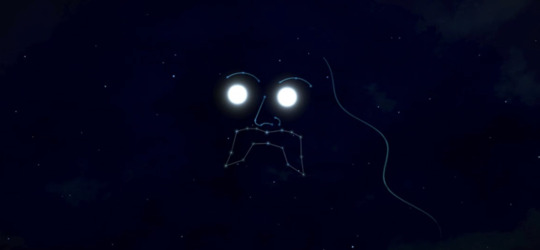
Kenny.
This connection is an interesting one to make for a scene with Violet. It’s cheeky first and foremost.
Regardless, there’s a parallel drawn here. Violet and Kenny are very similar, in that…Kenny likely had BPD. TWDGhas two seasons, then a couple flashbacks, where we can read it so. That man was volatile himself. Fiercely loyal, but could absolutely flip on a dime if his perception of the people around did not align with what he desired—it’s why he’s so fickle with Lee, to the point the gameplay reflects it, and then Clementine as well, because this behavior was the ultimate antagonist. His spiral down mental health escalated, and escalated, and escalated.
And he’s guilty. Tells Clementine that to leave him, or to shoot him, is the right choice to make.
But should the two survive together, with dreams of driving down to Florida, we find that he…is okay. He’s stable. His anchorage with Clementine and A.J is strong, without ambivalence. In this storyline, she sees that with people like him, sticking around through the bullshit can be worth the trouble.
Of course, it’s also a testament whether or not it is worth it. Some people, including myself, left Kenny in S2. Because the turmoil through the season was just that significant.
He genuinely cares, but like my mom, Kenny still hurts. Especially in S2. Because despite himself, he just could never seem to get past what he felt, and his impulses.
Clementine’s relationship with Kenny varies across different choices made, and the interpretations thereof. My personal interpretation of Kenny will contrast wildly to another. And that’s okay.
But whatever the interpretation is, and the choices made, Clementine has experience with people like Violet. She’s lived through the type of behavior conditions BPD and alike bring. She knows how to navigate them, and find healthy grounds.
Clementine keeps an open line of communication with Violet. Expresses interest, and accepts what Violet herself has to offer. But she also has her boundaries. For one, A.J. He is her priority. Two, when Violet fights her, Clementine fights back because it’s not okay—do not lay a hand on me. Now, whether or not she would’ve fought like she did if there was no bomb, and A.J was still in the cell…
I don’t know. I assume it would’ve been one of those major choices of the game. Either talk her down, or fight.
…similar to what Lee has with Kenny, up in the attic after the house in Savannah is swarmed, or on the train before that.
Bringing Kenny into the conversation is…funny, in a way. At least to me. I write all this, because TWDG secured its place in my heart by being the very thing I needed through a really, really bad year where my mental health (BPD) reared its ugly head. TWDG as a whole, but S2 especially. I realize why so many people have issues with the season, and I get it. It’s only natural for that to happen when every season has its distinctive personality—not everyone will gel with its voice. That, and it does have its fair share of flaws.
But if it was not for S2, I would not be in the fandom. Because that season was 2019 boiled down to the pure chaos I inadvertently put myself through, and it did so by having me play a character who when she was taken seriously, she just could not do it right, then…, when she wasn’t, it was out of neglect, where the adults put themselves first. Every. Time. And…one of those adults was a blunt reflection of it all.
Up until the final moment. The breaking point.
It’s how I felt inside my head. And still do, sometimes. When I’m stuck inside a season rooted in instability—a winter—, things just keep happening, and there is no end, even though I try to maintain the fantasy of peace in those slow moments. But…there’s just no end. There’s only escalation.
It was something I needed to experience in isolation, where I understood that it’s just a game, and it’s within the scope of 7.5 hours.
Swiftly thereafter, I started writing. Because again, it’s what I’ve always done. So AYDF came to be, where Clementine’s an alcoholic, but not because she’s legitimately an alcoholic in the gameplay. I get she’s not; my Clementine is an alcoholic because…it’s an obscure remark of borderline, and an exploration wherein I thought to use an entirely different disorder to express such a thing. In part because I’d yet to really (re)consider BPD (it wasn’t until some time later that I understood), but also…I’m a storyteller. Having alcoholism represent BPD is interesting.
It’s all why I adore TWDG, and my Clementine, and ADYF. Together, they’re an anchor of mine.
Clementine and Violet’s relationship included, because I did not expect to find Violet. I knew about their relationship before playing—heard it whilst I did light research on which games to buy. But I didn’t expect to find a character who…also emulates what S2 did for me. Just, in a more matured light than who I was in 2019. Also didn’t expect the relationship to provide growth for my Clementine in regards to these personalities, because mine did absolutely struggle the first time—with Kenny, and the devastating choice she made.
Cuz like.
Oops. A.J’s still alive. Um. Whelp.
(…for context—because I know the assumption—, no, Jane was not there. I left S2 with both her and Kenny dead. Clementine just shot the last adult who could’ve helped A.J.)
To see the chances where Clementine is the person Violet needed—to treat her well—, and take those chances, I didn’t expect to find Violentine as this embodiment of a healthy relationship despite borderline. It’s not perfect—obviously it’s not—, but all things considered, it is healthy by the end, no matter the route.
It’s regardless of whether or not Violet actually has BPD. She’s not diagnosed, and I don’t intend to have her be diagnosed. But at the same time…, this essay kinda makes it clear that Violet is a textbook example anyway. A good one to me.
And a good one to A.J.
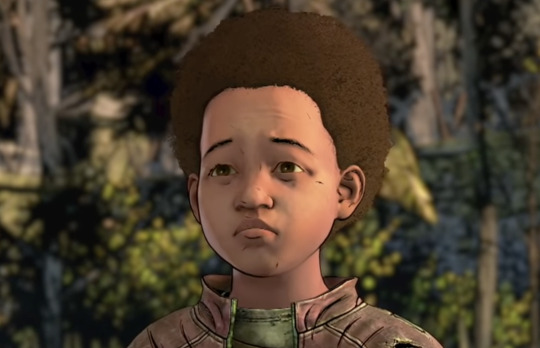
[A.J, & Serving an Example]
Throughout this essay, the priority has been clarifying BPD, and unveiling what it feels like. A mechanism that may lead to the disorder, then the mechanisms that the disorder itself deploys. How it effects the person, in their identity or, most notably with Violet, relationships.
And the way Violet articulates herself, through the several dialogue lines within this post, it is evident that she’s aware. There’s a self-deprecation to it, but, Violet knows her issues and what it does, whether or not she knows its name—BPD, or something else entirely. Given the ambiguity that the game allows, it is still left unsaid.
But that’s the first thing: she does talk about it. Violet knows herself well enough to.
Not only that, she demonstrates a responsibility in her disorder.
With this essay, there hasn’t been much in the way of responsibility. Because it isn’t until A.J enters the discussion do we truly see this come to light.
I will be the first to say that, while I can sympathize with other people of the diagnosis—even empathize—, I am rather critical when it comes to being responsible of our actions. From knowing a trigger but being around it anyway, to refusing to communicate when a hand reaches out—there’s issues I take. Because there are things that needs to be done with BPD, and those are not it.
The fact of the matter is, sorry, it fucking sucks. But also, it is your disorder, as it is mine. It isn’t your fault that it happened, but it did, and you’re kinda just stuck living with it. It’s not the responsibility of anyone else to fix and manage every aspect of BPD.
Finding people like Clementine, or a support system like the schoolkids, will do wonders because, yes, they can help. But Clementine, and the schoolkids, also have their fair share of shit. To expect them to drop everything is unfair, the same way that being expected to just drop your BPD for someone else’s sake is unfair.
It’s a give and take. There will be a ceaseless line of dialogue in the name of boundaries, and clarification, and everything in between.
So we return to Violet’s apology to Clementine.
“I wanted to wait ‘til you were up and about, but how I behaved on the boat… It was really unfair. My head was so messed up—by Lilly, and… And Minnie. I was so wrapped up in my own shit…”
[Ep.4 | Take Us Back | School]
She doesn’t excuse it. Violet gives reason—and that reason is, more or less, she was not in a right mind—, and she articulates what position she was in, but there is no excuse.
Because the difference between an excuse, and an apology, is that one is done with the intention to be forgiven, the other is done with the intention to resolve—the forgiveness is a hope, not the reward.
Being able to do such a thing, unprompted, speaks volumes to Violet’s maturity, and her understanding of her own mental health. For people with BPD, more often than not, it’s easier to blame someone else because…looking inward, and realizing you royally fucked up again is not easy. Or, it’s easier to use apologies to seek a reward—like forgiveness—, and to indulge in a brief gratification that may ensure a person stays.
Well, okay. The same can really be said for everyone. BPD, however, does has its way in amplification.
Nevertheless, A.J is able to witness this moment, take it in. It’s a lesson in itself.
But given Violet is saved, and Louis is mute, there is another moment which not only speaks volumes, but it serves to A.J clarity.
After the last meal shared in the game series, and Violet with Clementine deliberates over a caravan, A.J can ask Violet one thing:
“Aren’t you still mad I killed Tenn?”
[Ep.4 | Take Us Back | School]
It’s a fresh wound for her. The pain of it is laid clear across Violet’s face. However, in response,
“The thing you said on the bridge…, that he was messing up all the time. It wasn’t something new, you know. Tenn got himself or other people into trouble all the time, long before you guys got here. He was always so lost. He lived in a world that just…isn’t there, you know? And that’s why I tried to look after him. But when I was pulling him away from the walkers, and Minnie, I could also see…he just wasn’t there anymore.”
[Ep.4 | Take Us Back | School]
Or, it’s complicated, but she understands why. Violet is able to acknowledge where A.J comes from. She does, and she sets aside her emotions. There is no corrosion here. Violet doesn’t devalue A.J for this, even though the gravity of his choice would’ve provided a validity. A warped and intense validity, but one all the same.
They trade more words, and amongst them, Violet asks a damning question, and A.J accepts:
[A.J] “So you’re mad, but sad.”
[Violet] “Can I be that for a while?”
[A.J] “Yeah, it’s okay.”
[Ep.4 | Take Us Back | School]
A.J acknowledges her. She asks for further acknowledgement—the time to heal.
And he understands, and he allows her the room.
…the thing about Violet and A.J, in contrast to Louis and A.J, is that A.J looks up to these characters for very different reasons. Louis is a great guy. I want A.J to be like him, or better yet, a matured version of Louis. He’s charming, charismatic, good-natured, and through the game, we do see that he begins to donate an effort to do better.
Really, it’s not a mystery as to why A.J grew attached so quickly.
Violet, meanwhile, is confusing. She’s not that great with people, is instead a bit of a pill to swallow, and with her trauma comes a volatility.
Sure, she was the one who stood-up for Clementine and A.J when Louis didn’t, but in playing this season, I’ve always gotten the implication that A.J—at least initially—does have a preference for Louis. And I say implication because it’s never said outright, but there are some dialogues and reactions of his that had me wonder. I also don’t mean he doesn’t like Violet, no, but more that he doesn’t necessarily understand what Clementine sees in her.
At least, that isn’t until time passes, and more is spent with Violet, does she start to grow on him as well.
Louis models a more…digestible person. He has his problems, but they are easy to explain and understand. He was a spoiled brat. He sabotaged a marriage over something so very petty. And now, where his upbringing still rears its head through his immature work ethic, he struggles with deep insecurities.
There is a complexity here. One that does deserve its own essay, though I’m not really the right person for that. (Here’s an essay, by @stop-breaking-my-heart-telltale. Pretty good. And they gots a lot of essays like it. …but also, again, sorry for tagging; I know this is absurdly long. Lol.)
Violet, meanwhile, comes with a confusion because her issues are so steeped in stigma. Which is to be expected in conditions like BPD, where…yeah, there’s the chance she will lash out, do things she doesn’t mean, because a switch was flipped.
Where Louis is someone that A.J would like to aspire to, Violet seem to stand as a figure A.J can grow to appreciate. Having her as a model gives A.J the chance to understand that with people like Violet, you give them space and time. Work with them, and if they are genuine people, they will prove themselves worth the effort.
It does take effort, however, and the time spent with them.
And if there is no effort given, and no time spent…
Yeah. Violet will be that wallflower.
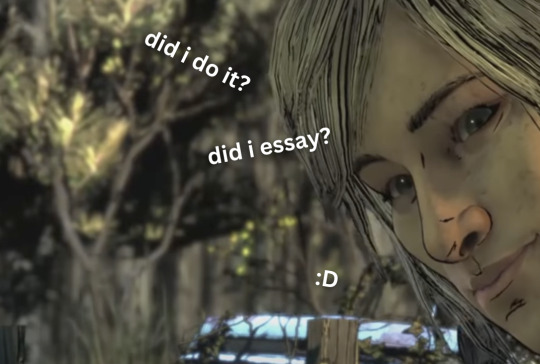
[Conclusion]
There’s nothing else this essay really has to say at its core. BPD is a very, very confusing disorder. Both internally, and externally. Stigma doesn’t help. It is, after all, a huge reason why I wrote this.
Because the stigma is quite honestly the worst thing about BPD. In many resources—whether they’re linked below, or you find them on your own—, you’ll find that a BPD diagnosis often comes with others right along with it. Addictions, eating disorders, depression…
To those who don’t know better (or maybe they do), that’s just…natural. It’s how it is.
But I remember going to my family, telling them that there is something wrong, only…to be assured otherwise. Not for my sake, but for theirs. Because BPD isn’t greatly understood, and when it is, realizing that none of them got to save me from my mother in time has its way in denial. What my mother did wasn’t right, however, I could’ve ended up like her.
Just not through those initial traumas.
Rather, I could’ve, had I made the same mistakes she did with the silent traumas thereafter—decades, now, where the people around me refuse to acknowledge my words, and listen to me, because I know the look in the eye, and I sometimes find it in the mirror. Those initial traumas may have been the first lashing, but it’s the time after which seals BPD within a person. Because the condition goes unchecked. It ferments. People tell you one thing, but you feel another, and as a child, you decide to trust their word, not your own body. Which breaks you. Gets to a point where there’s no real return, because people like me weren’t allowed to learn otherwise.
Understanding what happened to me was a very lonely experience, despite the sheer amount of people I had around me.
…and it hurts, somewhere deep in the recesses of my alexithymia, that my abuse never came from people who hated me. My mother didn’t, not in those initial years. None of my family did, in the decades into adulthood. But still, they hurt. The abuse came from the people I least want to admit, in ways that media would deem too boring for our idled attention spans.
I proclaimed that BPD is when a mechanism deploys, and the cost means a sacrifice of one integral function. It is still true—the mechanism, alongside the personality, and that specific initial trauma will influence how that BPD is expressed.
Yet, Borderline Personality Disorder happens when a mechanism deploys at a great cost, and that sacrifice is never restored. It is the neglect of the individual’s emotional turmoil after catastrophe that does it, where the same mechanism festers until it is there to stay as an ugly, depraved scar.
It is the disorder where a person was never allowed to heal, despite the mind and body screaming that they need to.
So when I hear BPD and the diagnoses alongside, I hear yet another time where someone likely knew there was something wrong, but they chose to find stability by other means, because it wasn’t found in the people around. Addictions bring those dopamine hits that BPD elevates. Eating disorders, where maybe…they can find something about themselves to control. Because there is none day to day, nor in relationships. And depression? Honestly, it speaks for itself; if a person manages to find themselves with a tumultuous anchor, or no anchor at all, it’s easy to slip into.
Or, if the diagnoses are born conditions, like ADHD or autism, or others, like schizophrenia, those speak to a concern where those conditions were left unchecked, and they festered as BPD, they were what predisposed it…
Yet, when I hear a story like Violet’s, it is a true reassurance.
Sure she’s not diagnosed. But still. The game doesn’t hide anything. It doesn’t “assure” the player that Violet isn’t this type of person, that she isn’t literally sick in the head.
TFS shows her issues quite plainly. And it’s because it does, and refuses to lie to make anyone feel better, does the game promise something that is so, so desperately yearned for in those with borderline.
It’s acknowledgement.
To tell someone that, yes, you’re not confused that you feel confused amid a chaos. You are. But there are ways to work with it, and around it. You can, actually, have strong relationships with people, and in those like Clementine, even if/when you fail, they will stay, because they understand.
To tell someone all of that is a first step towards understanding BPD, a disorder so shrouded because of stigma, and little else.
And so you have a character who still has her struggles with it, but she has a support system, and she’s taught herself enough to manage—did it well, considering the circumstances. She was left to her own devices. Sure, she had her grandparents to escape from home, but…, well. Yeah. After her grandma, Violet was then sent straight to the boarding school. The apocalypse struck. The adults left. And though her community still cherishes her, Violet…was designated as their wallflower.
So it’s funny, to have found this character this way, because Louis was right.
Violet does grow on you. If you let her, anyway. She can be suffocating.
Anyway. Hope you enjoyed.
Volt out.
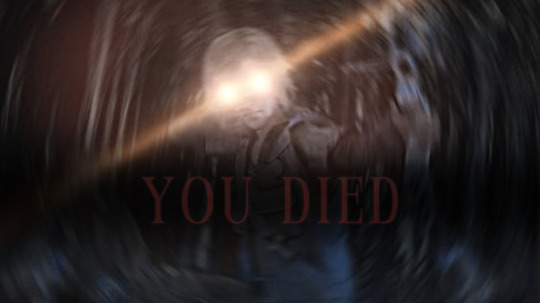
Volt's Library (my writing)
Clem Comic Essay #1 (canon stuff)
Clem Comic Essay #2 (language)
Links: to start your own research
BPD (General) | 1 ; 2 ; 3 (4 types); 4 (quiet BPD)
BPD (Stigma) | 1 ; 2 ; 3 ; 4 ; 5 (r/BPD)
BPD (Anchors/FP) | 1 ; 2 ; 3 ; 4 (r/BPD)
BPD vs Bipolar | 1 ; 2 ; 3 (comorbid BPD & Bipolar)
BPD (Identity Disturbance) | 1 ; 2 ; 3 ; 4 (r/BPD)
BPD (in Relationships) | 1 ; 2 ; 3
#volt's library#twdg essay#fandom essay#essay#long essay#TW: this is intended to explore BPD; so with that comes the sensitive topics as mentioned in the introduction#twdg#twdg violet#twdg clementine#violentine#twdg louis#louis & violet 🥺🥺🥺#twdg minnie#twdg minerva#twdg aj#twdg brody#twdg 4#the walking dead game#bpd#borderline personality disorder#the amount of times i looked something up and saw myself staring back at me is…too many times#like okAY GOOGLE i GET IT i have bpd#i know#LET ME WRITE ABOUT TWDG IN PEACE#thank you#and also thank the wiki transcripts my gOD#and and gotta love reminding myself that violet's dad was canonically an alcoholic#which is concerning for aydf since…well…gotta love alcoholic clementine#also also i do intend to edit/polish this later but what i wanted to say is here anyway so#im gonna nap now
25 notes
·
View notes
Text
Kazuki Sora taidan diary 〜 2024.2.11
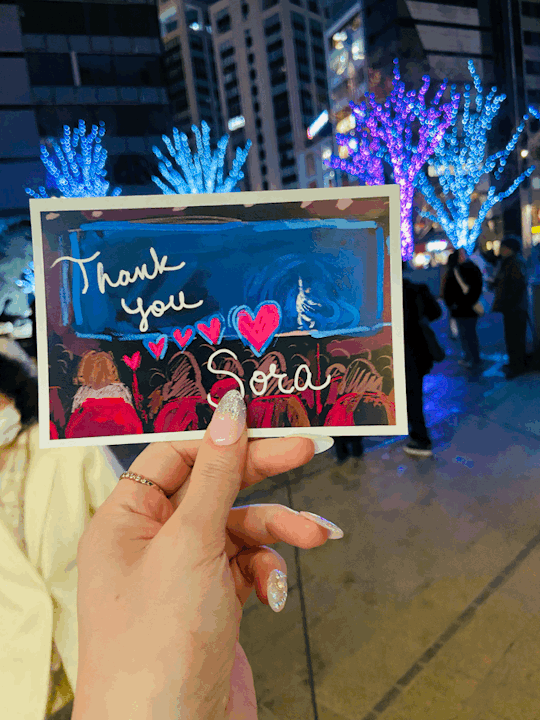
(also kind of a Boiled Doyle on the Toil Trail / Frozen Holiday write up)
I've now woken up eight times in a world where Kazuka Sora is an OG (changing that number daily, as I've been trying to write this for six days), and the sense of having somehow slipped into a severely incorrect timeline is getting progressively stronger. Coupled bizarrely with that is deep, deep gratitude that, despite everything that's happened in the last four years, and especially in the last five months, she got a gut-wrenchingly, absolutely devastatingly beautiful taidan. I can't say perfect, because perfect would have been after a well deserved top star run. But barring that, I never dreamed it would get this close.
Long post incoming.
I have to set the stage...
Once upon a time in 2013, Asaka Manato, then nibante in Ouki Kaname's Soragumi, got her turn starring in Brilliant Dreams +NEXT, a multi-part Sky Stage series where you got to like, do some stuff of your choice with other people in your troupe. She decided to recreate some of her favorite revue choreography, and a friend alerted me that one episode was dedicated to the infamous Rosso scene from Takarazuka's Dream Kingdom (which, as you can see in the linked post, completely short circuited noob me from a decade ago). Maasama was still a good 2+ years from winning me over at the time, and I think I reluctantly watched it with some level of offense that she touched a Komu thing. As I'm sitting in front of my computer rolling my eyes, out comes this tiny thing in capri pants, mismatched socks, suspenders, and thick glasses: ken-4 Kazuki Sora, here to report on the situation in the rehearsal room.
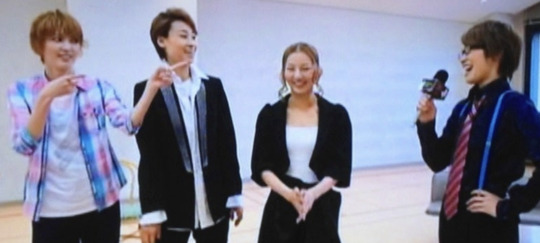
She spent her airtime cracking jokes, tripping on her tongue, riding on Susshi's shoulders, and generally acting like Soragumi's annoying kid brother. I thought she was funny.
Another friend told me she thought she was tracked. I absolutely did not believe her.
Then, against a fair amount of adversity, she got the 100th anniversary Rose of Versailles shinko lead, and my eyes widened a bit. The next time I found myself in Japan, I was gifted a 9th row seat to what coincidentally happened to be her first ginkyou crossing in PHOENIX Takarazuka! I'd been spending the show curiously scanning the stage for her, and when I witnessed the gap between reporter and performer, my jaw hit the floor.
Afterwards, my kangeki companion asked if I was interested in anyone in the troupe. I said Kazuki Sora. She recoiled and said "but she's so short."
***
Something that I noticed during this taidan trip is that covid-era fans met a wildly different Sora than I know. Growing up in 2010s Soragumi was uniquely rough. I'm not even talking about ::hand waves:: the present circumstances and what may or may not have lead up to them; I mean they persisted with a level of star saturation through the dawn of the pandemic that had kinda crazy consequences for the otokoyaku track. Not only was the track itself overcrowded, but the troupe also held onto a number of non-tracked upperclassmen to whom they seemed unwaveringly committed to casting in juicy roles. I remember when things seemed so untenable that Soragumi fans were universally on pins and needles waiting for what felt like an inevitable big transfer out, and I remember freezing in shock on the side of the road when instead they transferred Serika Toa in.
Here's some analysis for perspective:
Kiki is the third oldest top of all time, and spent more time as nibante alone than Tamaki Ryou took to get from debut to top.
Lord knows how long Soragumi will be in this state of flux, but if they come out of it and Kiki gets a normal number of shows, AND Sakuragi Minato is next, Zun could immediately overtake Kiki for third place
Speaking of Zun, her first two-city lead was in 2020. Looking at her top star douki, Rei Makoto's and Yuzuka Rei's were in 2017, and Tsukishiro Kanato's was in 2018.
Rukaze Hikaru's first bow lead was in 2019, two years later than her other tracked douki, Akatsuki Chisei (four if you count A-EN).
Slightly more invisible but just as devastating, the lessened exposure on stage between leads has likely resulted in lower fan club numbers and less overall popularity.
...and back to Sora. Hundreds of us filled Hibiya Park this past weekend, but Sora spent her early Takarazuka career so buried that, despite being a triple threat on stage and an utter delight off, her fan base was small enough that at ken-7 they let me, not yet even a club member, accompany my friend to demachi where I became the third attendee. For years, Sora was, frustratingly, an in-person only watch. I'd go to Japan, memorize her positions, miss the rest of the show for following her with my opera glasses, and pop in the DVD at home only to find her always just off screen. A Motion was one of the most fun times I've had in a Takarazuka theater, and on the DVD during my favorite Sora SOLO, the camera is on Sorahane Riku wordlessly dancing.
I was floored when she got Anita. I was livid that she could give THAT PERFORMANCE and immediately afterwards be cast as an ensemble soldier in Red River (although she was so good in Citrus Breeze that after 5 years of deluding myself that I "couldn't betray my beloved Yukigumi like that" ((ironic, right?)) I finally caved and joined club). I stress dreamed multiple times about the impending bow announcement before she got Hustle Mates. I cried when she finally came down the stairs between two musumeyaku in Ocean's Eleven at ken-10, in which she played Linus, a role that felt like a big break even though it had previously always gone to ken-6s. FINALLY, the massive Ocean's taidan relieved a little pressure, and I felt a tangible thrill when suddenly she was all over the Aqua Vitae shonichi digest, something that had never happened before.
That's where we left off in February 2020, when the Diamond Princess docked in Yokohama, and my therapist didn't know what I was talking about when I said I was giving myself a stomachache watching live case numbers ahead of my scheduled trip, and I canceled my flight, and I put my freshly printed pack of homemade Suleiman postcards under my bed, and I didn't see her for 4 years 4 months and 3 days.
***
It's hard to talk about Sora's taidan announcement and not come off as biased and overly dramatic, given that she's my girl. But in 11 years of countless taidan announcements, I've never come close to being as blindsided by one as I was with hers. The vibe I've gotten is that fans, siennes, and patrons alike were all properly shocked.
I'd spent the better part of a decade internally screaming for Takarazuka to act like they recognize her undeniable talent. Frustratingly, it finally started happening during covid. While I was living under the impression that Hustle Mates was a genuine miracle, she got an unimaginable second lead... then, thanks to the breathing room in her new Yukigumi home, a third... and then a fourth. Having been burned for so long, I've always firmly been team I-don't-think-Sora-is-going-to-make-top, but despite that, I was actually starting to believe it could—dare I say would—happen. I wasn't even certain the people murmuring on twitter that she might leapfrog Aasa were completely delusional. I went into Hyperbolic Chart, my looooong awaited reunion, excited to assess Kasumi Sana as her potential future partner. I enthusiastically bought all her postcards for future writing, because the last time I'd seen her, she, at ken-10, didn't have postcards.
Two days after that I found myself again frozen in shock on the side of the road.
Two days after that.... yeah.
***
Somehow, despite 11 years of knowing how this works, of weathering various taidans with friends, of crying in bathrooms until they started cleaning the theater at taidans that weren't even technically mine, I was also completely blindsided by the taidan experience itself.
Part of it was definitely the time skip, from years of intimate Sora fandom to nothing to a couple of A-seki (she's the it girl now!) for a lead I wouldn't have chosen with a troupe I barely recognize anymore to bye, she's gone. Part of it was being thrown back into this after 4+ years of pandemic-dulled emotions, followed by the exhaustion of Takarazuka's crisis era. Part of it was lowered expectations from the largely uninspired and under funded lineup of forgettable shows churned out by tired directors of dubious morality. Part of it was the disaster-shortened Mura run, the self-preserving dissociation fueled by the pain and disbelief that there was a dinner show and I wasn't at it, followed by a month and a half stretch of work so busy it was still going while I sat at the ANA gate for my 1am flight.
But I got here and squeezed into one of those red seats and then all at once I was an unsealed vacuum, cracked wide open, and Doyle and Frozen Holiday rushed in and filled the airless void till it burst.
Boiled Doyle on the Toil Trail
I've been down on Yukigumi.
Yukigumi has been my home troupe for the vast majority of my fandom. I had the fancy Swarovski crystal Yukigumi bag charms, the whole Yukigumi getup from Sports Day '14, Yukigumi albums, Yukigumi chopsticks, etc etc etc. I literally didn't join Sora club for years because I couldn't imagine being pulled out of Yukigumi. But while I was locked out of the country, the march of time took my favorite top star and the vast majority of my emotional support upperclassmen. The pandemic spit Yukigumi out in a state that just made me reeeeeeeeally sad. So I stopped watching them. That's the exact moment they picked to put Sora there.
I hate to admit it, but I still haven't totally caught up on her Yukigumi time.
Which is probably the main reason this show caught me SO off guard... even having watched AND enjoyed the Mura livestream. Sora is best watched in person, after all.
Doyle—a silly take on Arthur Conan Doyle's life, and how he used a magic pen to write Sherlock Holmes by accident, thus setting into motion a runaway series of events—is not only a fun and joyful show, it's a masterpiece of casting. The top 4 were at their absolute peak, and it was a thrill to watch.
I've been watching Ayakaze Sakina since her shinjin kouen days, and my write-ups over the years probably betray my rollercoaster hot and cold journey through her career. I really liked Doyle as a lead for her though. She essentially plays a big idiot wifeguy with a dream, an imaginary best friend, and little conviction; she was very funny and charming. If you were one of the lucky few who managed to see On the 20th Century, think that guy but earnestly the main character vs. dude with main character syndrome. The older I get, the more I have a soft spot for shows where the top combi has "ecstatically celebrating at least their tenth wedding anniversary" energy, and this was one of those.
...Thanks in large part to Yumeshiro Aya, who is absolutely everything. She may be boosted by consistently reminding me of Shirahane Yuri since her partial lead in the 103s Bunkasai, but she also has a very particular type of girlboss energy that I don't feel like I've seen in quite a while. It isn't wearing the proverbial pants energy (a la early TamaChapi), but it is overwhelming I got this energy. I find her to be the absolute embodiment of a top musumeyaku, in that she understands the assignment (making the top star better), while perching on the edge of the backseat just enough that she doesn't overpower Saki, but she's still a knockout in her own right. She probably exudes an extra dose of this energy as Louisa Doyle, who plays a very similar role in her husband's life and writing career. I could not be more thrilled that Aya isn't retiring yet.
Asami Jun plays the aforementioned imaginary friend/magic pen-generated apparition, who happens to be Sherlock Holmes. Some people I've talked to seem a little disappointed in her stage time, but I really felt like this was also peak Aasa. She seems to have broken through a layer of ceiling and gotten really comfortable leaning into her c***y unique energy, which, though I can picture it being polarizing, really does it for me. I sure as hell have never seen an interpretation of Sherlock Holmes REMOTELY like Aasa's, but I was enjoying the Aasa of it all so much that I really didn't care.
When I saw that Sora was playing the editor of Strand Magazine, I was somewhat disappointedly imagining a role like Lestrade (not to invoke another Sherlock), the sort of there-but-not character that has dominated her Takarazuka career since she started getting named roles. My first surprise was how good of a role this was in general, and then how well suited it was to her. She gets to be aloof and handsome, but also incredibly upbeat and funny at times. Her little coworkers at her utterly failing magazine are obsessed with her (which is the mood of the century), and there is a cute little meta moment where Doyle threatens to stop writing Sherlock and Sora tries to quit her job, only to be restrained physically by said coworkers (which is the mood of the moment). Everything from the set of her off-gray permed wig to her 4 or so different plaid suits to her opening solo number was absolutely perfect (not as perfect as it was gonna be later!!!!!).
FROZEN HOLIDAY
It's weird watching a Christmas show in February
I rapidly stopped caring
Speaking of rollercoasters of hot and cold, Noguchi used to be my most hated revue director, hands down. Circa 2017-18, after being deeply personally burned by Super Voyager (and deeply personally confused by Beautiful Garden), the tension I felt while awaiting show announcements hoping I wouldn't have to watch another Noguchi was intense. Noguchi revues being something people covet nowadays still feels unfamiliar, but I count myself among people.
He turned it around for me with the Takarazuka equivalent of winning the grocery store ingredients episode of Project Runway: Delicieux, a covid-budget masterpiece of public domain music and foam macarons (incidentally, also a goodbye to Sora of sorts, as it was her last Soragumi revue). I officially owe him my life after what he did for her in Frozen Holiday.
Firstly, going into my 11th year of watching live Yukigumi, I've never seen Saki shine brighter. While ostensibly a Christmas spectacular, Frozen Holiday was also meant to celebrate Yukigumi's 100th anniversary. Despite the aforementioned rollercoaster, I'm so glad that the top star for the anniversary was someone who has not spent a day outside of Yukigumi in her sienne life, who I've been watching since before my first trip to Japan. And I think the joy of it really showed on her. Aya was an angel, so visually perfect in her snow queen dress that I believed she was destined to be top musumeyaku of Yukigumi from birth. Aasa continued to out-Aasa herself; the wave of feral energy she set off during the first livestream was well earned.
But... remember the disembodied arm just off the TV screen? The utter SHOCK I experienced when they treated her like a friggin' nibante...
Nanami Hiroki, who pulled top star numbers and probably had double our last day crowd at her average Hoshigumi ochakai, and Miya Rurika, who needed a simulcast for her last ochakai, didn't even get the final revue treatment that Sora did.
The disbelief that they did so good by her, the disbelief that I missed the transition, the disbelief that she was really leaving, shattered me.
In addition to general prominence throughout the revue, she gets a whole white-clad taidan number, complete with lyrics designed to blind her fans with saltwater, and one of the best bits of dancing I've seen out of her. After a seemingly impossible quick change, she rejoins the troupe for a very chuuzume-esque anniversary number (assuming the Christmas kyakusekiori is the real chuuzume), and that might actually be my favorite bit of dancing in the whole show. She co-leads the Noguchi-signature boyband number with Aasa, which I forgive because it's them and it's also T.M. REVOLUTION. She even gets a spotlight moment alone with Saki during the kuroenbi. And through all of it, she was so, so good. Good does not even begin to describe Kazuki Sora.
I felt like I cried for 48 hours straight.
***
I didn't manage to get myself actually into the theater for senshuuraku, but I did end up with two Hibiya cinema tickets. When I tried to pass one off onto one of the fellow jilted Sora Club members trying her luck outside of Chanter, I got pounced on by an old lady while those in their white wear were moaning about the cinema not being good enough. I was too tired and nervous to tell her I'd prefer to sit next to someone in club, so she got it. She and I ended up crying the hardest of everyone in the cinema by far. Thanks, old lady <3.
***
One thing that struck me was how desperately, frightfully grateful I was that Sora retired from Yukigumi. Sure, if she hadn't, her taidan would have probably just been canceled... but I don't even mean that. The anniversary aspect of Frozen Holiday was beautiful, and filled me with a joy and nostalgia I wasn't prepared for. It was my first kyakusekiori since 2019, and after Sora ran by me, I was blessed to find myself next to Kujou Asu, someone I adore enough to be in her club in an alternate universe. It was my first iride since 2019, and I had the privilege of seeing off one of my favorite musumeyaku, Sara Anna, as well. The way the troupe members talked about Sora, and what she gave them, and how thrilled they were that she joined them, made my heart swell. As genuinely mad as I was when they broke up KikiSora, I could see that Yukigumi gave her the space to blossom.
The farewell dinner was even entirely gluten free by complete accident, down to the fancy manju omiyage with mountain yam flour dough.
***
Five onsen dips, a massive weeb shopping spree a lifetime in the making, and one extremely bizarre Komu show later, I'm on the plane home, finally not crying on command.
But not having a runaway fave for the first time in ten years feels really desolate. I miss her so much.
50 notes
·
View notes
Text
I feel a bit annoyed by people saying Firefly is the star rail version of Kallen.
As a fan of both characters I feel they got next to nothing in common whatsoever. They dont look similar, they arnt similar people, they dont have similar backgrounds or motives... there is just nothing really.
It feels like reducing them to Stelle/Caelus girlfriend (this one is supported by the story but I feel like much of what makes Firefly and this ship interesting gets overlooked, admittedly some of it assumes the theory about Firefly being SAM is true and some lore knowledge about SAM but even without taking that into account Firefly is a great character in her own right) and Otto´s girlfriend (which, as a huge Otto fan, I will say, of course has its own issues and I do not like the romantic interpretation with them, the previous era versions of them are different people and dont count for this imo and there is no evidence at all Kallen of the current era was into Otto and also Kolosten heavily suggests it wasnt even a romance thing for Otto either)
I highly recommend people read the prequel comic focused on Kallen, its when Kallen is younger then when we see her in flashbacks, set before meeting Sakura (i highly recommend also checking out that whole story at some point even if it can be a bit awkwardly time gated in game and slightly confusing) in HI3 so her personality/demeanor is a bit different from how she was by then (she is a lot more naive for one) but I think its still a good introduction to see why Kallen is a good character and a good showcase of how she isnt like Firefly at all and doesnt require sitting trough all of Kolosten and several side stuff in game to get to, so its a convenient starting place to see if you want to see more about Kallen. Which I hope anyone reading this ends up wanting to but even if not thats fine and is why I recommend starting here since its an easy read with very nice art and a fairly self contained story. Also if you dont play HI3 and am just curious on Kallen because of what other people are saying.
Elan Palatinus: https://manga.honkaiimpact3.com/book/
Some spoilers for Penacony mentioned below here....
Firefly I dont wanna go too deep into character analysis here cause some of it relies heavily on an unproven theory, ill probably write about her more later though. But either way I feel like she is a very well written character, her desire to indulge in some escapism to get a break from her harsh reality with her terminal illness, her determination to find the watchmaker´s legacy despite the risk, her clearly having gotten a lot of experience dealing with dangerous situations despite seemingly wanting to just live a normal happy life, she hasnt been in the game very long (yet, the boss that "killed" her whole gimmick is that you can free the souls it claims so im not so sure she is actually gone, also you can see a Firefly leave her body before she dissolves shortly before Sam shows up...) but she is already very strongly characterized even with her limited screentime. If the theory that she is Sam is also true then it would add an extra layer to her closeness with Stelle in that some lore about Sam suggests Sam was artifically created for the purpose of fighting against the swarm, so she likely would relate to Stelle on account of the whole... being made to fullfill a purpose thing. As a stellaron hunter in this case she would also know about that quite likely so I like the theory.
Idunno I just feel frustrated how characters often feel like they get boiled down to just their archetype or role (and sometimes not even any of those but just completely unrecognizable) when they are actually very interesting and well written characters.
I want people to appreciate the writing that went into these amazing characters, not just these two but also many other examples but I wont ramble on here.
So I strongly recommend people read more about them if at all curious, altough be careful since there are tons of leaks and spoilers in general going around regarding anything Penacony related, so with Firefly it might be best to wait a bit if spoilers are a concern.
43 notes
·
View notes
Note
girl what do you feel about kris' and noelle's relationship in snowgrave i want to know
OK OK. first of all thank you for specifying "in snowgrave" because if you just said their relationship in general i would literally never stop talking.
second tho, im really bad at putting how i feel about character dynamics into words because often there's just soooooo much to be said and different ways of looking at it and i get overwhelmed if i try to make some all-encompassing analysis. so let it be known that whatever i say here is not the full picture and there's so much more i could say.
putting this under the cut because i already know im gonna talk for way too long:
that being said oughghghhgh. where to fucking begin. i'd say the most fascinating (and disturbing) thing about their relationship in snowgrave is the weird romantic undertones. the fact that you have to pressure noelle into the idea of riding the ferris wheel with KRIS instead of with susie, her actual crush.
one of the most overt symbols of this weirdness is definitely the thorn ring. i know it isnt the only ring you give to noelle to equip, but this is the one that's mandatory for the snowgrave route. in order to do the route, you have to make KRIS give NOELLE a RING. a ring that literally HURTS HER TO WEAR. if that isnt a metaphor for a forced relationship i dont know what is


however perhaps the most damning and obvious one is of course this option:

i would say something about this myself but @/sorrybutiforgothowtomakecontent's tags on another one of my posts really summed it up:
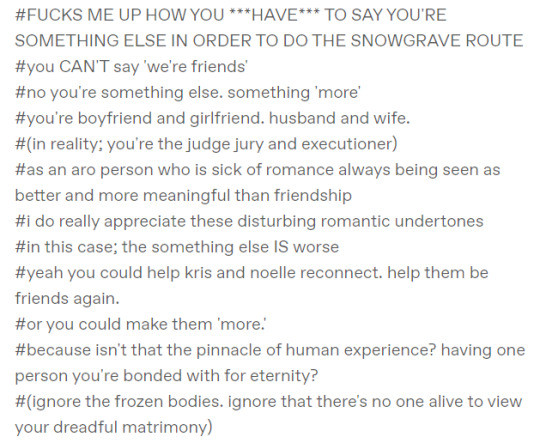
im also aromantic so this really resonated with me. but yeah just going back to the first point they make. you literally HAVE to say "we're something else" in order to do the snowgrave route, which seems to make it pretty clear that this kinda subtext was intended. snowgrave can only exist with kris and noelle being "something else" because that's literally what snowgrave IS.
my favorite way to view snowgrave is through the lens of an arranged/forced marriage. again, the ring. it just feels so gross, especially because it's not just a regular marriage but an abusive marriage. snowgrave is abuser simulator (2021). im sure i dont need to explain that part
but the thing is, SNOWGRAVE IS NOT JUST ABOUT NOELLE and that's what makes it SO BAD. not only is noelle being forced to go through all of this, but KRIS is being forced to be the one who does it to her! kris clearly is EXTREMELY upset about snowgrave judging from the constant opportunities to choose more "normal" dialogue and abort the route, and from afterwards when they meet back up with ralsei and susie:
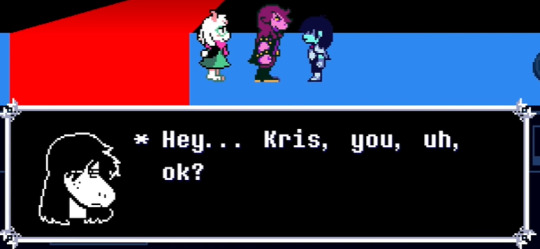

kris, under no circumstances, wants to do ANY of this. but they literally do not have a choice. snowgrave isnt kris manipulating noelle, it is US forcing kris into manipulating noelle. no one is winning here. they're both traumatized, and kris physically cannot even talk to their friends about it or show the true extent of their hurt. it SUCKSSSSS
and when you consider the idea that kris and noelle's friendship may have become strained specifically due to dess' disappearance, and kris possibly having something to do with that with the bunker and whatnot..... well now you're just forcing kris to hurt their friend AGAIN, when in the normal route this could've been their chance to finally reconnect. ahghrhgrhghh
going back to the marriage stuff, it's just so uncomfortable to see these two forced together like this. noelle is in love with susie. we dont know kris well enough to know if they have a crush on anyone (or if they get those kinds of feelings at all), but that doesn't matter. the fact is these two are likely not romantically interested in each other at all, and they are being forced together BY THE PLAYER. and it's horrific. (and even if one or both of them felt that way, this is still entirely wrong. they do not get a choice here)
@/hellspawnmotel's tags on this comic of hers will always haunt me, bcuz like. yeah. this is it:

there's also the fact that kris is naturally kind of a goofball; they're a prankster, especially it seems when it comes to noelle, as can be seen with the stepping off the button thing or the many, many examples from their shared childhood brought up by noelle.
but in the snowgrave route, kris drops this entirely. all of the alternate dialogue options to abort the route, which are very likely FROM kris, are very genuine and apologetic. kris is scared they're going to lose their friendship with noelle completely because of what you're making them do, and it's like they panic and all of their usual goofiness and sass is just dropped for genuine emotion. it's really sad to see honestly, esp in a full snowgrave route where you know that their efforts will be in vain.
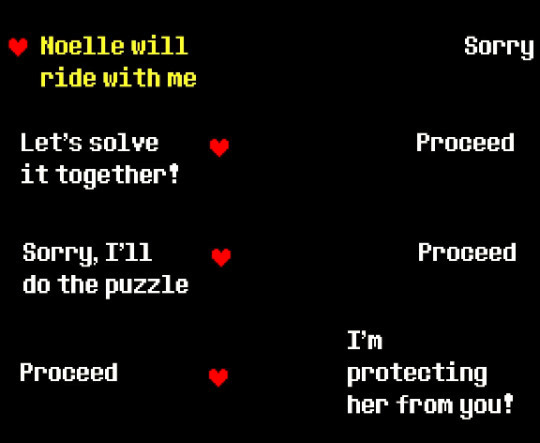
OH OH ALSO. can't believe i haven't mentioned this yet. the fact that NOELLE KNOWS SOMETHING IS GOING ON WITH KRIS. THAT'S one of the things that really makes me insane.






noelle goes through ALL THAT, seemingly AT THE HANDS OF HER FRIEND....... and yet. she knows that something is wrong. she KNOWS kris, and she knows that they don't act like this. you'd think she would instantly cast kris off, it would be the right thing to do, but she doesn't. because she knows that something is off.
i cannot stress enough the fact that noelle is the ONLY one who seems to have noticed just how strange kris has been acting. sure other characters comment on kris seeming off or doing something they usually wouldn't do, but it is NOELLE and NOELLE ALONE who takes such notice of it and decides to actually DO SOMETHING ABOUT IT.
"i have to figure it out" is a mission statement, it implies that noelle (at least in the snowgrave route), is going to actively try to figure out what's going on with kris, WHICH IS CRAZYY and i feel like not enough people are talking about. not even kris's own mother has fully realized something's wrong. like she says, noelle seems to be the only one who's noticed just how off kris has been acting, and the only one who might try to understand and help them. genuinely makes me insane thinking of where that might go in this route oaugurhghh
im gonna stop here because im exhausting myself but. in conclusion I LOVE CHILDHOOD FRIENDS GONE WRONG!!!!!!!!! FAVORITE TROPE EVER!!!!!!!!!!!! anyways read this comic (all 3 parts) and you'll get it
oh also "kris, why are you wearing my watch?" still makes me go fucking insane
#i genuinely could talk about these two forever. favorite dynamic in deltarune hands down#they're my favorite characters individually so the way that snowgrave intertwines their stories#noelle's strength and kris's possession#into this horrible thing of being forced to force someone else to kill and make them think THAT'S what true strength is. augurgrghhrgh#they genuinely make me insane. i need to see more of them NOWWWWWWWWWWWWWWWW#not art#asks
84 notes
·
View notes
Text
Talking Buddie Language: Ep 6.01
Episode 6.01 gave us so many wonderful Buck and Eddie moments. There is so much to analyze that my mind was working overtime trying to distinguish everything and what that all means for them.
Firefighter's Buckley and Diaz & their partnership:
We finally get Eddie back as a full fledged firefighter but only get a tiny moment of him and Buck acting like partners. Buck is paired off with Hen, while Eddie is paired off with Chim to go save the two captains. Now I think it was brilliant to show Eddie being the one to do the big save since this is the first time we see him back as a firefighter. They wanted to show us that he is back and better than ever.
I did appreciate Bobby sending Buck up to help Eddie. He knows they work best when they're working together. That comes from years of seamless partnership and just knowing the other like they were an extension of their self. Buck runs up because he will always be there to have Eddie's back. His cute worried face let us know that he was of course worried about Eddie's wellbeing but was going to do everything in his power to make sure Eddie and the other captain got out of the blimp safely. His soft, “Eddie Hey” alerting Eddie that he’s there and he’s got his back was so perfectly them. They don’t need to talk to do their jobs. They’re in each other’s head. But it was great to see that little soft interaction between them. It's interesting to me that we didn't get any other moment of them two afterwards to discuss any emotions they were feeling during those tense few minutes.
The Interim Captain Debacle:
I loved this scene very much. Eddie is being sassy whilst speaking to Lucy, which indicates that there's still a lack of closeness between the two. His voice did not sound genuine enough when he asked her how she broke her foot off duty.
The parallel between this scene and the one from 3.01 is amazing in how they're different. In 3.01, Bobby is telling the team that Buck isn't getting out of bed and that he's not taking this whole unemployed thing well. Eddie's initial reaction is, "He's just sulking Cap, he'll get over it...Look I know it sucks, but that's life right? Whenever stuff didn't work out for me, my dad always told me to brush it off, keep moving forward." They then discuss how Buck has them, the team, because they're his family and that's the thing that makes Eddie realize he has to check in on his partner. Because until Bobby said that, Eddie wasn't taking Buck's duress seriously due to the way he was raised. He didn't realize it himself that he may need to check in with his friend and see if he needs some kind of support.

The difference with this scene in 6.01 is that Eddie notices something is wrong with Buck almost immediately. He immediately looks up from what he's doing because the tone of Buck's voice is enough to make him realize that this may be a deeper issue for Buck. You can tell by the raise of his brow and the way he doesn't take his eyes off Buck. I did a mini analysis of this scene already, so I will just link it here so I am not repeating myself. My entire point is that Eddie has let go of the toxic bullshit his father instilled in him and he's allowed himself to be more in tune with Buck. He doesn't need Bobby or anyone else to tell him something is bothering Buck, he knows it before anyone else. That is massive development for not only Eddie, but his relationship with Buck.

(Gif by @whattarush)
The Buckley-Diaz domestic Family Dinner:
There’s so much to unpack here. First and foremost this is the first Buckley-Diaz family scene we have gotten in such a long time. The last time we saw these three together was in 5.14 and it was during the equine therapy scene. And the last time we saw them having a family dinner, it wasn't just them three because Taylor was also present.
Before anything, I just want to focus on Eddie’s reaction to Buck dismissing Lucy by saying, “She’s whatever you know she’s great. But she’s out.” The man looked up from what he was doing to give Buck the fondest heart eyes ever. He kind of looked at Buck almost as if to say, “Stop talking about other women when I’m sitting in front of you with our child.” It was the second heart eyes we got from him this episode and it was so beautiful to see how Eddie doesn’t even try to hide them at all.
I will say however, that way he raises his right brow and kinda sighs to himself really indicates minor jealousy/hurt over simply hearing her name. It’s almost as if he’s thinking, “Not this again”, which is common when someone is pining for the other person. Which can be the case here. But it’s not something too important for him to dwell on it for long. He just can’t help his reaction to hearing about Buck speak about someone else, especially given he has had some sort of history with that person.
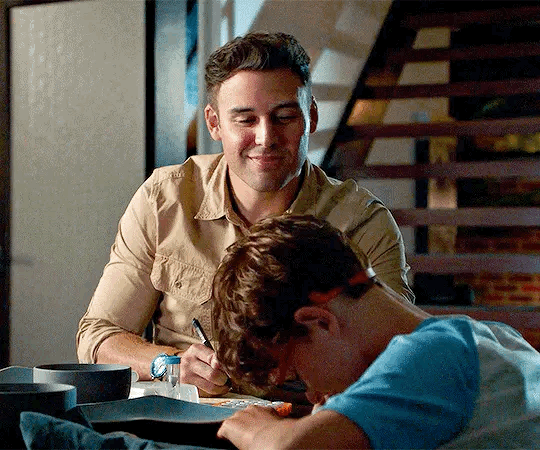
(Gif by @swiftiebuck)
Buck and Eddie, to me at least, were having two different conversations simultaneously while at Buck’s loft. I think it’s so important that Eddie is sat facing towards Buck during this entire exchange. He’s facing him head on and letting him know he can tell him anything he wants.
B: “So it doesn’t bother you that Bobby didn’t even consider either one of us for interim captain?”
E: “Not really. Just got back to the 118. But clearly it’s bothering you.”
This is very important because this is Eddie taking that leap and bringing up something that is bothering Buck more than he is letting on. It is his way of showing that he is in a better mental health space now and that he is so in tune to Buck’s own emotions. He is confident enough to broach this topic with Buck first and have a normal conversation on what is bothering him. He isn’t letting Buck just sulk until the gets over it. He is breaching the door and allowing Buck to confide in him, without judgement. Also it’s important to note his tone of voice because it’s soft and he doesn’t have all his usual sass underlying his words. He does tend to tease Buck often but right now he is letting Buck know is not one of those times. It is also interesting to note how this conversation, Eddie bringing up that something is bothering Buck is very much something that goes on between couples. It is how longterm partners/spouses approach their significant other to let them know, “Hey, I see you, I know you, you can trust me. I’m here whenever you are ready to unburden your problems.”
B: “When he has so many other excellent options right under his nose.”
E: “Like you.”
Now see Eddie isn’t asking this. Eddie is simply stating that he knows what is on Buck’s mind because he knows him. Knows that this is the root of his problem.
B: “It’s like he’s choosing not to see them & everything they have to offer.”
E: “Time.”
Eddie doesn't respond to Buck’s remark then. He busies himself with Christopher to gather his thoughts. Because Buck seems to not only be talking about Bobby choosing someone else to be interim captain. This is where I believe the two simultaneous conversations begin.
I find it very interesting that Eddie is the one who shifts the conversation into another direction. Sure they can still be talking about the interim captaincy. But he asks Buck plain and simple, “What are you offering?” The way he tilts his head to the left and looks up at him indicates that he genuinely wants to know the answer to that question. Now see, I don’t believe for one moment he wants to know the answer solely for why Buck thinks he should be interim captain. I think this is Eddie’s way of asking in general what Buck is offering to other’s around him, possibly even Eddie himself.

(Gif by @whattarush)
Buck chooses that moment to offer Eddie and Christopher lasagna, which happens to be Bobby’s famous lasagna. Again, the saying about the way to a man’s heart is through the stomach is very prevalent here and it parallels Eddie cooking dinner for Buck in 5.11.
Eddie’s body language throughout their entire exchange is very open. When he asks what Buck is offering, he spread his arms wide open in a welcoming stance. He’s welcoming whatever Buck’s response is going to be because he’s already welcomed Buck into his life fully. There’s nothing closed about him in thet moment. On the contrary, it’s almost as if Eddie is also giving himself up to Buck by the way he’s spread his arms and offered himself for the taking.
Eddie’s immediate response is to look proud and fond, and respond with, “It does look good.” That is basically Eddie’s way of saying, “I see you, I see what you bring to the table, and I love it. I want what you're offering.”
Buck emphasizing that it took him 3 tries to perfect what he offered Eddie and Christopher is very interesting because he has had 3 previous failed relationships. It took him 3 tries to perfect this dinner for his boys. He is offering not only his lasagna, but himself after these 3 failed relationships, in the hope that he is enough for them. You guys see how Buck and Eddie seem to be dancing around one another with their words?
The Buddie Couch Debacle:
The couch metaphor has me in the tightest chokehold. I remember I answered an ask last season about the symbolism of Taylor’s and Eddie’s couch and what that means to Buck. I unfortunately cannot locate the ask so just bare with me please.
B: “My last two couches came with girlfriends.”
E: “I think you mean your last two girlfriends came with couches.”
The way Eddie says that in a confident but sassy way makes me laugh. Because he’s very well aware of Buck’s previous girlfriends and the baggage (couch) they brought into Buck’s life. What’s interesting is Buck’s eye squint in response. Because he’s looking at Eddie as if to ask him, with their seamless nonverbal communication, what he’s getting at?
E: “Taylor moved out 4 months ago.”
He’s emphasizing that she’s been gone for months and Buck still hasn’t “moved on”. Moved on in the sense that he wasn’t out actively looking for another couch/girlfriend. These two words are being used in place of each other. They’re using couches as a metaphor for his previous girlfriends/relationships.
Eddie is suggesting that Buck could’ve found another girlfriend with her own couch if he had wanted to, but he hasn’t. His tone of voice is interesting to me because he’s not necessarily jealous but it does come off as somewhat passive.
B: “Maybe I don’t want to pick the wrong couch again.”
As Buck says these words, he holds intense eye contact with Eddie. It’s a heated look for sure because he’s trying to make Eddie understand that sure he couldn’t gotten another couch/girlfriend but he’s worried about finding another wrong person. He’s been burnt a few times and his last relationship was all kinds of wrong, which Eddie knows. So the fact that Buck is looking him in the eyes while saying that, slightly raising his brows to challenge Eddie to say something in return is very interesting. Again it’s like they’re definitely not talking about couches but instead talking about the fact that Eddie basically asked Buck why he hasn’t put himself out there again. Meanwhile Buck is informing Eddie that he’s not actively looking for anybody because he doesn’t want to jump into things and risk the next person being a wrong choice again. 
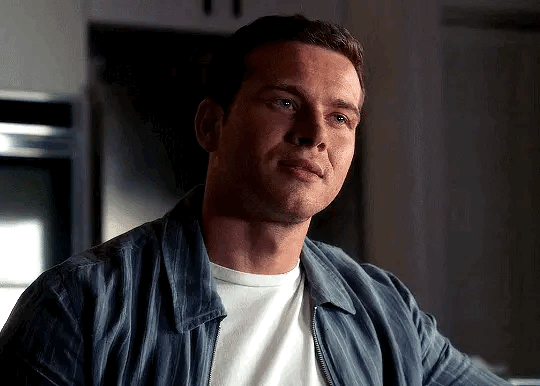
(Gif by @whosoldherout)
I also find Buck’s look to have underlying fond tones. Because even when he’s questioning Eddie, he can’t help the love and fondness that is directed towards him everytime he looks his way. You can see it in his eyes, they’re open and it’s his special look he has reserved for Eddie. But there’s a definite underlying heat to them. Something’s changed because the looks they shared back and forth felt charged with something. They definitely have a sorta flirting back and forth going on in that moment and it’s so similar to how they used to be before their respective girlfriends.
One thing I want to mention is I love how both Eddie and Christopher show their love through teasing. That is sort of their own special love language and I think it was so cute and important for it to be Christopher who started the entire couch conversation by simple telling Buck that he “Doesn’t even have a couch.”
Exasperated Fond Husband Mode Activated:
During the scene in the golf course, I just want to mention how married they are. Buck is acting like an overactive puppy but only so he can prove to Bobby that he is a great candidate for interim captain. Eddie catches on almost immediately to his behavior. The part where Buck is closing off the entire area with caution tape and Eddie glances over his shoulder to where Buck is being Buck, it’s typical exasperated husband energy. He rolls his eyes and looks away in a I can’t believe I love this idiot kinda way. You can tell there isn’t anything malicious behind this look. On the contrary, it’s Eddie’s patented fond, exasperated husband look that is only for Buck. We’ve seen many other instances where he looks at him like this. One prime example is when Buck was teaching Ravi how to break the door in 5.04 and Eddie looked back and rolled his eyes again. This look only comes out when Buck is trying to put on a façade and overcompensate at work. I believe it’s because Eddie knows how capable and what a good firefighter Buck is. So he doesn’t think Buck needs to put on an act and be someone he isn’t to do the job they do. Hence the exasperated fond eye roll.
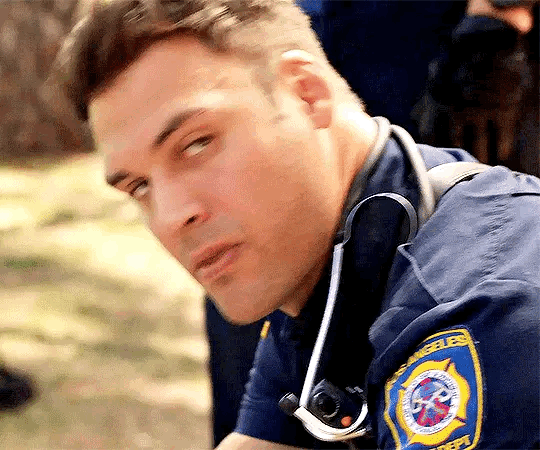
(Gif by @aa-lionheart)
Saws and Jaws Bring Out the Heart Eyes:
Eddie Diaz is completely smitten over on excitable Evan Buckley. Especially when it comes to Evan Buckley with his saw. You see Eddie standing behind Buck and I love how they immediately share a moment where they have a conversation with their eyes. They always seek each other on the job for any reassurance or just to check in with the one person they’re so close to.

(Gif by @jakejensen)
The heart eyes he can’t help but bring out when Buck is in his element just goes to show that Eddie likes when Buck is Buck. He loves his Buck and doesn’t think he should change himself because he’s perfect the way he is. It’s a vast difference to his exasperated look when Buck is trying to overcompensate and do more than he needs to and it shows. Eddie is at ease and when he’s at ease, his natural love and fondness for Buck just comes out. It’s like second nature for Eddie to look at Buck like this. His little smile and proud stance further proves that he likes when Buck is like this, in his element, doing what he’s best at.
Bobby and Buck + Couch Debacle Part 2:
Adding to the entire couch discussion, I think it was very important for Buck and Bobby to have the discussion they did at the station. It’s no surprise that Buck looks up to Bobby as a father figure and he was hurting inside over the fact that Bobby didn’t even think of him as a candidate for interim captain.
Buck asking Bobby if the reason for him not choosing him was “Because I don’t have a couch” was a great leeway into Bobby tackling what’s really bothering Buck. When Bobby asks Buck why he doesn’t have a couch, he opens up the floor for discussing what the real issue is that is bothering Buck.
Buck explains how he’s been having trouble picking one out because he’s afraid of making another mistake. Him confiding in Bobby that his previous relationship was a mistake is huge because again he views Bobby like a father figure. He feels comfortable enough to let him on his worries because he knows Bobby won’t diminish his feelings. On the contrary, he’ll help him out, which is exactly what happens here. He uses his own life experiences to try and connect with Buck so that it’s done on a more personal level.
BN: “In AA, there’s this idea that you take inventory of your life, admit your shortcomings, and hope that one day, you can look at the world straight in the eye and be alone at perfect peace and ease.”
B: “You uh, don’t think I’m at ease?”
BN: “I think the important thing is that you answer that question yourself. But when you are, you’ll know. And then you’ll be ready.”
Now here is another example of two conversations occurring simultaneously. They’re not really talking about couches and Bobby knows that to an extent. He knows what Buck suffers with the most and that is finding who he is and what his place is in the world. He’s looking for a partner that will stay and love him now he seeks. He’s been searching for that kinda love for a long time and Bobby knows that. Bobby in his own words is basically saying that he shouldn’t be afraid to make mistakes or find the wrong person. There’s nothing wrong with being single for a bit and figuring out who you are while single. He wants him to embrace this about himself so that eventually when the right person does come along he will be ready. 
That then leads to the final scene where we have Eddie and Christopher at home playing their game. The next clip is of Buck in his living room. He grabs the lone arm chair and moves it so that it’s in the middle of the living room, where the couch should be. This is him embracing his single hood for the time being and not being in any rush to go out and get a new couch (meet a new person). This is him being secure in himself and maybe taking this time to learn who he is without being in a relationship and who he is outside of his job. For now he’s happy with his choice but it leaves so many things open for interpretation. Because his conversation with Eddie is still a major factor in his decision to not get a couch. And a part of me thinks that we probably won’t even see Buck get another couch because the couch he’s been looking for, the right couch has been in front of him this entire time. And this perfect couch will be there waiting for Buck for whenever he’s finally ready to choose it.
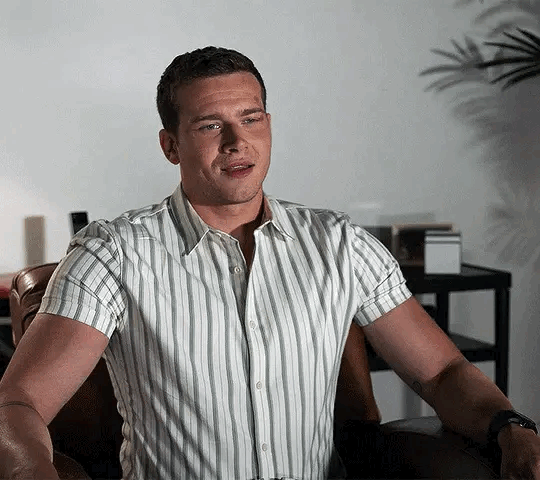
(Gif by @911verse)
#buddie#evan buckley#eddie díaz#christopher diaz#bobby nash#911 spoilers#911 meta#buddie meta#jujus having thoughts#I’m naming this#buddie language meta#tagging it that too
492 notes
·
View notes